Get Funding & Stay in Control

How Much Does It Cost to Go on Tour?
.webp)
Secure funding while keeping 100% ownership of your masters
Every artist dreams of hitting the road, meeting with fans in the flesh, and feeling that indescribable buzz. But, while exciting, this particular musical journey requires thorough preparation in order to turn into a money-making venture.
Touring is an important part of sustaining a music career – even more so in the digital age. Yet the cost of an artist's tour can vary dramatically, with expenses ranging from thousands to millions per show. There’s a multitude of things to consider, all of them demanding effort and funding : tour logistics, show fees, agent fees, luggage fees when flying, various legal fees, putting together a tour schedule, meals for everyone involved, fuel, accommodation, keeping track of ticket sales... And the list goes on.
Touring can be a fulfilling experience for musicians, but without a financially positive outcome, it can turn into a burden. So here’s all you need to know about how much it costs an artist to go on tour.
Finally on tour, but at what cost… literally?
First things first: Prepare a tour budget. It’s important to get at least a rough picture of what you’re getting yourself into. Sure, going on tour is a great way to share your music and grow your audience, but it can be costly – particularly for independent artists or up-and-coming musicians who don’t necessarily have a big team behind them.
It is crucial to do the math firsthand and factor in the multiple facets of touring. This initial budget projection must include:
- Transportation — includes rental costs, plane tickets, parking, gas, tolls, and transportation for all members involved.
- Travel — includes visa fees for international travel, baggage and equipment fees, costs of shipping or renting equipment.
- Accommodation — includes daily cost of hotels, Airbnb, or other lodging options.
- Staff Costs & Musician Fees — includes compensation for personnel and all musicians involved.
- Food & Provisions — includes daily cost involving food, beverages, and healthy sustenance.
- Fan Perks — includes fan perks such as merch of bundles you must invest in before they start generating revenue on tour.
- Incidentals & Contingencies — includes day-to-day expenses like toiletries, as well as an emergency fund in case of unexpected situations.
- Insurance — Coverage for all instruments and equipment is a must.
For many independent artists and musicians, this cost estimation and financial dilemmas might seem overwhelming at first. But always remind yourself that managing your finances on the road simply allows you to focus more on the art and delivering great shows. So let’s take it from the top:
1. The cost of transportation while on tour
In the fast-paced world of music tours, transportation expenses are hitting artists hard, leaving many in the red. Consider rental costs, plane tickets, parking, gas, tolls, and transportation for all members involved, as well as the crew traveling along.
A quick research will point to driving as the most economical option – at least for a domestic tour. But it’s up to you if this means renting a van, a tour bus (or more), a trailer, and so on.
2. The cost of travel while on tour
When planning a tour route, be mindful of potential hidden costs in air travel, such as seat and baggage charges before booking flight tickets. Make sure to research baggage and equipment fees, as well as the costs of shipping or renting equipment. For musicians, it's paramount to know the airline's weight and size limits for checked items.
A careful and methodical plan can make even international touring more efficient and affordable. Check visa requirements and fees, as well as phone usage details. It might be a good idea to consult embassies and consulates well in advance to understand visa fees and requirements. Don’t forget to review your phone provider's international call policies and data charges.
3. The cost of accommodation while on tour
When it comes to planning a music tour, the expenses associated with accommodation can arguably become the most significant. Factor into your budget the cost of hotels, Airbnb, or other lodging options (sleeping in a van or crashing on fans’ couches can only take you so far).
Do the math for the additional expense of having every person involved in the tour be comfortably set every night while on the road. If touring buses are your go-to, take into account that your fuel budget will need to be adjusted too.
4. Staff costs & musician fees while on tour
When calculating how much does it cost to go on tour, multiple factors need to be considered. From tour route to how big of a venue you have to how many lighting designers you plan on having. But one crucial element are all the people that make the entire endeavor possible.
Take into account compensation for crew and personnel, as well as for all the musicians – including travel and rehearsal time. From stage hand to your background vocals, they all have to be included in the tour budget.
5. The cost of food while on tour
Food expenses are inevitable but manageable with strategic planning. While affordable options such as shopping at grocery stores and buying food that does not require refrigeration are possible, it’s hard to completely avoid eating at restaurants when touring new locations.
While experiencing local cuisine is part of the journey, try to limit the frequency of dining out to keep costs down. Particularly avoid high-end dining establishments.
Draft an estimate of daily food costs and acknowledge the possibility of inflated prices in some areas, like airports or city centers. Keep in mind that purchasing drinks is a discretionary expense that can be minimized – particularly when taking into account all the crew members and staff involved.
6. The cost of fan perks while on tour
Yes, selling attractive merchandise is an effective way for musicians to make money on tour and leave fans a piece of yourself, all in one go. But physical products such as T-shirts, phone cases, posters, hats, and other branded items need to be designed, branded, copyrighted, and transported. All of which come with different price tags.
Merchandising is a tangible link for fans, just like VIP experiences or various passes. But before they start generating revenue on tour, these types of fan perks you must invest in to begin with.
7. Emergency fund while on tour
Don’t overlook the importance of setting aside an emergency fund when calculating how much it costs to go on tour. Unexpected situations or equipment failure can randomly occur during a tour. For instance, taxi rides might start piling up, you might need to rent another instrument, or you might have technical difficulties that need you to invest in a drive or device asap.
It’s wise to budget for these unexpected costs, as well as for everyday items that won’t lead to an emergency should they lack, such as toiletries or basic over-the-counter medication in case of sore throat or a sudden cold.
8. Insurance while on tour
Speaking of unexpected events, every artist should factor in adequate insurance when budgeting for the cost of going on tour. This guards against potential injuries and unexpected incidents involving audiences during live shows. These events are unpredictable – unforeseen set piece malfunctions to dramatic stage dives, mishaps can happen.
Insurance policies offer either per-show or annual coverage. Insurance isn't just precautionary; it's a wise investment in the safety and financial well-being of artists and their fans.
In an industry where, for many, breaking even means the hard work paid off, it’s hard to see making music as a viable way to live. Artists must combine the pragmatic side of touring with being creative and present enough to enjoy and remember the experience.
ABOUT THE AUTHOR

Music Business
Guides, tutorials, interviews, hacks, tips, & inspiration.
Never miss a post from Xposure Music
RECENT ARTICLES

Blxst: Rocketing Toward Musical Success
.jpg)
Here’s how to get verified as an artist on Spotify
.webp)
Basic Music Theory Principles Every Emerging Artist Should Know

Rob $tone: What a Difference a Decade Makes
Get on a 1-1 video call with music industry pros.

Pamela Charbit

Orlando Wharton

Donny "Dizzy Clean Face" Flores

R3HAB
Xposure blog topics.
- Skip to main content
- Skip to primary sidebar
- Skip to footer

Discovering live music, artists, concerts, & tours
World Concert Tour Pros and Cons: Is it Worth the Effort?
April 9, 2023
World concert tours are the ultimate goal for many musicians, as they offer the opportunity to perform in front of fans around the globe. They also connect them with diverse cultures and potentially make a significant profit. However, embarking on a world tour is not a decision to be taken lightly, as it requires extensive planning, financial investment, and a lot of time on the road away from loved ones.
In this article, we will explore the pros and cons of a world concert tour , highlighting the benefits and drawbacks that come with taking your music to a global audience. Whether you are an established artist or just starting, understanding the advantages and disadvantages of a world tour can help you make an informed decision about whether this kind of tour is right for you.
Pros: Increased Exposure and Fanbase
Stage performance in concert venues can bring numerous advantages for artists, including increased exposure and a wider fan base. Here are a few of the major benefits of starting a global tour:
Firstly, a world concert tour can help you reach new audiences and expand your fan base. When you perform in different countries and cities, you have the opportunity to connect with fans who may not have had the chance to see you live before. This exposure can lead to new fans, social media followers, and potential collaborations.
Secondly, a world tour can give you the chance to promote your music on a global scale. This can help to build your brand and create more opportunities for you to perform and sell your music in different markets. A successful world tour can also lead to media coverage, interviews, and features in local and international music publications.
Thirdly, this kind of tour can provide you with invaluable experience and skills. Touring globally requires flexibility, adaptability, and the ability to work with different people and cultures. These skills can translate into other areas of your music career, such as negotiating contracts, working with promoters, and building relationships with fans and collaborators.
Finally, the experience can be a fulfilling and enriching involvement, both personally and artistically. Traveling to new places and experiencing different cultures can inspire new creative ideas, and performing in front of diverse audiences can be a rewarding and exciting experience for any artist.
Cons: High Costs and Exhaustion
While a world concert tour can be a dream come true for many musicians, it is not without its challenges. One of the biggest drawbacks is the high cost associated with it. Here are a few of the main drawbacks:
Firstly, a world concert tour can be incredibly expensive. The cost of flights, accommodation, transportation, and crew can quickly add up, leaving many artists in debt. This is especially true for emerging artists who may not have the backing of a record label or a large fan base to support them financially.

Secondly, this tour can be physically and mentally exhausting. Touring for weeks or even months on end can take a toll on an artist’s health and well-being. Long hours of travel, late nights, and lack of sleep can lead to fatigue, stress, and burnout. This can affect the quality of performances, and in extreme cases, lead to canceled shows.
Thirdly, the personal life of an artist can suffer as a result of a global concert tour. Spending extended periods away from loved ones can be challenging, and constant travel can make it difficult to maintain relationships. This can lead to feelings of loneliness and isolation, which can further exacerbate the stress and exhaustion of touring.
Lastly, organizing an international tour can be a logistical headache. Coordinating shows in different time zones and managing crew, equipment, and transportation can be a challenge, especially for independent artists. This can lead to miscommunication, delays, and other logistical issues that can impact the quality of shows and the overall tour experience.
Pros: Cultural Immersion and Global Connectivity
Another significant advantage of embarking on a world concert tour is the cultural immersion and global connectivity that it provides. In terms of global connectivity and cultural immersion, these are some of the major advantages:
Firstly, performing in different countries and cities can expose artists to diverse cultures, traditions, and ways of life. This can inspire new creative ideas and perspectives, and lead to collaborations with local musicians and artists. The experience of traveling and performing in different parts of the world can also broaden an artist’s understanding of the world and promote cross-cultural understanding.
Secondly, a world tour can help artists to build global connections and expand their professional network. Meeting other musicians, industry professionals, and fans from around the world can open doors to new opportunities and collaborations. This can help to build an artist’s brand and increase their chances of success in the international music market.
Thirdly, a world concert tour can provide artists with unique performance opportunities that they may not have access to in their home country. This can include performing at iconic venues or festivals, or in front of audiences that have a particular interest in a specific genre or style of music. This can lead to high-profile gigs and opportunities to build a loyal fan base in different parts of the world.

Finally, the chance to give back to the world community can be one of the benefits of a world tour for performers. Many musicians use their tours to raise awareness and funds for social causes and to engage with local communities. This can lead to positive publicity and help artists to build a reputation as socially responsible and globally aware individuals.
Cons: Health Risks and Time Away from Home
World tours have their own set of cons that musicians and their teams have to deal with. Two of the most significant challenges faced by musicians during a world tour are health risks and time spent away from home.
The physical and emotional toll of a world tour can be significant, as it requires musicians to perform at their best night after night, often for several months at a stretch. The grueling schedule can lead to a host of health problems, including exhaustion, dehydration, and other illnesses. The mental health of musicians can also suffer, as the constant pressure to perform can be overwhelming. The inability to maintain a healthy routine while on tour can further exacerbate these issues.
Another major con of a world tour is the time spent away from home and loved ones. Musicians are often on the road for weeks, if not months, which can lead to feelings of isolation and loneliness. This can impact their mental health and their relationships with friends and family. Additionally, musicians often have to put their personal lives on hold while on tour, including their hobbies and other interests, which can be a source of frustration and stress.
Final Thoughts
As the music industry continues to evolve, it is likely that world concert tours will remain an essential part of the industry, providing musicians with the opportunity to connect with fans around the world and explore new musical traditions and styles. While the COVID-19 pandemic has had a significant impact on the live music industry, it is expected that the industry will continue to recover and adapt to new challenges in the coming years. With advances in technology, production, and logistics, musicians will continue to push the boundaries of what is possible in the live music experience, creating new and exciting opportunities for fans and performers alike.
Reader Interactions
Leave a reply cancel reply.
Your email address will not be published. Required fields are marked *
Save my name, email, and website in this browser for the next time I comment.
Email: [email protected]
Mailing address: 315 Main Street 2 nd Floor Huntington NY 11743
- The 2024 Playlist for Taylor Swift Greatest Hits
- World Concert Tour Wonders: What Takes the Stage Across the Globe?
- Zara Larsson’s ‘Venus’: A Journey Through Various Musical Styles and Emotions

Social Media Marketing for Concert Promotion: Tips and Tools
The concert market in 2024 looks to be strong and stable, setting up promoters to have another exciting year delivering unforgettable shows. Correlating with heavy ticket demand, fans are flocking to their favorite social media…

Live Music Industry and Mental Health: How Music Venues Can Show Support
Music venues are more than just places to hear the latest talent rock the stage on a memorable night out. For fans and music professionals alike, live music can offer an enormous boon to our…

The Changing Role of Music Agents in the Digital Age
Anyone familiar with the music industry knows: the last decade has seen a degree of change that is impossible to compare with any other period in its history. We’ve moved firmly into the digital age,…
Take back your weekend. Let Prism settle your shows.
© 2024 by Prism.fm | Privacy Policy | Terms of Use

General • 11 min read
How to Book a Tour: 7 Steps & 5 Tips on Getting Ready to Tour

By Soundcharts Team
Published December 31, 2023
How to book a tour for your band
1. find out what are your most active local markets, 2. decide on the target region, 3. set up a date range , 4. set up your priorities and then fill up the details, 5. book venues, 5. once booked, set up your route, 6. start promoting, 7. (optional) find local openers, 5 tips for setting up a successful tour, 1. keep a tour budget, 2. plan a timeline, 3. plan ahead, 4. sign the contracts , 5. merch matters, conclusion .
Musicians usually get into the music industry for the creative side, not the business side, but touring is all about logistics, schedules, planning, and budgeting. That leaves many musicians woefully underprepared for booking a tour. You’ll be out of the studio and into an office-setting, interacting with music professionals of all stripes across different regions, countries, or even continents. The live industry is a complicated business : there are contracts to be signed, timelines to be drawn up, merch to be made, and much more.
It may seem overwhelming, but don’t worry! We’ve put together this article to give you a step-by-step guide on booking a DIY tour, including all the considerations you’ll need to make and the actions you’ll need to take to put your band on the road.
Booking a tour is a hugely complex endeavor, and the bigger the artist, the more complicated it gets. An international tour, for example, brings together booking agents, tour promoters, local promoters, artist’s management team, and labels across multiple countries — all working together to make the tour a success.
But if you are just starting out (and let’s get real here, it’s unlikely that you’re reading this guide if you’re Radiohead), then it’s a whole different ballgame. You don’t have a team of music professionals behind you, so you have to do most of the work yourself, expanding your expertise to cover all the holes. Here’s how you do it.
There’s no point in trying to book a show in a city where no one’s ever heard of you. Start with the local markets that know you best! Instead of asking yourself which are the biggest cities you can tour, ask: in which cities do you have the most fans or listeners? Where can you sell the most tickets?
This is where music data comes in: there are plenty of data tools that include radio airplay trackers and local streaming data so that you can identify the best touring opportunities. A while back, we’ve compiled a list of music tools you can use — so check it out.
With an idea of your strongest local markets drawn from music data, you can clearly define the scope of your tour. Will it be worthwhile for you to go overseas, or just tour across neighboring states or countries? If you’re an American band, will you focus on the US market and travel coast to coast? If you’re a European band, do you want to tour throughout continental Europe? Go wherever you have a fan base big enough so that your show makes financial sense — at least for the venue that’s going to book you.
Artists typically sync up their tour with the release of new materials: this allows you to synergize promotion for your tour and album, and ride off any buzz the release generates. But there are other things to consider as well: which date range works for you, personally? Your label, manager, and crew? And, most importantly, which dates work for your fans? For example, you probably don’t want to schedule a show in a college town during the summer when no students are around.
The tour should be scheduled first around your biggest priority shows: the cities where you have the most fans, or a couple of key music festivals. From there, you can look for opportunities and fill in the rest of your tour around these priority shows. If you are headed to your biggest show in Phoenix, Arizona, and your tour bus passes through Flagstaff, and you know you have an audience there, then put together a show!
Again, book venues for your biggest shows first, then fill out the rest of the route. Picking the right venue is a huge challenge: go for a bigger venue, and you might end up playing a half-empty room — go too small, and you’ll leave the fans outside the door, missing out on potential revenue. And those are just the sales considerations: you also want venues that have the right vibe and meet all your requirements. So, do your research! Check the venue databases like Indie On The Move (US-only) or Reverbnation’s venue listing (more international, but less informative).
While you obviously can book your tour by yourself, it might be a good idea to get a couple of booking agents on board to work your priority regions. Booking agents know the local venue landscape and connections with talent buyers, helping you maximize the impact of your show in exchange for a flat percentage of the shows’ revenue. The live industry is built on connections and reputation, so ask around with your fellow artists — chances are someone has a booking agent to refer.
Contact local promoters and sell the shows — whether directly or through the booking agents! Let the local promoters know how many tickets you anticipate to sell — and bring your EPK (electronic press kit). Also, make sure you negotiate your tech rider before you sign the contract.
Now comes the logistics — you need to plan a route that makes logical sense, which means minimizing travel time and cost as much as possible. Then, get tickets and accommodation and get your equipment into the venue. Make sure to leave yourselves plenty of time to spare as well! You need your last shows to be just as strong as your first, so no burnout.
With your tour booked, route scheduled, and accommodations made, it’s time to start promoting. Post frequently on social media reminding your fans of your tour, send out an email blast, raffle off a pair of free tickets — anything to get noticed and make sure your fans know you’re on tour.
Collaborating with local promoters and venues for each show is critical when promoting your tour — they might have a lot to offer when it comes to regional promotion channels, including getting you on the radio, advertising at venues, and getting mentions in media.
If you don’t have an opening act in mind, draw from local talent! Sometimes, small local bands will be openers for free just because of the exposure, ESPECIALLY if they’re fans of your band.
If you want your tour to run smoothly, then your mantra should be: plan, plan, plan ahead. Everything from your tour route, to the amount of profit the venue will take, to the merch that you bring needs to be decided and factored in ahead of time.
Before you set out on tour, you need to make sure that the financials work. That means calculating:
- What the promoter/venues will pay you
- Booking agent’s cut
- Cost of the crew
- Cost of backline equipment, if you need any
- Food, lodging and shipping
- Marketing & tour promotion
- Profit split between band members.
Local promoters might cover some of those costs (like local promo and marketing), but if we’re talking DIY touring, the artists will have to cover most of the expenses (from logistics to lodging). To find out more about how tour’s budget is structured, check out our tour simulation , which provides a simplified but accurate example of the costs involved in an average tour.
In essence, you will be selling your show to local promoters and venues. The structure of your revenue can be very different. Sometimes local promoters can take up to 100% of the ticket sales — meaning that you get only a flat fee for doing a show. This can be a nice and safe set up for artists — at least in the financial sense — since you get paid even if the show is a flop.
However, that’s not a rule that applies across the board — you can take a stake in the show’s ticket instead, making up to 80-90% of the tour’s profits. That would be much more risky, obviously, but as it usually is in the music industry, the more the risk — the higher the returns if you succeed.
From there, you can split your cut between your own crew and the band members. Got roadies going along? Make sure you set up a payment plan for hourly, daily, per show, etc. before you hit the road. Whatever’s leftover is the good stuff: profit (if there is any). Split up the profits however you’d like among the band members, just make sure everyone is on the same page. Don’t be TOO much like Freddie Mercury!
If it’s your first time on tour, don’t think about making a profit too much — even if you don’t make any money, you are working on building your reputation with promoters and developing your audience. If you prove yourself as a professional act that local promoters can rely on and get your fans telling their friends about that kick-ass show they’ve been to, the next tour might be much more profitable.
When scheduling the timeframe for your tour, you need to make sure that you both keep things running smoothly and efficiently, but allot enough time that you don’t easily fall behind. That means careful planning, all while accounting for potential delays.
The first step of your timeline is to calculate driving/flying time beforehand. This is easy: just plug your route into Google Maps, and you can see how long each leg of the tour is estimated to take.
It might be tempting to rush everything and keep the tour moving as fast as possible, but for the sake of your sanity (and the sanity of your band/crew), make sure you allow enough time at each location to get set, plus some downtime on top. You’ll need time to check into the hotel, unload gear, eat something, etc. Sound checks are another factor that you have to schedule in. They can take a while, so make sure to arrive at the venue early.
To nail down your tour timeline, don’t schedule everything so tightly that your tour bus taking a wrong turn will set the whole schedule back. You WILL be slowed down by wrong directions, delays, traffic, and probably a million other things (maybe a bit too much partying? It happens). Factor these setbacks into your timeline.
Some venues are booked up as much as six months in advance, so to make sure you get the dates you want, start planning as early as possible! We recommend planning at least eight months ahead to ensure the whole process goes smoothly. Sure, there are examples of tours thrown together in 3 months, but that’s hardly ideal, and there’s nothing worse than missing out on a ripe opportunity for a sold-out show because you don’t book the venue in time.
Touring contracts don’t have to be overly complicated — but you must stay professional, cover yourself, and make sure everyone is signed ahead of time. Booking contracts are often as simple as “an artist A, represented by the agent B, commits to play an N-minute show in the venue C on the day X for a $Y” — that will be enough to back up your words in case one of the parties has run-ins with the box office.
Merch is an expectation for fans at your shows: if you don’t have the right stuff, or don’t have enough sizes for your tees and hoodies, then fans will leave disappointed. It’s less money in your pocket, less happy fans, and it can all be easily avoided with a little preparation!
Remember: unsold merch doesn’t go in the trash; it just gets sold afterward online. Better to have merch on hand for every fan who wants it than to risk running out early. Make sure to bring your music too: band t-shirts and hoodies are cool and all, but you want to give people a way to buy and share your music as well! Bring along some vinyl or even CDs.
And finally, accept as many payment methods as possible. The fewer payment options you take, the more you are limiting yourself and preventing people from buying your merch. When it comes to people giving you money, there’s no reason to discriminate: take credit card, Venmo, Square, Paypal, and any other commonly used payment method.
Touring is one of the most exciting parts of being a musician, but the behind-the-scenes mechanics of making a tour work are tricky (to say the least). Many artists experience massive burnout dealing with the logistics of touring than playing the shows (that’s the fun part). Just remember to take it one step at a time: first the big-picture stuff like figuring out where to tour and which are your most important shows, then the nitty-gritty details of booking venues, planning routes, signing contracts, and so on.
Share this article:
Soundcharts Team
Soundcharts is the leading global Market Intelligence platform for the music industry used by hundreds of music professionals worldwide.
Related articles
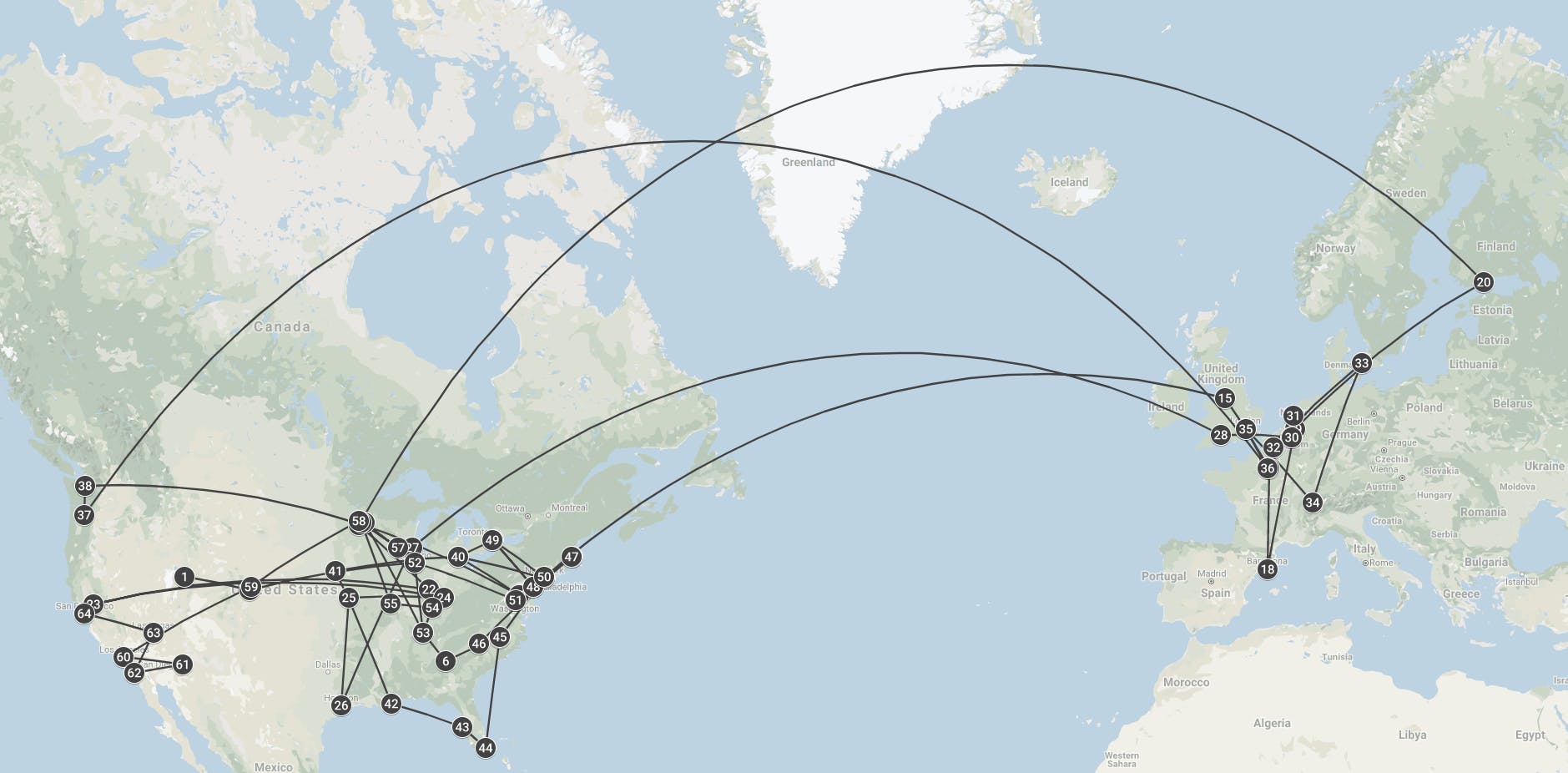
April 28, 2019 • 20 min read

December 31, 2023 • 7 min read
Advertisement
How Concert Tours Work
- Share Content on Facebook
- Share Content on LinkedIn
- Share Content on Flipboard
- Share Content on Reddit
- Share Content via Email

How profitable are concert tours? Very, if the performers are major artists with fans eager to see them. Newcomer Miley Cyrus, for example, brought in $45.3 million from her 70-show Best of Both Worlds concert tour in 2007 and 2008. Tickets sold out in minutes as fans of her "Hannah Montana" TV show vied for the chance to see the teen star perform live during her first music tour [source: MTV News ].
But Mick Jagger and the Rolling Stones, on stage for four decades, hold the record for most profitable tour. Their worldwide A Bigger Bang tour ran from 2005 into 2007 and grossed $558 million [source: Billboard ].
Neither Mick nor Miley is relying on concerts alone for income. Their music tours both followed the release of a new album -- "Hannah Montana 2: Meet Miley Cyrus" for Miley and "A Bigger Bang" for the Rolling Stones -- and both earned more from concert films released after the tours. Disney's 3-D "Best of Both Worlds Concert Tour" film grossed more than $65.3 million before being aired on cable TV, while Martin Scorsese's "Shine a Light" documentary on the Stones' tour grossed $5.3 million [sources: Conde Nast Portfolio , Rolling Stone and Billboard ].
What about performers more distant from sudden fame and reigning stardom? How complicated are concert tours to put together and are they worth the effort? What kind of planning is needed, and how do you work with concert promoters or tour promoters, negotiate a touring schedule and hire a tour crew? Keep reading to find out, starting with the initial planning you'll need to do.
Initial Planning of a Concert Tour
Working with concert promoters, negotiating a concert tour schedule, hiring a concert tour crew.

Think your band is ready to start touring, or are you not sure whether a concert tour should be in your immediate future? Planning and performing during a music tour are complicated and time consuming. Probably the first thing you'll want to do is make sure you can answer that question with a strong "Yes!"
To reach a decision, you'll want to consider factors such as:
- Do we have enough material ready to perform on a tour?
- Can we handle the rigors of travel and the challenge of playing that material every night as if it's fresh and new?
- Do we have a reason to tour now -- like a new CD to promote? Do we have copies of CDs to sell if we are on tour?
- Are we getting enough club bookings and a strong enough response from fans to indicate that they will buy tickets to our concerts?
- Can we get along well enough with each other to survive a tour together?
- What do we want out of a tour -- greater exposure for the band, bigger paychecks for the band members or something else?
Miley Cyrus and the Rolling Stones aside, if you expect to make a lot of money off concert tours, you're likely to be disappointed. By the time the venue, concert promoter and ticket vendor take their cuts, equipment rentals and crew are paid, and transportation and living costs are covered, there may not be as much for the band as you'd expect. That's not even considering sliding CD sales and the move to digital music.
Limited profitability is nothing new for touring bands. Gerald Casale, a founding member of Devo, recalls that band members only earned $12,000 each from the new wave group's Freedom of Choice tour, which grossed $2 million during the group's heyday in 1980 -- and the take would have been even less if T-shirts hadn't sold well. The group began touring again in 2004 [source: Billboard ].
If you've decided you're ready to tour, the next step is preliminary planning, probably led by your band's manager. Here are some questions to consider:
- In which geographic area and at what specific cities and venues do you want to perform? What is your tentative itinerary?
- What specific performing needs do you have in terms of instruments and musical equipment?
- What specific stage, sound engineering and lighting needs do you have?
- How much equipment will the band bring along, and how much will you need to have ready at the venue?
- How many crew members will you need to have on site, and what skills or training do they need?
- What's your tentative budget for the tour, including employee pay and equipment costs?
- What are your limits in tour length and number of shows?
Once you have considered these basics, you need someone who can connect you with your audience. Perhaps your band has a music agent who handles your bookings. But whether you do or not, you or your agent needs to work through a concert promoter, or tour promoter, to put together a tour. Let's look next at what concert promoters do and how to work with them.
Veteran performers continued to dominate the Top 10 list in 2007. Only Josh Grobin and Rascal Flatts started touring after 2000. The average ticket price for the Top 100 concert tours was $61, up 8 percent from $57 a year earlier.
- The Police, $133.2 million
- Kenny Chesney, $71.1 million
- Justin Timberlake, $70.6 million
- Celine Dion, $65.3 million
- Van Halen, $56.7 million
- Tim McGraw and Faith Hill, $52.3 million
- Rod Stewart, $49 million
- Genesis, $47.6 million
- Josh Groban, $43 million
- Rascal Flatts, $41.5 million
[source: Pollstar ]

You could try to set up your concert tour, but you probably wouldn't get very far. Tour venues work with -- or are even owned by -- concert promoters, also known as tour promoters. You'll usually need a signed contract with a tour promoter to set up a tour.
A tour promoter organizes a live music tour and makes sure it's profitable. That can include presenting, advertising and even financing concerts at arenas, clubs, auditoriums, festivals and other special events. The promoter finds the talent, the venue and on-site labor, and then handles advertising, marketing and possibly even ticket sales for the tour [sources: Berklee College of Music and Full Sail ].
The biggest national promoters of music tours are Live Nation and AEG Live. Live Nation has begun signing major performers -- including Madonna, Nickelback, Shakira and Jay-Z -- to multi-year 360 contracts that can cover virtually all of the artist's output. This includes everything from music, concert tours and merchandise to endorsements and broadcast rights [source: Bloomberg ].
Don't expect a 360 contract or a contract from a major concert promoter. These companies want well-known stars whose value should hold for the contract length -- which, in Madonna's case, is 10 years. Taking a chance on an up-and-coming band may be far too risky financially [source: The American ].
Instead, your band's manager or music agent will sit down with a regional promoter to discuss the terms of a live music tour. Here are some ideas for finding a concert promoter:
- Start with who you know. Word-of-mouth references may lead you to a promoter.
- Check industry publications like Billboard and Pollstar , the concert industry trade publication, for ads and articles. Pollstar also sells industry directories listing information for booking agencies, concert venues and concert support services.
- Check with venues where you'd like to play to see which promoters work with them.
Once you've found possible promoters, have your manager or agent contact them with information about your band, including genre, background, previous club and tour experience and a CD of your music.
If a promoter offers your band work through your manager, the next step is hammering out a contract covering the tour. The standard contract is the American Federation of Musicians' AFM Performance Agreement. Riders can be attached to handle specific tour details. While the contract itself is usually short, covering payment, profit splits, dates and locations, the rider may be 10 pages or more. Here are some details covered in a rider:
- Promoter's expenses
- Ticket selling policies, including how complimentary tickets will be handled
- Headline billing rights for signs and publicity
- An equipment breakdown detailing what'll be rented by the promoter vs. provided by the band
- A breakdown of local crew that'll need to be hired
- Dressing rooms, security, catering and travel
- Cancellation policies
[source: Donald S. Passman and Randy Glass ]
Price isn't the only important part of a tour arranagement. You also need to agree on a tour schedule. Keep reading to learn more.
Once you've worked out a price, split percentage and other concert details with the concert promoter, you still need to agree on a daily work schedule for your band's concert tour.
Take a careful look at the schedule the tour promoter offers for the music tour. You'll want to make sure that:
- The tour venues follow a geographically logical way instead of resembling a criss-cross, connect-the-dot pattern of overlapping routes
- Enough travel time is built in, allowing for traffic and weather conditions, so that the band has time to set up and do any necessary rehearsing before a concert
- Days off are worked into the schedule to give the band and crew time to recuperate after a number of hard days of concerts and travel.
Keep in mind, too, that concert tours involve a lot more than setting up, rehearsing and playing for an audience. A promoter or record label is likely to want the band to also do local promotions and interviews with media, meet with fans and sign autographs. There may be even more demands on band members' time.
You'll also want to be open to schedule changes. While the beginning of the tour may be thoroughly mapped out, the rest is likely to be more loosely scheduled. If not enough tickets are sold, one or more of the concert venues may drop out and be replaced with a concert in some other location. And if the tour turns out to be really successful, it may even be extended with additional concerts [source: MusicBizAcademy.com ].
Make your requests regarding the schedule, but in the words of Mick Jagger, "You can't always get what you want." Concert promoters are in business to make money, after all, and they want to keep a band working, not taking days off.
With schedule set and contract in hand, you're ready to get on the road again. Right? Well, not quite. You'll need a production manager and tour crew to take care of the logistics and set-up the equipment on the road. Keep reading to find out more.
CD sales are sliding, down 25 percent in 2008 from 2000. That has record labels, pop stars and lesser known bands looking to concert tours to augment income.
But higher gas prices and tighter money may get in the way for both bands and fans. Start-up bands forced to fill up low-mileage vans towing equipment need to make enough at a gig to recoup gas costs. And fans with less disposable cash may be reluctant to fork out money for concert tickets, particularly for big-name artists with seats selling for $75 and more.
Even beyond those economic realities, consider that:
- The big-name stars that bring in the most fans are aging. The Rolling Stones and other heritage acts led the Top 10 grossing tours in 2006 and 2007. Out of the 20 acts, only Justin Timberlake and Christine Aguilera had yet to reach their 30th birthdays.
- The older stars had a large common fan base, coming from Top 40 radio play and promotions and album sales, to fill concert halls. Today's young music enthusiasts have diverse music interests. They get their music from many different sources like cell phones, social networking sites, iTunes and Limewire and often don't even listen to traditional radio.
[sources: Chicago Tribune and The American ]

Even though a concert tour contract probably provides for some local crew at every stop on the tour, you'll want to have your own crew that travels with the band from venue to venue. This tour crew is invaluable because, unlike the local crew, they know the band, its show and its equipment, and they're there every step of the way to make sure the concerts go smoothly.
Here are some crew members and their responsibilities you'll want to have with you on your tour:
- Tour manager or road manager: Manages travel arrangements, pays bills and handles problems as they occur while the band is touring.
- Production manager : Supervises the technical crew and coordinates their work with that of the venue's local crew. Supervises moving equipment from one venue to the next, as well as setting it up and disassembling it.
- Advance person : Arrives at each tour location before the band and crew to help the road manager and make sure advance arrangements have been handled correctly.
- Stage manager: Controls performers' movements and crew on and off the stage; gives crew cues for the houselights.
- Sound engineer : Operates the front of house console, which controls and mixes the sound the audience hears during a live performance.
- Monitor engineer : Operates the monitor console, controlling the sound the band hears during a concert through on-stage or in-ear monitors.
- Sound crew : Set up, disassemble and run sound equipment, as directed by the sound and monitor engineers.
- Lighting operator : Operates the control console for the show and supervises the lighting crew.
- Lighting crew : Sets up, runs and disassembles lighting equipment. May also handle special effects like smoke machines and hoists.
- Backline crew : Sets up and manages performers' instruments and equipment.
[sources: Berklee College of Music and John Vasey]
As you hire crew to fill these positions, look for people who are:
- Flexible and adaptable. Something can and undoubtedly will go wrong during a concert, and you'll need someone who can deal with the situation calmly and quickly.
- Team players who get along with the band and other managers to reduce friction on the road.
- Skilled at the jobs they do and very familiar with the equipment so that they can run it effectively in unfamiliar venues.
- Committed enough to the band and the tour that they will put up with the inconveniences of being on the road and stick with the tour until the end.
Finally, if you're looking to make it on the concert scene, here's some advice from insiders:
- Don't over-play the same clubs, or your ticket sales will start to drop off.
- Recognize the difference between a recording session and a live performance and give the audience a show to remember.
- Re-invent yourselves and freshen up your act over time, like Madonna and the Rolling Stones, to keep fans coming back year after year.
And a final word of advice: Be sure to explore all the potential revenue streams (such as band merchandise, fan clubs, licensing for TV shows and video games, and more) to add to tour income [source: The American ].
For lots more information about concert tours and related topics, check out the links on the next page.
Lots More Information
Related howstuffworks articles.
- How Band Equipment Works
- How Making It Works: Antigone Rising
- How the Club Circuit Works
- How Live Sound Engineering Works
- How Becoming a Music Agent Works
More Great Links
- American Federation of Musicians
- "All You Need to Know about the Music Business, 5 th ed." Passman, Donald S. and Glass, Randy. Simon and Schuster, 2003, page 341. http://books.google.com/books?id=VQcAY1u8zIMC&pg=PA343&;lpg=PA343&dq=negotiate+with+tour+promoter&source=web&ots=HnoStuHZeJ&sig=KBXNvUOLx5OhNHF6CEqrNLRX44Q&;hl=en&sa=X&oi=book_result&resnum=5&ct=result#PPA340,M1
- "Bon Jovi, Spice Girls Top Mid-Year Touring Chart." Waddell, Ray. Billboard. July 18, 2008. http://www.billboard.com/bbcomnews/article_display.jsp?vnu_content_id=1003829213
- "Careers in Music Business." Berklee College of Music.http://www.berkless.edu/careers/mbm.htm#tours
- "Concert Tour Production Management: How to Take Your Show on the Road." Vasey, John. Focal Press, 1997, pages 3-4.http://books.google.com/books?id=4PiSCRpVB3UC&printsec=frontcover&dq=concert+tour+production&sig=ACfU3U2zKUWwDGf2qQNkpvryH26LPFgALQ#PPA3,M1
- "Devo slowly evolves toward U.S. tour." Madison, Tjames. LiveDaily.com. July 14, 2005. http://www.livedaily.com/news/Devo_slowly_evolves_toward_US_tour-8422.html?t=98
- "Exclusive: Coel, Rapino Talk Live Nation Plans." Waddell, Ray. Billboard. June 23, 2008. http://www.billboard.com/bbcom/search/google/article_display.jsp?vnu_content_id=1003819679
- 'Hannah Montana' goes 3-D on Starz.." Giardina, Carolyn. Billboard. July 11, 2008. http://www.billboard.com/bbcom/search/google/article_display.jsp?vnu_content_id=1003826813
- "Hannah Montana Ticket Bonanza Spurs Officials to Investigate Resellers." Kaufman, Gil. MTV News. Oct. 8, 2007. http://www.mtv.com/news/articles/15713141005/cyrus_miley.jhtml
- "Live Nation Signs Nickelback to Album, Tour Deal." Carrick, Kyla. Bloomberg. July 8, 2008. http://www.bloomberg.com/apps/news?pid=20601082&sid=a3JvhWZnZl6Y&refer=canada
- "Prototype Band Tour and Work Schedule." Knab, Christopher. MusicBizAcademy.com. July 2002. http://www.musicbizacacademy.com/knab/articles/tourschedule.htm
- "Road grows rocky for bands." Kot, Greg. Chicago Tribune. May 25, 2008. http://www.chicagotribune.com/features/arts/chi-recession-pop-0525may25,0,6472218.story
- "Shine a Light." Internet Movie Database. http://www.imdb.com/title/tt0893382/business
- "Stones Bring Bigger Bang." Mar, Alex. Rolling Stone. July 26, 2005. http://www.rollingstone.com/news/story/7504840/stones_bring_bigger_bang
- "The Billboard.com Q&A: Devo." Friedman, Marc and Smith, Karen. Billboard. Jan. 18, 2007. http://www.billboard.com/bbcom/search/google/article_display.jsp?vnu_content_id=1003534792
- "The Billion Dollar Girl." Tirella, Joseph. Conde Nast Portfolio. Feb. 7, 2008. http://www.portfolio.com/culture-lifestyle/culture-inc/arts/2008/02/07/Hannah-Montanas-Earning-Potential
- "The Police Lock 2007 Top Tours Spot." Pollstar.com. Dec. 31, 2007. http://www.pollstar.com/news/viewnews.pl?NewsID=9020
- "The Show Must Go On." Cohen, Jillian. The American. March/April 2008. http://www.american.com/archive/2008/march-april-magazine-contents/the-show-must-go-on
Please copy/paste the following text to properly cite this HowStuffWorks.com article:

/static-assets/statics-12759/images/financebuzz.png)
Trending Stories
/images/2018/01/23/navina-side-hustle-mid_MPfEDfV.jpg)
15 Legit Ways to Make Extra Cash
/images/2019/12/06/smart_strategies_to_save_money_on_car_insurance.jpg)
6 Smart Strategies to Save Money on Car Insurance
How much should music lovers of each genre budget for concerts this summer [data analysis].
Using touring industry data from the last five years, FinanceBuzz determined which music genres are most and least expensive to see in concert, which sell the most tickets, and more.
/images/2022/05/02/audience-enjoying-live-concert.jpg)
This article was subjected to a comprehensive fact-checking process. Our professional fact-checkers verify article information against primary sources, reputable publishers, and experts in the field.
We receive compensation from the products and services mentioned in this story, but the opinions are the author's own. Compensation may impact where offers appear. We have not included all available products or offers. Learn more about how we make money and our editorial policies .
Summer is coming, and for music lovers — summer concerts are returning. Over the last two years, many artists declined to perform live shows or did so in a limited way due to the coronavirus pandemic. But they have since resumed relatively normal touring schedules, giving concert-goers a cathartic sense of normalcy heading into the summer season.
Of course, concerts come with a literal price, as fans must buy tickets to see their favorite artists and hear their favorite tunes. But which genre of music has the biggest price tag?
To answer that question and find out how musical preferences impact how much fans should budget to see their favorite artists, FinanceBuzz looked at concert industry data for 800 of the top touring acts from 2017 to 2021. By collecting information on average ticket price, total ticket sales, and more, we found which music genres are most and least expensive to see live, which genres generate the most money, and more.
Key findings
What is the most expensive music genre to see in concert, which artists had the most expensive tickets in each genre, which genre of music is the most lucrative for artists and venues, how to save a few bucks when seeing your favorite artists, methodology.
- Classic rock was the most expensive music genre to see live. On average, concert-goers paid $119.14 per ticket to see a classic rock performance. The second most expensive genre was pop at $100.65 per ticket.
- Springsteen on Broadway tickets were the most expensive tickets on average in three different years, 2017 ($496.16), 2018 ($508.93), and 2019 ($506.39). Those were also the three most expensive overall ticket costs in the entire analysis.
- Among the 800 tours analyzed, the most common genre was pop, with 137 tours (representing over 17% of all tours evaluated).
- Pop concerts generated nearly $5.3 billion in total ticket sales over the last five years, averaging just over $38.6 million per tour. That makes pop the most lucrative genre in the analysis on both an overall and per-tour basis.
/images/2022/05/02/concert-costs-by-genre-graphic-1.png)
Of the 13 genres analyzed, classic rock concerts proved to be the most expensive for fans. The average ticket price for concerts in this genre was $119.14. This was nearly $20 higher than the second most expensive genre, pop, which had an average ticket cost of $100.65. Tickets for the third most expensive genre — Latin music — cost $91.38 on average.
On the opposite end of the spectrum, Christian music concerts were the most affordable. Ticket prices for top artists in that genre averaged less than $40. Electronic dance music (EDM) tickets were the next most affordable at $55.05. Those are the only genres with average ticket costs of less than $60.
/images/2022/05/02/concert-costs-by-genre-graphic-2.png)
But those hefty price tags pale in comparison to The Boss himself. Tickets to see Bruce Springsteen perform his Springsteen on Broadway tour cost fans $508.93 on average in 2018. That is the most expensive average ticket cost not just in the classic rock category, but for any tour in any genre over the last five years.
In fact, the three most expensive tickets in this entire analysis are all tickets to see Springsteen on Broadway. The 2017 ($496.16), 2018 ($508.93), and 2019 ($506.39) versions of the tour are the only tickets from any tour to cost more than $450 on average.
Only one other genre leader had a tour with average ticket prices of more than $300 — Lady Gaga. Tickets to her 2020 tour cost fans $337.43 on average, beating out Bruno Mars’ 2021 tour ($330.73) by less than $10 per ticket to take the top spot in the pop genre.
/images/2022/05/02/concert-costs-by-genre-graphic-3.png)
Of the 13 genres analyzed, the top touring acts in just five genres generated over one billion dollars in ticket sales from 2017 to 2021. Leading the way was pop music, which produced over $5.2 billion in ticket sales from 137 concerts over the designated time frame.
The only other genres to top the $2 billion mark were classic rock ($3.5 billion) and rock ($2.4 billion). Country and alternative rock round out the top five in overall ticket sales with $1.9 billion and $1.1 billion, respectively.
/images/2022/05/02/concert-costs-by-genre-graphic-4.png)
Of course, raw totals do not tell the whole story, so it’s useful to look at which genres produced the most money on a per tour basis. The top three genres remain the same when looking at things this way, with pop tours generating $38.6 million in ticket sales per tour across 137 tours, followed by classic rock ($35.6 million per tour across 100 tours) and rock ($33.7 million per tour across 72 tours).
From there, however, two new genres find their way to the top five. Interestingly, fourth place belongs to a genre where music is not the main focus (though it often plays a role). That is the “performance” genre, which includes magicians and acrobatic shows in the vein of Cirque du Soleil. The performance genre almost equals rock per tour by generating $33.2 million on average. Rounding out the top five is hip-hop, at $22.5 million per tour.
No matter which style of music is your favorite, tickets to concerts can be expensive. Still, it is possible to afford these experiences without breaking the bank, especially if you follow these tips:
- Earn cash back on concert tickets. Some credit cards offer rewards for entertainment purchases, especially if tickets are purchased through certain online retailers (think Vivid Seats or StubHub). By using one of the best credit cards for concert tickets , you can earn cash back or rewards points with your ticket purchases.
- Use your weekends to make money. Consider a weekend side gig at a local venue where you can bartend, serve food, or even set up events. Putting in an extra few hours with a weekend side job could help you earn money to afford tickets to another concert. Besides, you get to listen to concerts and performances while you work.
- Pick a card issuer that qualifies for presale tickets. To get tickets for those once-in-a-lifetime shows, presale tickets are a must. Learn how to get presale tickets with your credit card and avoid missing out on that must-see concert.
FinanceBuzz looked up Pollstar data on the number of tickets sold and the average price per ticket for each of the tours the service ranked in their annual Top 200 North American Tours list for 2021, 2020, and 2019, as well as their Top 100 Global Tours lists for 2018 and 2017. We first classified each artist/tour according to their genre of music, then multiplied the average ticket price by the number of tickets sold to find the total ticket sales for each tour. We then added the total ticket sales for tours of the same genre together and divided that by the total number of tickets sold for tours in each genre to find the true average ticket price per genre. Ticket costs and sales figures are accurate to the year each tour took place and were not adjusted for inflation. We excluded from our analysis genres with less than 10 tours represented in the data. As a result, opera, reggae, and jazz were not included in our findings.
Lucrative, Flat-Rate Cash Rewards
Wells fargo active cash ® card.
/images/2023/11/13/wells-fargo-active-cash-nov-2023.png)
FinanceBuzz writers and editors score cards based on a number of objective features as well as our expert editorial assessment. Our partners do not influence how we rate products.
Current Offer
- $200 cash rewards bonus after spending $500 in purchases in the first 3 months
Rewards Rate
Earn 2% cash rewards on purchases
- Earn unlimited 2% cash rewards on purchases
- Intro APR on purchases and qualifying balance transfers
- $0 annual fee
- Has foreign transaction fee
- No bonus categories
- Select “Apply Now” to take advantage of this specific offer and learn more about product features, terms and conditions.
- Earn a $200 cash rewards bonus after spending $500 in purchases in the first 3 months.
- Earn unlimited 2% cash rewards on purchases.
- 0% intro APR for 15 months from account opening on purchases and qualifying balance transfers. 20.24%, 25.24%, or 29.99% Variable APR thereafter; balance transfers made within 120 days qualify for the intro rate and fee of 3% then a BT fee of up to 5%, min: $5.
- $0 annual fee.
- No categories to track or remember and cash rewards don’t expire as long as your account remains open.
- Find tickets to top sports and entertainment events, book travel, make dinner reservations and more with your complimentary 24/7 Visa Signature® Concierge.
- Up to $600 of cell phone protection against damage or theft. Subject to a $25 deductible.
/authors/josh_koebert_updated.png)
Author Details
Josh Koebert
- Credit Cards
- Best Credit Cards
- Side Hustles
- Savings Accounts
- Pay Off Debt
- Travel Credit Cards
What Does It Cost To Tour In 2018?
Touring is where the money is at in today’s music business.
But it’s also where most of the expenses lie as well.
Creating a realistic tour budget can help your time on the road be successful, but it’s far from a guarantee that you’ll end up turning a profit. The band Pomplamoose famously lost almost $12,000 on the month-long tour they wrote about in 2014 .
From transportation, to gear, to routing, to accomodations, to paying third parties… having a good idea how much touring costs is essential for musicians who hope to make their time out on the road worth their while.
If you’re confused about how much it really costs to tour––and don’t be ashamed if you are––then you’re in luck. We’ve broken down the costs of touring here.
Like anything else, these costs depend on what stage you are in your career. So we’ve broken it down into the expected costs of a one-month tour in three tiers of expense levels:
This expense level represents the most basic costs of touring––transportation to and from each show, gas money, paying band members etc. Things like cramming an entire band into a small hotel room each night and relying on the smallest outside crew possible is common at this level of touring. Artists and bands touring on a tight budget usually stick to this expense level.
Artists touring at the medium expense level are able to allocate extra funds to things like live show production features, more comfortable accommodations, and promotion efforts for their shows. Tours with a medium budget make life easier for artists, and shows can be more engaging for fans.
No expense is spared for artists who can afford to tour at this level. Elaborate stage productions, massive live-in touring rigs and dozens of touring staff members represent a level of touring only the world’s most successful artists are able to have access to. Featuring over 100 performers, technical directors and crew accompanied by enough props for 400 technological cues, Katy Perry’s recent 18-month long tour is a great example of touring at a premium level. For transporting all the stage equipment needed for the shows alone, her tour required two semi-trucks.
Now that we’ve explained the three expense levels of touring, let’s take a look at the numbers. It’s important to note here that even within these tiers, there’s a huge range of costs to consider. Every artist’s financial situation is unique, so there’s no single way to gauge touring expenses.
Production Expenses
This includes equipment and transportation rentals, lights, props, costume changes, and sound engineering expenses. These are just a few of the many production expenses often involved with touring. For artists touring at the most basic level, these expenses are mostly covered by the venues where they perform, but prices quickly increase the more elaborate a tour gets.
A recent article in The Guardian profiled the manager of a massive touring act that wished to remain anonymous. He claimed that it cost the artist he managed over $750,000 each day to stay on the road whether they were performing or not. While not all that money goes directly to production expenses, it’s safe to assume a good portion of a major artist’s touring budget is spent on renting tour busses and stage equipment.
- Basic : $0-$5,000
- Medium : $5,000-$50,000
- Premium : $50,000-$10,000,000
Accomodations
The band and your crew have to sleep sometime, right? Accomodations usually prove one of the most expensive aspects of touring, especially at basic and medium levels. Young, unestablished acts are often fine winging it by crashing on any available floors each night out on the road. But things get expensive quick for artists who require hotels and AirBnB’s.
In 2014, the band Pomplamoose wrote an article detailing all the expenses of one of their recent tours. For a little more than month of staying in “Best Western” level hotels around the US, it cost the band just over $17,000. For a band touring at the most basic level of expense, at $100 a night on average, a month-long tour will run about $3,100 if all the band members can stand piling into one room every night. Expenses get slightly tricky to gauge at the premium level of touring because artists typically stay in big tour busses, which can also be considered as a production expense.
- Basic: $3,100-$6,200
- Medium: $6,200-$25,000
- Premium: $25,000-$5,000,00 0
Transportation Expenses
From young bands venturing out on tour for the first time, to the world’s most famous musicians, no artist can avoid the cost of traveling from show to show. Transportation expenses vary wildly, as you’ll soon see, because they can include everything from a small artist’s gas and toll expenses down to the money it costs a major music superstar to fly between continents. There’s a lot of nasty hidden costs here to consider, including what it costs to park a big touring rig every night.
A 2015 article published by the American radio station WAMU explains how ballooning gas prices make life difficult for small DIY artists: “Between June 1999 and June 2014, gas prices rose by 216 percent before they began to slide. The federal minimum wage increased by 41 percent in the same amount of time.”
- Basic: $3,500-$5,000
- Medium: $5,000-$25,000
- Premium: $25,000-$2,000,00 0
The risk an artist incurs on tour increases exponentially the more elaborate their shows get. Insurance is essential for helping artists to protect themselves from anything that could go wrong on the road: theft, audience members somehow getting injured, etc.
Costs here are all over the place, ranging from around $60 per show at the basic level to prices ranging in the millions for a month-long tour.
- Basic: $1,860-$3,000
- Medium: $3,000-$15,000
- Premium: $15,000-$7,000,000
Crew Salaries and Per Diems
Members of your touring staff could include anyone from the musicians you hire to back you up on stage, to sound engineers, to choreographers and dancers. For artists touring on a bare-bones touring budget, a touring crew could be as small as a band or solo artist bringing one extra person along to man the merch booth.
But for massive touring efforts like the one Katy Perry recently embarked on, crew members can easily range in the hundreds. In the tour the band Pomplamoose detailed in a 2014 article , nearly $50,000 was paid out to four musicians, a front of house engineer and tour manager. Pomplamoose has undoubtedly found a lot of success, but they’re far from superstar status, which puts them squarely in the medium expense category of touring.
- Basic : $7,500-$20,000
- Medium : $20,00-$100,00
- Premium : $100,000-$15,500,000
Merchandise
Providing great merch options for fans is an essential part of profitable touring for artists at any stage of their career. More than just shirts, stickers and pins, an entire side industry has sprung up around the creative offerings artists make available for audiences at their live shows on tour .
Money earned from merch often means the difference between making a profit on tour or not. At the basic expense level, an artist’s merch booth might feature single options for shirts and stickers, but major artists offer dozens of varieties of everything from hooded sweatshirts to holiday sweaters like the one the metal band Slayer famously made.
- Basic : $500-$3,500
- Medium : $3,500-$25,000
- Premium : $25,000-$1,250,000
Marketing and Promotion
To ensure a successful tour, marketing campaigns are used to get the word out to the general public. At the basic and medium expense levels, marketing for a tour might consist of purchasing ads over Facebook and in alt weeklies.
But at the premium level, massive TV and radio commercials working in tandem with expert PR campaigns are often used to spread the word. For an artist promoting a tour at the medium expense level, $10,000 isn’t an unreasonable amount for a modest PR campaign and some pre-tour marketing.
- Basic : $250-$2,500
- Medium : $2,500-$30,000
- Premium : $30,000-$4,000,000
Commissions and Third Party Payments
The larger the tour, the more outside commissions and third parties there are to split profits with. Concert promoters, managers, booking agents, and of course the venues you’ll play in will inevitably take a sizeable cut of your profits if you’re touring at a medium or premium level. It’s even common for the profits from merch sales to be split among third parties like venues and promoters.
This is an unavoidable part of touring for virtually all established artists–– unless you’re legendary rock band Nine Inch Nails . Frustrated with outside promoters making it harder for their fans to purchase affordable tickets for their shows, the band is requiring audiences to purchase tickets in person three weeks before each show on their upcoming tour. Respectable as it is, this is a bold, complicated move that simply won’t work for most artists.
- Basic : $500-$5,000
- Medium : $5,000-$20,000
- Premium : $20,000-$15,000,000
Month-long tour cost estimates totals:
$17,210-$50,200
$50,200-$290,000
$290,000-$59,750,000
Don’t let your tour turn into a money pit. Smart budgeting, and planning expenses ahead of time, can make the difference between a meaningful payday or a career-ending debacle.
DOES YOUR BACK CATALOG EARN ENOUGH TO PAY FOR A TOUR? FIND OUT USING THE ROYALTY EXCHANGE KNOW YOUR WORTH APP
Tools & tips, creator resources.
.jpg)

By The Barricade

How Much Money Bands Make on Tour: The Breakdown
There are always plenty of myths about how much money bands make on tour. If you ask megastars, then they’ll easily say millions. Yet, you might find a different answer from a much smaller act.
The true figures about how much money bands make on tour depend on their schedule, crew, attendance of the show, and the amount of merchandise sold each night.
What may seem like a lucrative part of the industry can be particularly misleading, and amounts will vary from act to act.
The music industry’s costs and potential earnings from touring can vary heavily. So just how much money do bands make on tour, and is it worth all the effort?
4 Ways Bands Make Money While On Tour
Considering the money bands make on tour, it’s about getting bodies in the venue.
The more people attend a show, the more money you make. What gives the band revenue streams are factors such as:
- Promoters rate
- Ticket price
- Merch sales
So let’s see how these can earn bands money when playing on tour, as they are all slightly different in how they bring in money.
1. Flat Promoter Fees
Bands first receive a flat amount for playing a tour or show from the promoter .
This fee will vary depending on the band’s place on the card and the type of event they are playing. For example, headliners of a month-long tour will be paid more than an opening act who appears at only a set number of shows.
Agents and venues will take a small amount of this fee, but most of the money will go directly to the act.
A flat fee guarantees you get something from every show you play. The guarantee often will be a minimum of $500-$800 per show, so bands playing ten shows may receive a flat fee of $5000.
2. Show Guarantees
Guarantees are a deal you can make with the venue to bring in X sales if they cut their cost by Y. If you are an established band, you might get away with this. But for those that are starting, you will need to prove that you can make this mark with your social media presence.
For example, if 8 out of 10 shows sell out, a band might receive an $800 bonus for selling out a set number of venues.
Speaking of social media – if you are signed on with a label, this is an expense that you will not have to cover yourself. Typically, most labels will do all of your promotion and social media marketing for you because this is how they make money off of you. So get them to leverage this as much as they can!
It is easy to see why the term “starving artist” exists with all of this information. The cost to initially go on tour is costly, and there are not a lot of guarantees that you can make money. Many bands will lose money before they start to make money from touring . However, you can make traveling a career with persistence and a keen budgetary eye. ALWAYS make sure you do your research.
These sorts of fees entice bands to hit the road in the first place. And it is how the big bands earn big bucks from sponsors and promoters looking to fill big venues after someone’s profile reaches new heights.
Total minimum income from promoter fees (guarantees and flat payouts): $5000-$8000
3. Ticket Sales & Gate Receipts
The other big income driver is selling the people into the venue itself. And your income from this is easy to work out. The more people at a show, the more money you earn.
Don’t get excited, though, thinking that you are going to 100% of the sales from a sold-out venue. The figure currently sits at around 75-80% of the amount.
After all, promoters, venues, and agents will take their slice of the money before you receive the income from those entering the venue.
So how much might you earn? Well, most average gig venues have a capacity of around 350 people. According to FinanceBuzz, the average price for a ticket sits at $63.54 for shows in the USA. Going by this estimate, a sold-out show would generate a base revenue of $22,239. Removing the fees from agents leaves $16,679 for acts to take.
When dividing these figures amongst the artists playing, a headliner looks to take around 60% of these figures, while support acts may receive 20%.
So going by these figures, headliners would get $10,007 from a sold-out show while two support acts would receive $3335. That is before the money is then split between individual members.
If you play in a four-piece, headlining band members would receive $2,501 per show, and those on the support bill would receive $833 each.
It shows how vital selling out venues is for everyone on the card, regardless if they are a headlining act or first on the support bill.
Total minimum income from sales/show: $800-$2500
4. Merchandise
The other big money generator is by selling merchandise. Merchandising is a big way to boost potential income, mainly if a venue is sold out.
Fans will always want to grab something from a show, and even just having a t-shirt for sale makes a big difference to your worth.
You must know you won’t get all the profits some bands get. Depending on different factors, the venue will look to recoup a decent slice of the sales numbers, which might range from 20-35%.
With that in mind, you need to set prices that are not extortionate but also allow you to recoup what it costs to make them. It’s why most bands set a minimum of $10-$20 for shirts at a stall.
Some merchandising companies will jack prices up higher if they are representing a headliner, and that’s when fees will hit $40-$50 per shirt.
If you can sell shirts to a minimum of 60% of a 350-person venue, you are looking at generally an average minimum of $3,150 in shirt sales per show.
After deducting external fees, you would receive $2,205 to share among band members. This would break down to an average of $551.25 per show for each member of a four-piece band .
It could allow members to earn at least $5510 each if they were to repeat this on a 10-show tour where each show had sold out.
Total minimum income in Merch sales: $5500-22,200
Who Gets The Most Money on Tour? Bands or Everyone Else?
Touring is a relentless beast for any act. However, it’s also a necessity. Playing show after show for weeks on end is a grueling effort, but it is the best way to boost your profile and sales of CDs.
You often see tours touted as the money maker for best-selling artists; to a degree, they aren’t wrong.
According to to live revenue aggregator Pollstar, The Rolling Stones have amassed $2.17bn through touring throughout their career, with U2 having also grossed $2.13bn over past decades.
Surely, musicians should all be touring as much as possible, right? However, that’s not quite the case.
Many major acts who perform at stadiums and arenas will have others funding much of their set. This could be through primary sponsors, promoters, and even record labels.
For bands or musicians touring in a van from town to town, it’s a much different scenario. It’s here where every little item makes a difference to the end figure you receive.
Costs to think about when on tour
When battling profits and losses, everything will impact just what you will make. This all includes:
- Travel & Accommodation
- Overall Attendance
- Third-Party Deals
- Merchandising
It’s a lot to take in, but you need to know how each of these may see you finish making a profit or sucking on a loss.
You will find that the only concrete money that comes into your pocket will be whatever the promoter pays you to complete the tour .
From there, everything else is potentially fluid. Your primary sources of income will come from the gate of each show.
The more people who attend, the better chances of making a profit. It’ll also directly drive how much you make from merch sales.
From there, the costs then start to add up. Logistics aren’t cheap, even if you stay at budget hotels and use a second-hand van for riding show to show.
That doesn’t cover paying for those with you on tour. Costs can include paying crew members for technical support and selling merch for you.
Furthermore, there are also third-party costs that may need to be factored in too. Venues often take some share of merch sales and gate receipts as well. This may not be much, but 10% over several weeks soon adds up.
When considering pure travel or rest days, everything runs closer to the break-even point (where revenue equals costs). So is it all worth it?
The 6 Highest Costs of Touring as a Band You Need To Know
Touring is very much part of the industry. It’s what drives sales and boosts star power. However, to make money, you do genuinely have to spend money.
Spending is what it might feel like your band is doing non-stop when on tour. Everything costs, and it’s not cheap to do even a month’s tour in the current climate.
Let’s take some time to break down just what you might be spending on the road.
1. Travel & Accommodation
It would be best if you worked out everything regarding logistics. Even a domestic tour of the US isn’t going to be cheap.
Just in logistics, you will frequently be spending high amounts of money on:
- Accommodation
- Means of transportation
When it comes to transportation, driving is by far the cheapest method. Yet, it doesn’t make it particularly affordable. You would be lucky to hire a van and trailer for anything less than $10000 for the tour.
Then, just fuel will drive your costs even higher. The EIA showed that the cost per gallon has skyrocketed from $1.50 in 2000 to over $5 in the 2020s.
With fuel prices rising at an average annual rate of 4%, it’s a brutal price to pay just from getting from show to show. This would mean that you may spend a minimum of $5,000-$10,000 on a month’s tour in fuel. These fuel costs significantly impact where bands must tour , so their potential earnings are worth the effort.
Then there’s accommodation. You will need to find somewhere to sleep, and you can’t spend every night sleeping in a van. You will find that most cheap hotels will set you back an average of $50 a night per person. That is a minimum of $300-$500 a night for your traveling party. If you set that back over a month-long tour, it’s another $8000 in expenses.
Total Minimum Logistics Cost: approx. $20000-25000
2. Personnel Costs (Staffing)
Another considerable expense will be paying for having any team members with you on tour. This will be an amount that varies depending on your act as a whole.
If you are a solo artist or a band, you might get away with having a manager with you on tour and a roadie to work lights/sound engineering.
The costs will expand even further for acts with an additional crew, such as merch sellers and extra musicians. But everyone still has to be paid for.
Some acts have been straightforward about these costs. Indie pop duo Pomplamoose revealed in 2014 that for their tour, they paid six tour members $8794 for a week on the road. That included four touring musicians and two sound staff. That equated to over $43,000 during that 5-week tour.
While crew costs may be smaller than what Pomplamoose paid for that tour, you will still need to pay the crew what they are worth for tours. That will be $10,000 for two or three crew members over a month.
Total Minimum Crew Costs:$10,000
3. Insurance
You can’t be on tour without being insured when on stage. This covers both yourself or injury and potential incidents with fans on stage.
You never know when a set piece might spontaneously collapse, or a stage dive might go wrong. Most policies can be split into two areas:
- Annual amount
For those playing intermittently, prices by the event may only hit around $50-$60, but tour-wide policies can stretch into the thousands.
Annual fees can be cheaper; these cover artists year-round regardless of how much they perform. With these policies starting at around $200 per performer, it can work out more affordable for those performing all-year round.
What makes insurance “expensive” is deciding not to pay for it. Getting sued because someone gets injured at your show is a reality.
Total Minimum Insurance Cost: $50-$800
4. Production Cost
Production costs are never going to be cheap. Even though you own all your instruments, you must determine what lighting and sound equipment you may need to rent.
None of this equipment is particularly cheap, especially lighting rigs and other heavy items requiring much power. This, on its own, will likely set you back several thousand to get what you need.
Throw in a couple more thousand for trailers to haul everything along, and you will likely find that production costs will reach a minimum of $5,000-$10,000.
Thankfully, it’s a far cry from what an established tour manager revealed to the English newspaper The Guardian that they spent over $750,000 daily for a significant headlining stadium tour.
Total Minimum Production Cost: $5,000-$10,000
5. Merchandise
Before earning the benefit of merch sales figures, you need to physically create the shirts and hats and make enough of them to sell at the show.
Making merchandise isn’t cheap, and there are plenty of loopholes to negotiate before you can sell it.
You need to think carefully about the average size of your venues and the type of people at those shows. This lets you determine how much you need to create and what kind of items you want to sell.
Production costs will generally start in the hundreds if you sell one t-shirt style for your act, and then it’s just a matter of the quantity.
So if you manufactured one shirt at a base cost of $3, getting 500 for a week’s worth of shows would cost you $150. It would expand to $600 if you did this for a month-long tour.
Should you expand your product line, then that will drive costs higher. For example, creating an embroidered hat would start at $12. The 500 items for a week would cost $6000 to sell alongside a t-shirt.
Thankfully, you can recoup these costs back through sales, but it still needs to be counted up when adding total expenses.
Total Minimum Merchandising Costs: $500-$3000
Food is the energy that gives your team the power to rock. Choose whole-grain sources for sustained energy. Nobody shreds like a guitarist fueled by shredded wheat.
In all seriousness, it doesn’t hurt to prioritize healthy and economical foods when you’re on the road. The temptation for gas station junk food is hard to resist, but they don’t provide the best value in terms of nutrition. A sugar crash halfway through a set isn’t ideal.
Non-perishable staples, including canned goods you can warm up in a hotel microwave, are among the most cost-effective foods for road trips. Ultimately, getting most of your food from a grocery store rather than a drive-through will save your band a great deal. Except to spend about $10 a day (give or take) per person this way.
Also, free hotel breakfasts can come in extraordinarily hand
Total Minimum Food Costs: $300
7. Fees That Come Outside of the Tours and Shows
When working out costs, you also need to consider any cuts external parties may take from overall figures. This is something you should consider a general expense.
First, you need to consider who is taking what shares from the potential income you may receive.
These amounts generally won’t change, and figures will be spread between promoters, third-party agents, and the venue. Those figures include:
- Promoters: 10% of gate receipts
- Booking Agents : 5-10% of playing fee, gate receipts
- Venue: 20-30% Merchandise sales, 20% Gate Receipts
With everyone looking to get a slice of the action, it can genuinely affect how much money bands make on tour. And your overall net income will drop as more people become involved.
Merchandise sales are hotly contested, with many venues slowly looking to get an increased share of what is sold in their venues. For example, venues in the UK increased their take to 30% in 2022 as venues themselves looked to find ways to stay profitable.
Consider carefully what you may lose in add-on figures for an entire tour. You may need to be aware of the cut everyone else is looking to take.
Total Minimum Add-On Costs: 20-30% of all incoming figures
How Much Money Bands Make On Tour – Comparing Expenses and Profits With an Example
There are often fine margins when working out how much money bands make on tour. These margins are often dictated by how many people attend a show.
It’s a big risk to take especially considering how much bands have to fork out to go on the road in the first place. As we can see from the following breakdown:
Final Breakdowns
Total Minimum costs:
- Logistics: $20000-25000
- Crew: $10000-$30000
- Insurance: $200-$8000
- Production: $8000-$10000
- Merchandise: $2400-$21000
Minimum Tour Cost: $40,600
To have to spend $40,600 just for a potential four-week tour is a massive amount for any band to commit to. And it’s a commitment with no guarantee of success.
It’s why acts hope that they can sell out shows and try to bring in as much money as possible. A successful tour can be profitable, though, as our breakdown shows.
Minimum Income (headlining act):
- Promoter Fees: $5000-$8000
- Ticket Sales: $25000
- Merchandise: $22,000
Total Income: $52,000
For a headlining act, an income of $52,000 from a tour means the band just about comes out profitable, posting a margin of $11,600. Each band member would walk away with $13,000 from a tour.
By this estimate, bands must repeat that cycle for several months to earn a decent annual salary.
With the US Bureau of Statistics averaging the annual average salary at $54,132, bands would need to tour for four months a year for each member to hit that milestone.
That is still dependent on the shows being completely sold out. If attendances are only half or 75% full, bands risk being left in the red.
It’s why touring is not quite as glamorous as it might seem, and a lot of hard work is required to showcase just how much money bands make on tour and make it a successful venture.

Your Free eBook is Waiting
Share your email below to receive an eBook with $100,000 worth of information that will kick start your music career.
You have Successfully Subscribed!
You're signing up to receive emails from By The Barricade
Similar Posts

How to learn saxophone by yourself
When thinking about how to learn saxophone by yourself, it feels like an enormous task as you try to take on one of music’s most versatile instruments. But how do you learn saxophone by yourself? There are many ways to learn saxophone by yourself, whether by learning from online tutorials, purchasing books, or even teaching…

How Much Money Has KISS Made?
There’s no doubt KISS encapsulates everything about a successful band. It doesn’t matter which generation bore you nor what musical genre you prefer — there’s an overwhelming likelihood that you’re familiar with KISS. Store speakers, the radio, classic rock playlists, and more continue to broadcast their music as they’ve done for decades. Basically, you’d have…
Drum Machine vs Sampler: Are They the Same?
When it comes to choosing a drum machine vs a sampler, it’s not always an easy choice. It’s a big call to make as it defines how your song will develop. But what is the difference between the two devices? In the battle between a drum machine vs a sampler, the drum machine uses pre-produced…
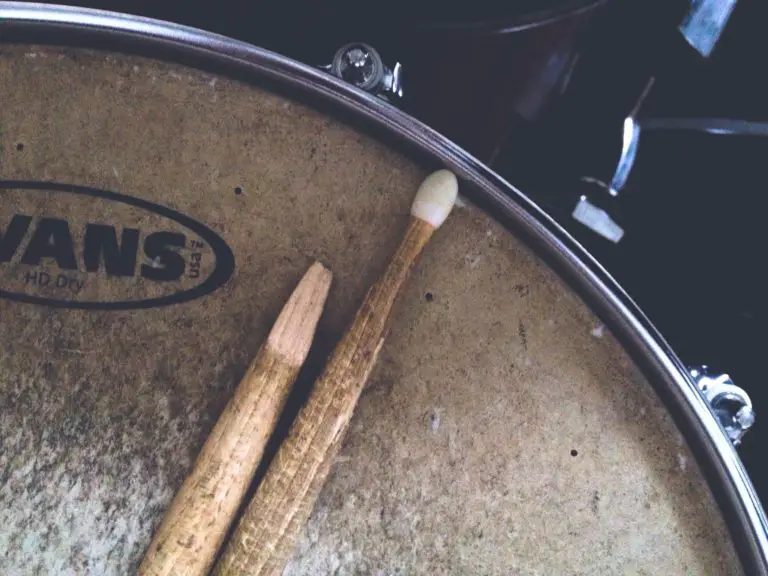
The Best Drumstick Brands According to the World’s Most Talented Drummers
A great drummer needs a great pair of sticks. Not sure what kind to use? Try using the same as your favorite artist. This way, your drumsticks will provide your preferred sound and feel. In that case, which drumsticks do famous drummers use? It depends on the drummer. Famous metal drummers opt for drumsticks emphasizing…

Why Does Singing Sound So Different Live from Studio?
Have you ever picked up an excellent band, only to find them to sound completely different during a live performance? I’ve been there. Sometimes, it isn’t pretty. In a few cases, It can cause you to ask how long this band is going to last. Why Does Singing Sound So Different Live from Studio? Energy…

Stage Rugs: What Are They And Why Bands Use Them
Have you ever wondered why some musicians stand on top of rugs on stage? A couple of years ago, I was at a huge outdoor festival and heard another concertgoer say that the singer stood on a rug he used to mark his territory, that no one else was permitted on *his* rug, sorta like…
Get More Fans Today
Sign up for a free step-by-step guide and checklist to elevate your music career.
Success, your eBook will arrive in your inbox shortly.

Cost of doing festivals, concerts and tours soared in 2022, a year of big profits and daunting challenges, including COVID
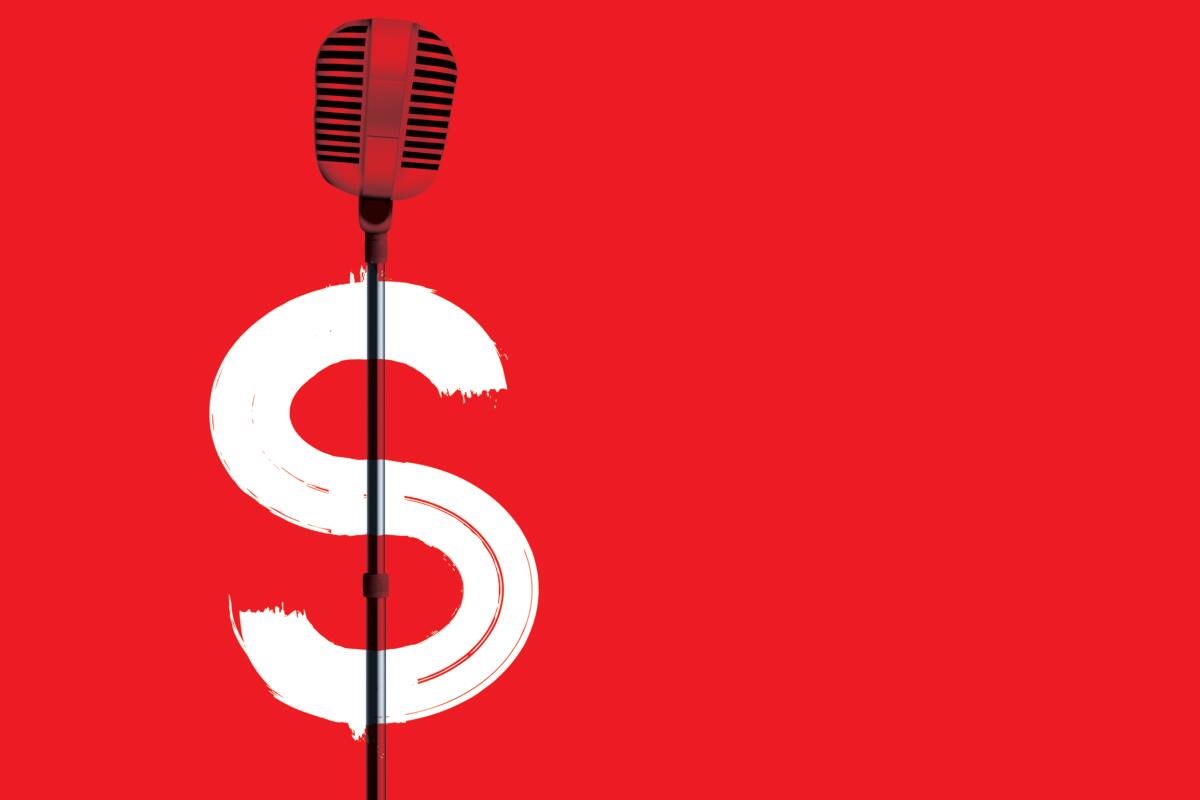
Inflation, supply chain backups and the pandemic were factors. Hopes are for a more ‘normal’ 2023, but possible recession and new COVID surge are concerns
- Show more sharing options
- Copy Link URL Copied!
Was 2022 an extraordinarily profitable year for festivals, concerts and tours by bands and solo artists? An extraordinarily costly one? Or both? And with concerns about a possible recession or new COVID surge, what is the outlook for this new year?
The answers depend on who you ask about the past 12 months and what lies ahead. The past year saw some tours, venues and festivals enjoy record attendance. But others could not overcome inflation, skyrocketing production costs, supply-chain issues, staffing shortages and the continuing impact of the nearly 3-year-old COVID pandemic.
A number of superstar acts earned more than ever from their performances, including Elton John and Bad Bunny, both of whom did sold-out San Diego concerts at Petco Park. Their 2022 tours earned, respectively, $274 million and $393.3 million.

Best San Diego concerts of 2022: Elton John’s farewell at Petco Park, Rosalía’s debut at SDSU and more
Petco Park hosted a record number of concerts this year, while Humphreys and North Island Credit Union Amphitheatre each had their longest seasons ever
Dec. 30, 2022
Other performers had more modest paydays. But some younger acts — and even some established ones — shortened or canceled their tours, citing daunting economic challenges and mental health issues.
“Unpredictability is the new normal,” said Bartell Hotels President Richard Bartell, whose company owns and operates the 42-year-old Humphreys Concerts by the Bay series.
“It was a wild and bumpy year,” agreed multiple Grammy Award-winning album producer Chris Goldsmith. As president of Belly Up Entertainment, he oversees operations and talent bookings at the Belly Up in Solana Beach, the Music Box in Little Italy and the soon-to-open Del Mar concert venue The Sound.
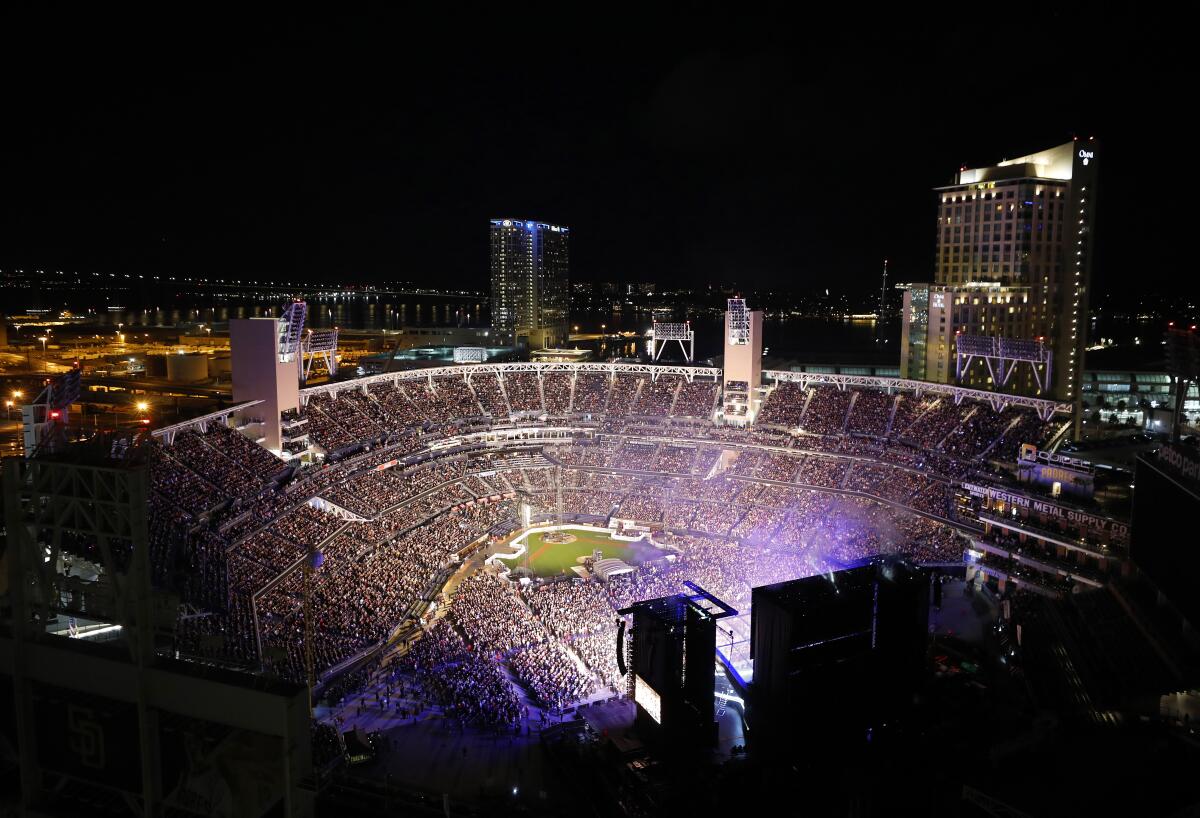
Record earnings for Live Nation
Both Humphreys and the Belly Up had banner years in 2022. So did Live Nation, the world’s largest concert and live events producer, which in November reported record $12.3 billion in revenue for the first three quarters of 2022.
That was a dizzying jump of 43 percent over the 2019 earnings for Live Nation. The company owns and operates San Diego’s North Island Credit Union Amphitheatre and House of Blues, in addition to exclusively booking concerts at SDSU’s Viejas Arena and other area venues.
Between June 30 and Sept. 30, Live Nation reported, it staged more than 11,000 worldwide events that drew more than 44 million fans. Both totals are records.
But that success did not extend to such critically acclaimed artists as Santigold and Animal Collective — whose acclaimed debut albums came out in 2008 and 2000, respectively — or to San Diego troubadour Gregory Page, whose debut solo album was released in 1994.

Philadelphia-born singer-songwriter Santigold canceled her entire 2022 U.S. tour because of onerous travel and production costs, as well as health concerns.
“Gas, tour buses, hotels, and flight costs skyrocketed,” she wrote in an October statement on her website. “Many of our tried-and-true venues (were) unavailable due to a flooded market of artists trying to book shows in the same cities, and positive (COVID) test results constantly halting schedules with devastating financial consequences. Some of us are finding ourselves simply unable to make it work.”
October also saw Animal Collective, an experimental psychedelic-rock band formed in Baltimore in 1999, cancel its fall tour of Europe. This followed the cancellation of some the band’s 2022 U.S. tour dates after three of its four members contracted COVID. Band co-founder Joshua Dibb is an Orange County native.
“Preparing for this (European) tour we were looking at an economic reality that simply does not work and is not sustainable,” Animal Collective wrote on its Instagram page.
“From inflation to currency devaluation, to bloated shipping and transportation costs, and much much more, we simply could not make a budget for this tour that did not lose money even if everything went as well as it could...”

And October saw leading San Diego troubadour Gregory Page finally kick off his latest European tour — pushed back from 2020 and 2021 — only to contract COVID right after his opening concert in the Netherlands.
“I canceled a few shows,” Page said. “Then I took antiviral medicine and tested negative but was still sick with bronchitis for the rest of my seven-week tour. I let all the promoters know I was ill and they didn’t really care. It wasn’t feasible for me to cancel the tour.”

My last gig: Singer-songwriter Gregory Page: ‘My livelihood has been taken away’
The San Diego Music Award-winning troubadour had all his local shows and two European tours through because of the pandemic
March 14, 2021
Award-winning San Diego blues-soul singer Whitney Shay made three trips to Europe to perform in 2022. Like Page, she also got ill.
“I got COVID two days after I came back from doing a festival in France in July,” Shay said. “Unfortunately, it’s a risk in our profession being around the public a lot. And every time there’s a (pandemic) surge, there are still people who are understandably reticent to go out to concerts.”
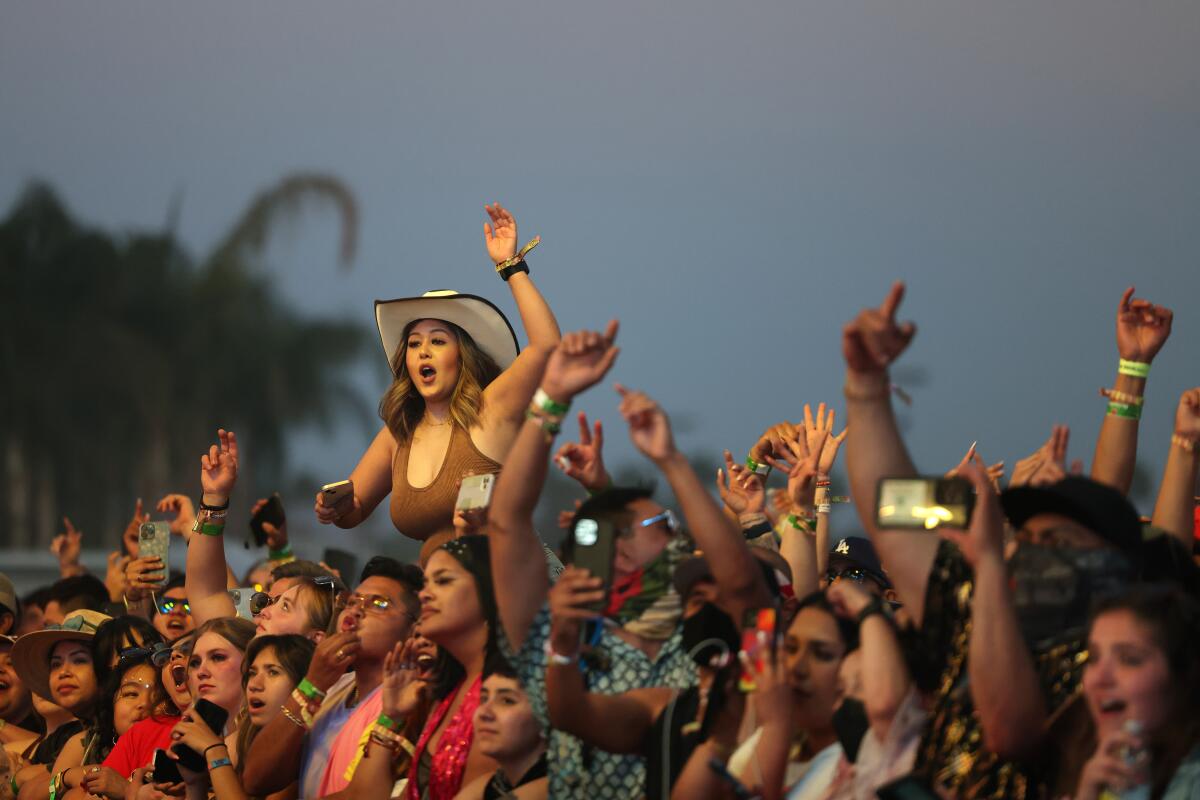
Festivals triumphed and faltered
Some multiday festivals vanished in 2022, some almost overnight, including Camp Flog Gnaw in Los Angeles and Nevada’s Day N Vegas. Other festivals had record or near-record years, including Coachella, which resumed — after being postponed because of the pandemic in 2020 and 2021 — and once again drew a sold-out crowd, over two consecutive weekends, of 750,000.
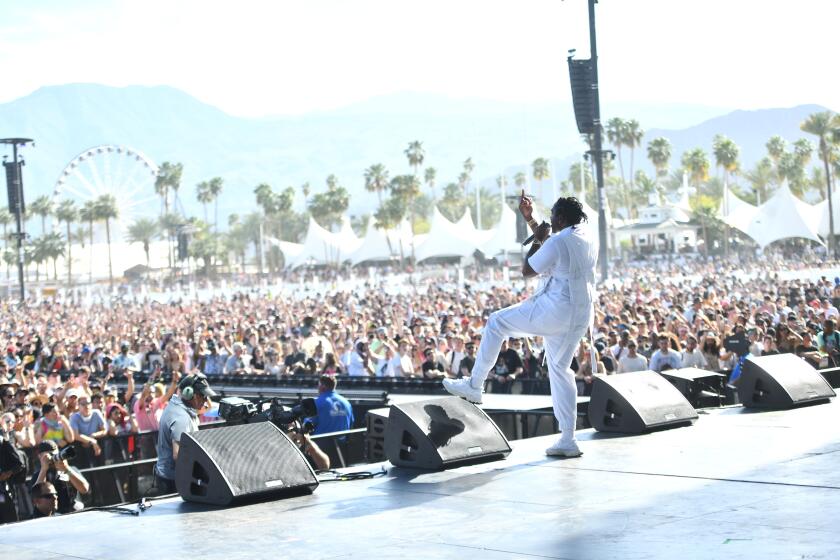

Analysis: Coachella 2022: True to tradition, or a TikTok makeover? Festival undergoes new generational shift
Up until a few years ago, it may have seemed unthinkable that One Direction boy-band alum Harry Styles would headline the festival. Times have changed
April 13, 2022
But the cost of producing festivals and individual concerts increased across the board, sometimes at dizzying rates.
This applied to free events, such as the two-day 2022 Adams Avenue Street Fair, and to for-profit events, such as San Diego’s three-day Wonderfront Music & Arts Festival.
“Before we canceled our 2021 street fair, we paid $12,000 for (renting) five stages. This year, it costs $24,500 for four stages,” said Scott Kessler, the head of the Adams Avenue Business Association.
“Band fees have increased, our port-a-potty rental fees have doubled and the price we’re paying for everything has gone up. Everyone’s been out of business for two years, so how can you fault them? Our board voted to lose money on the event this year and not to cancel it. We made the right decision.”

For Wonderfront, whose high-priced 2022 headliners included Gwen Stefani and the Zac Brown Band, production cost rises were considerably more steep.
“Everything is more expensive this year — labor, equipment rentals, you name it — not 30 percent higher, but 300 percent higher, in some cases,” said Paul Thornton, a co-producer of the festival. “I’ve never seen anything like it in my three decades of producing music events.”
Wonderfront debuted in 2019 but was stilled the next two years by the pandemic. Its welcome return in 2022 was marred by the dramatic increase in production costs, a loss of momentum after being dormant for so long and a corresponding drop in attendance. The rule of thumb for new festivals is that it typically takes about three to five years to become profitable, as was the case for Coachella.
“The prices for headline talent for festivals have gone nuclear,” said Belly Up Entertainment’s Goldsmith.
“An act that might have been paid $1 million per show before the pandemic now gets $2 million. That’s not inflation; that’s because of demand from so many competing festivals. But prices are up on everything — labor costs, alcohol, food.”

Wonderfront festival’s 2022 edition a crowd-pleaser, but crowd’s size down by nearly half from 2019 debut
Headliners included Gwen Stefani, Kings of Leon and Zac Brown Band, but bayside festival lost momentum after two-year pandemic delay
Nov. 21, 2022
Some concert venues and clubs in San Diego and elsewhere struggled or even went under, including Martinis (formerly Martinis on Fourth), which closed in November. The list of closures also includes Lestat’s West Kava Lounge, SDCP and Bar Pink. Meanwhile, other clubs thrived.
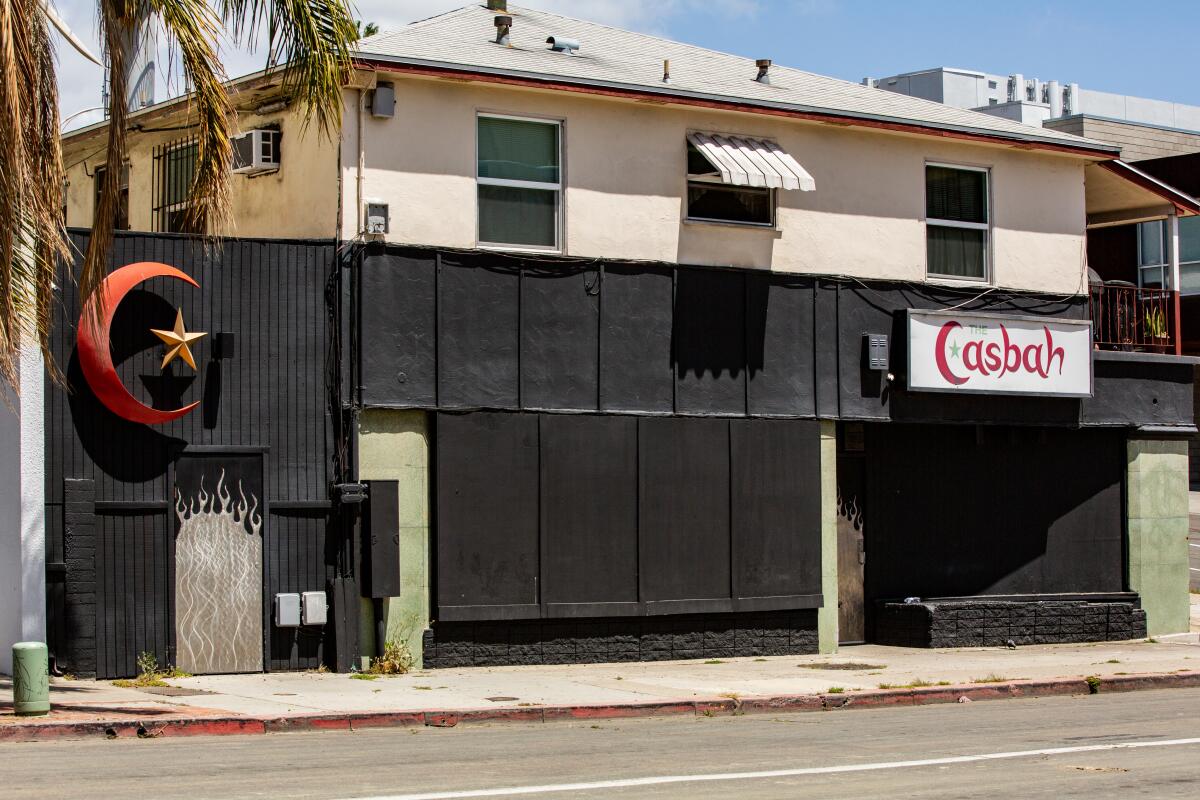
Ticket prices ‘way higher’
The only constant seemed to be that there was no constant. In some instances, the pluses and minuses were mirror images of each other.
Music fans had more concert and festival options than ever, to both their benefit and detriment, as the national median price for concert tickets jumped to $103.71 in 2022, a 19 percent increase over 2019, according to leading concert industry publication Pollstar.
The cost of admission also jumped at small venues like the 200-capacity Casbah, San Diego’s legendary alternative-rock club. It opened in 1993 and hosted such bands as Nirvana, The Killers, No Doubt and Smashing Pumpkins when they were all still cult acts.
“We had pretty good attendance in 2022, but expenses have gone up on all fronts and we haven’t raised our drink prices,” said Casbah co-owner Tim Mays.
“Ticket prices are way higher — artists are getting paid more — and we’re not doing as much walk-up (ticket sales) at the door as we used to. The dollar only spreads so far and people’s incomes haven’t risen as much as the costs of putting on shows.
“Known bands used to ask for $10 to $12 per ticket. Now, $15 is the low end and a lot of bands want to charge $18 or $20 because it costs so much more to be on the road. And if a band gets COVID or loses a well-paying anchor date in L.A. or San Francisco — which is their big payday — it can force them to cancel the whole tour.”
Belly Up Entertainment honcho Goldsmith concurred.
“There were a lot more (performance) cancellations than we saw in pre-pandemic times,” he said. “And there were a lot more challenging business negotiations on how to deal with possible cancellations because of COVID.
“That was offset by the real appetite people have to hear bands and solo artists perform live. We had a great year, probably equivalent to 2019, in terms of attendance and the artists we presented.

Humphreys owner Bartell noted that his 1,450-capacity venue’s production costs went up “modestly” in 2022, by about 10 percent to 15 percent.
“It was a great year to be in the concert business — it was concerts on steroids,” Bartell said.
“The pent-up demand to see concerts set concert attendance records for Humphreys. We had our highest median ticket sales per show, we did the greatest number of shows we have ever done in a season — 88 — and had the highest overall attendance in our history, over 100,000.”
Other San Diego area live-music companies also enjoyed profitable years in 2022.

‘An extremely crazy year’
“For us, 2022 was unlike anything anyone could ever have predicted — business for our company was up 129 percent and we added 75 employees,” said Steven Q. Evans, the founder and head of Show Imaging. His company oversees project management, design and technology for such recurring San Diego music events as CRSSD Festival and Boots in the Park, as well as for the San Diego Convention Center, Petco Park, Montana’s Under The Sky festival and more.
“It was an extremely crazy year,” Evans said. “It seemed like anybody and everybody who wanted to tour in 2022 did.”
That contention was also evidenced by how well Sound Talent Group did in 2022. The Gillespie Field-based company represents such diverse bands as Run-D.M.C., Mexican vocal star Natalia Lafourcade, Guns N’ Roses co-founder Duff McKagan, and Puerto Rican hip-hop duo Calle 13.
“Our 2022 was great,” Sound Talent co-founder Dave Shapiro said. “We had pretty much every single band on our roster touring, about 300 altogether, which is very rare. Basically, a lot of these bands were trying to make up for lost time because they hadn’t been able to tour for a couple of years.
“So, it was great for us, although it obviously came with challenges — not only with expenses increasing but with limited access to touring resources. Bands has enormous trouble finding road crews, because a lot of veteran crew people found other jobs during the shutdown and didn’t come back.
“We had several tours that nearly canceled in 2022 because we couldn’t find tour buses. In terms of attendance, things were all over the board, depending on the genre of music and the market. Venue availability was a problem because so many acts were on the road at the same time.”
All told, for live music 2022 was a roller coaster ride of dizzying highs and shuddering lows that can be credited and blamed — at least in part — on the pandemic’s ripple effects. Forecasts for 2023 range from guarded to optimistic, although most of the people interviewed for this article believe 2022’s glut of tours will level off this year.
“Many of us are contemplating what a recession might look like and how it might affect the music industry, so we’re being very cautious,” said Show Imaging’s Evans.
“There are so many unknowns and new (COVID) strains that could pop up,” mused Sound Talent Agency’s Shapiro. “My hope is things get back to somewhat normal.”
“Everyone,” concluded Humphreys owner Bartell, “has to navigate, adjust and pivot. That’s what we do. I don’t think there will be a recession in 2023. But we’ve lived through recessions before at Humphreys and those were often our best years.”

Concert costs, by the numbers
How much did expenses rise to produce live-music events in 2022? Here are some examples.
A roll of heavy-duty electrical tape: $19.99 (up from $17.79 in 2019)
Average hourly pay for a private security guard: $29.50 (up from $23.50 in 2019)
Daily rental for single speaker for outdoor festival audio system: $450-$600 (up from $150-$200 per day in 2019; the price increase reflects demand being so high that speakers now must be rented for multiple days, even if needed only for one)
Daily 5K forklift rental: $500 (up from $350 in 2019)
Weekly tour bus rental: $10,000 (up from $5,000 in 2019)
Cost of shipping a 40-foot container with LED lights from China: $21,000 (up from $2,000 in 2019)
Touring lighting board console purchase price: $60,480 (up from $48,988 in 2021)
Get U-T Arts & Culture on Thursdays
A San Diego insider’s look at what talented artists are bringing to the stage, screen, galleries and more.
You may occasionally receive promotional content from the San Diego Union-Tribune.

More from this Author

Wonderfront festival concludes with a bang, thanks to The Roots, Beck and Steel Pulse
May 13, 2024
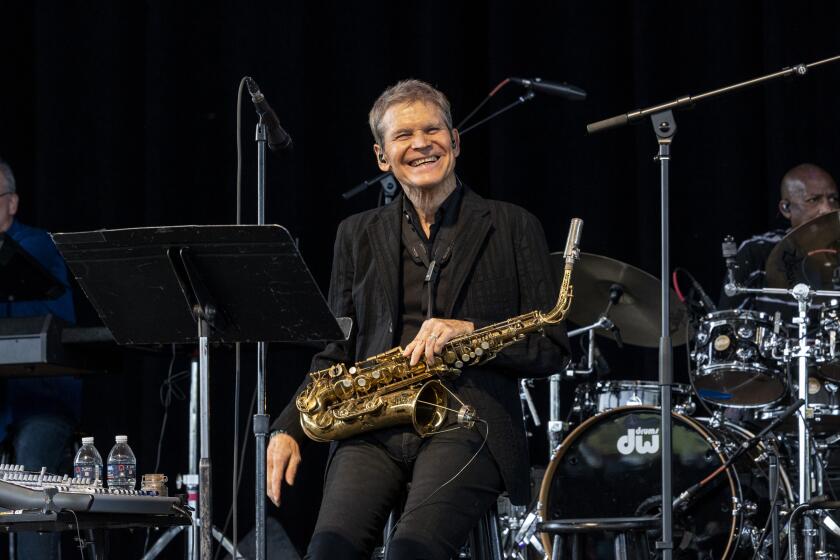
Appreciation: Sax great David Sanborn dead at 78. ‘I think people relate to a lyrical humanness in my playing,’ he said
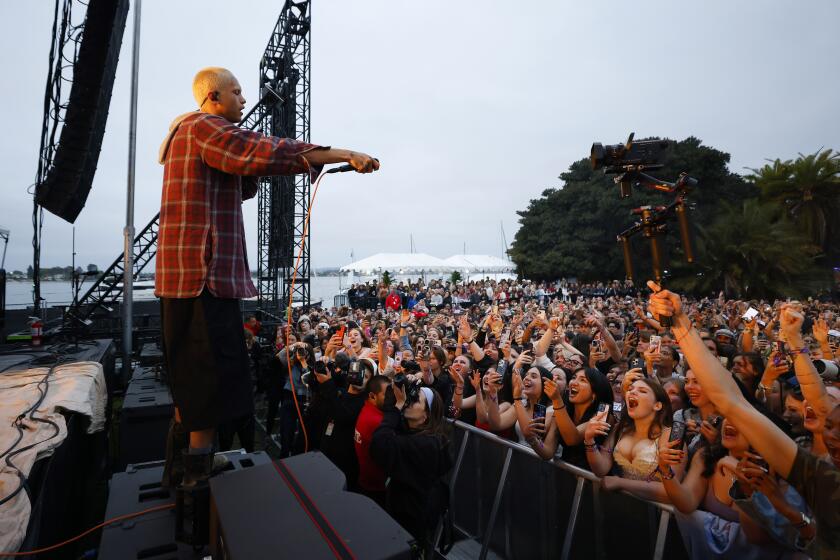
Wonderfront festival delivered the hits Saturday on a night when the San Diego Padres went scoreless
May 12, 2024

Montreal Jazz Festival a treat for music fans of multiple genres — and a bargain, with 150-plus free concerts
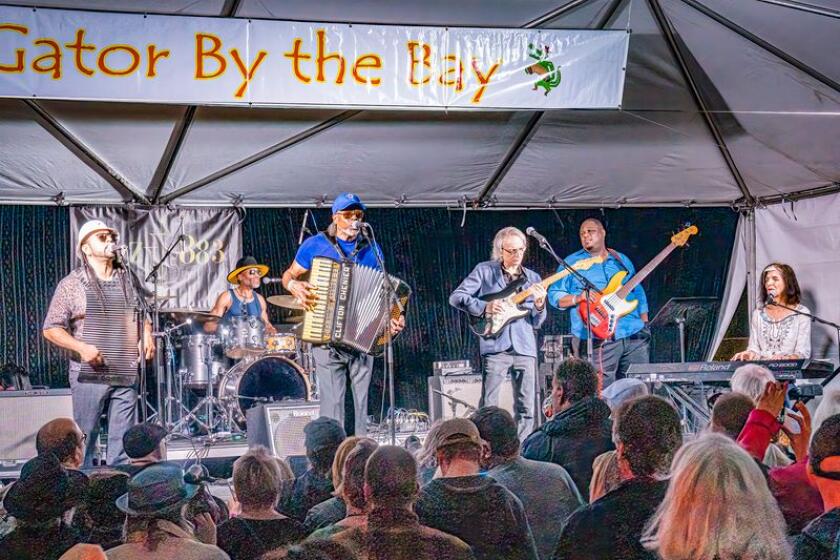
Gator by the Bay’s rousing tribute to zydeco-music giant Clifton Chenier a night to remember
May 11, 2024
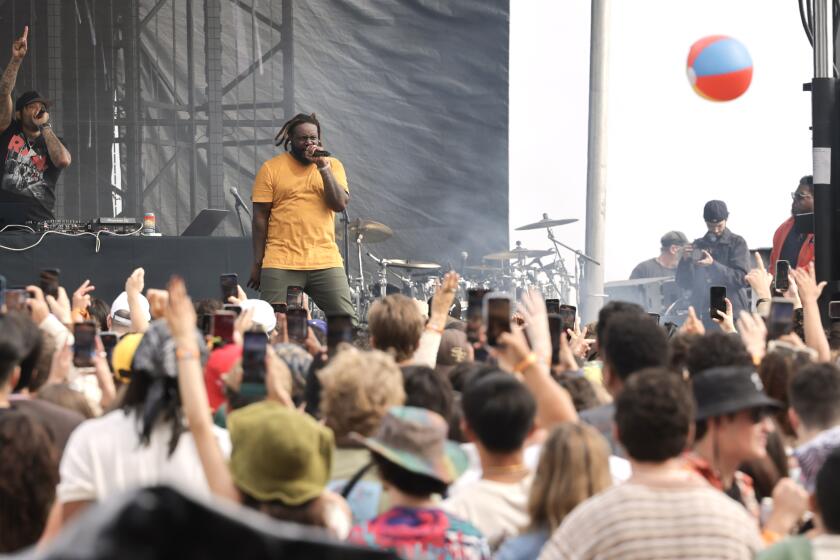
Wonderfront music festival has returned to kick off its next wave
May 10, 2024
More in this section

L.J. Playhouse musical to tell the unvarnished story of country legends Johnny Cash and June Carter Cash
La Jolla Playhouse is producing the world premiere of ‘The Ballad of Johnny and June,’ which is co-written and directed by former Playhouse chief Des McAnuff
May 19, 2024
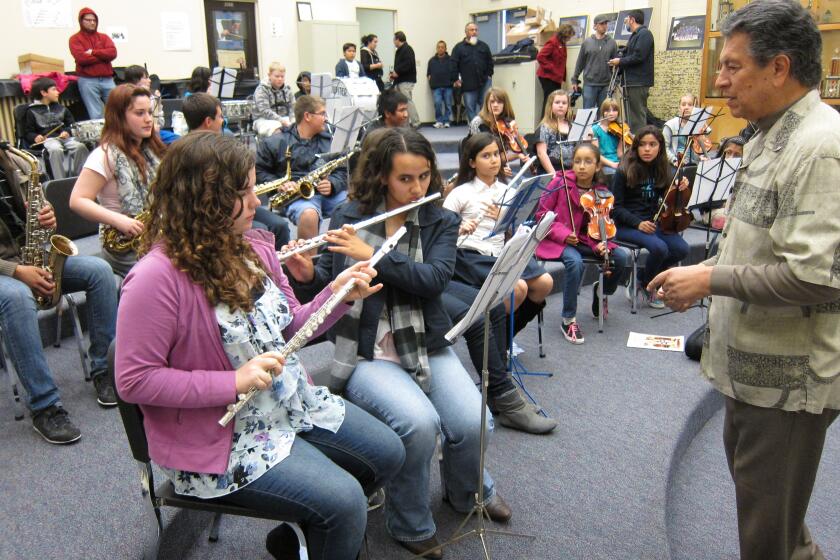
Entertainment
Arts & Culture Newsletter: Free music program for San Diego students hosts spring recital Wednesday
This week, Tanya Tucker in El Cajon, Fiesta Del Sol in Solana Beach, Hitchcock back in local cinemas and more
May 16, 2024

Les Ballets Jazz Montréal sets the music of Leonard Cohen to dance
La Jolla Music Society is presenting the ambitious Canadian dance program at the San Diego Civic Theatre on Wednesday

This weekend’s three don’t-miss San Diego-area concerts
Our picks include Rock & Roll Hall of Fame inductees the Isley Brothers at Pala, Joe Satriani and Steve Vai at Harrah’s, and the King Crimson-offshoot band Tu-NER at TERI Campus of Life
May 9, 2024

Classical Music
Review: JACK Quartet concert combined 20th century moderns with 21st century eclectics
Last-minute venue change to the Birch Aquarium proved no obstacle to the expert performances
May 8, 2024

Nation-World
Steve Albini, legendary producer for Nirvana, the Pixies and an alternative rock pioneer, dies at 61
Albini, who was prepping for a tour with his band Shellac, passed away from a heart attack on Tuesday night
$11,000 to see Taylor Swift? How concert tickets got so expensive

- Show more sharing options
- Copy Link URL Copied!
Today is the day. You called in sick to work. You’ve been looking forward to the chance to buy seats since the show was announced. The webpage loads on your laptop, and you’re met with triple-digit prices for a ticket to see your favorite musician. In the seconds you spend hesitating, the entire concert is sold out. You quickly pull up a reseller site, and the prices are now four digits and climbing.
Taylor Swift fans saw a similar scene this year, as have masses of other aspiring concertgoers. For Swift’s sold-out shows at SoFi Stadium in Inglewood next month, face-value tickets sold for $49 to $449 if you could get them. Now, first-night tickets will set you back around $800 to $11,000 each on StubHub.
How did we end up spending more than your average mortgage payment for a seat at a concert? The answer is ... complicated.
Why are concert tickets so expensive?
There are five major players influencing ticket prices for that concert you’ve been waiting to see: the artists, the promoters who put on the shows, the venues that host them, the ticketing companies that make the initial ticket sales and the resellers that sell seats no longer available from the box office.
Each link in the chain is responsible for some portion of the cost of your concert-night experience, because each link is a business trying to make a profit.
Promoters are the connection between the act and the venue. They officially set the ticket prices, and they take on the loss if the concert doesn’t generate enough ticket sales to cover what the artist has been guaranteed. They organize and publicize the shows, and those costs go into the price of the ticket.
Artists such as Swift at the top of the industry can tell the promoter where to set ticket prices and also pick the venues. Smaller acts have those decisions made for them. Bob Lefsetz , a music-industry analyst and former label executive, said the acts also have power over ticketing fees and resale policies if the primary ticket seller has its own resale platform, although they pay the ticket seller to take the heat for those decisions.
Venues are paid by promoters to put the shows on and the promoters get that money through ticket sales. Venues also may charge a facility fee, which adds to the slew of fees that show up at the end of your purchase. In addition, they may hold back tickets to offer priority access to suite owners and loyalty program members.

How Ticketmaster became the most hated name in music
Fans, politicians and even artists were complaining about Ticketmaster long before Taylor Swift filled stadiums. But experts say the anger may be misplaced.
Jan. 23, 2023
Some venues are owned by or have exclusive deals with promoters such as Live Nation Entertainment (which also owns Ticketmaster). Others are called “open buildings” that any promoter can book. Every building has a ticketing contract, however, which typically requires the ticketing company to pay in advance for the right to sell the seats. And in Lefsetz’s view, Ticketmaster is the only company that has the technology to sell tickets for high-demand events because it has cornered the market and has the money.
For the record:
1:28 p.m. Aug. 21, 2023 This article incorrectly states that Ticketmaster says it consults with artists about fees and shares the proceeds with them. The company says it consults and shares with its clients, which are the venues. Artists may share in fee revenue through the deals their tours make with the venues.
Ticketing companies add fees that can turn a $20 seat into a $35 seat ( Ticketmaster ‘s will make your head spin). Here’s the breakdown of the most common ones:
- The service fee, also known as a convenience fee, is the amount tacked on for the privilege of buying a ticket online instead of at the box office. Ticketmaster says it sets the fees with the artists’ input and typically shares the proceeds with them.
- The processing fee is the charge added to each order (not each ticket) to cover miscellaneous expenses associated with online ticketing. The Ticketmaster website says that the processing fee “offsets the costs of ticket handling, shipping and support.” If costs are lower than the processing fee, that money goes to Ticketmaster and is typically shared with the artists.
- The delivery fee is the charge for getting you the tickets you order, and it varies based on which option you select. The DIY options, such as tickets you print yourself or store in your phone, tend to be free or low-cost; not so much for having physical tickets shipped to your home. Ticketmaster acknowledges that sometimes a portion of this fee goes directly to the company.
- The facility charge is what helps the venue run the show. Ticketmaster’s website says it does not profit from this fee and does not decide how high it is. Artists decide if there is a fee and how much it is.
A 2018 report by the Government Accountability Office found that fees on initial ticket sales added 27% to the cost, on average. The lower the price of the ticket, however, the more burdensome the fees can seem.
Ticketmaster is this industry’s Goliath, but there are other ticketing agencies handling smaller venues and acts. Their common goal is to get rid of software “bots” that quickly buy tickets in bulk, raising prices for hot shows by shifting tickets to the resale market.
Resellers and ticket brokers such as StubHub and SeatGeek create a secondary market for tickets that buyers can’t — or never intended to — use themselves. Brokers compete with fans for seats in the initial sales, using teams of employees or software bots that snap up tickets faster than individuals can. In addition, the GAO’s report found that event promoters will sometimes distribute tickets through brokers “to capture a share of higher secondary market prices without the reputation risk of raising an event’s ticket prices directly.”
The GAO also said that, according to the four resellers interviewed for its report, “professional brokers represent either the majority or overwhelming majority of ticket sales on their sites.” StubHub takes issue with the GAO’s number; of the people who sold tickets through the site last year, it classifies less than 1% as brokers.
Resale prices for tickets are set by the seller, although some resale sites will suggest prices for them. And this is where ticket prices can skyrocket, because the sites don’t limit how much a seller can charge.
“This is a truly market-driven platform,” StubHub spokesperson Jessica Finn said. “So this is really about what sellers think that the price, the value of the ticket is, and what buyers think the value of the ticket is, and they effectively agree on it with a purchase.... It’s very much a dynamic marketplace, prices go up and down and we don’t meddle with that.”

You better lawyer up, Ticketmaster: Taylor Swift fans file Eras Tour lawsuit
A lawsuit filed by Taylor Swift fans accuses Ticketmaster of ‘purposefully mislead[ing] ticket purchasers’ during the Eras Tour pre-sale.
Dec. 4, 2022
Lefsetz said the secondary market sells tickets for the prices they do because that is what the tickets are worth. They wouldn’t be on sale for those prices if people didn’t buy them for that price. If they set the price too high the tickets won’t sell — for example, tickets for Adele’s Las Vegas shows sold for an average price of $1,900, compared with the average listed price of $4,800, according to StubHub.
Resellers charge a similar array of fees to ticket buyers, but they add more on average to the cost of seats than the original ticket seller’s fees do. University of Chicago professor Eric Budish, an economist who studies ticketing in the United States, found that resellers charged buyers and sellers fees amounting to 30% to 40% of the ticket resale value. “So if a Taylor Swift ticket resells for, say, $2,000, the secondary market site ... might be making 30% of that amount. Thirty percent of $2,000 is $600. Taylor Swift sold the ticket for, say, $300. So the secondary marketplace is making more than Taylor Swift is, and then the broker is making more than either of them.”
Lefsetz says people want to sit in great seats without having to pay an exorbitant price for them; instead, they think they’re entitled to sit there because of how much they love the artist. “Everyone thinks that it is only the ultra-rich who are buying four-figure concert tickets. No, there are people who are saving up. This is their favorite band!”
What are the options for the future of ticketing?
The way Budish sees it, the industry has three economically logical options moving forward.
We could continue as we are with unrestricted reselling. Tickets go on sale at the price set by the promoter and, despite repeated efforts to confine sales to actual human fans, many get bought up by bots in seconds to be sold on the secondary market. Currently, it’s hard for fans to tell how many of the venue’s seats are even being made available in the primary sale, rather than being reserved for VIPs or other special interests.
The next option is that the promoters set what is called a “market-clearing price,” that is, a price high enough to prevent the tickets from being resold for more money, but low enough to attract a full house of fans.
The market-clearing price could be thousands of dollars for prime seats to see a top act, and an artist may balk at the image that projects. But this price depends on the supply of tickets available. If artists add shows in a city where their music is popular, they can lower the price and accommodate the demand.
Ticketmaster has started trying to set market-clearing prices through a program it calls “platinum tickets,” in which it sells the most in-demand seats separately from the primary ticket offering. According to the website, platinum ticket prices are determined by the demand, with the price for hot tickets rising as the supply goes down, “similar to how airline tickets and hotel rooms are sold.”
The company says that the goal of platinum tickets is to allow artists and promoters to set ticket prices that they think reflect their true market value. But the program can generate fierce backlash from fans, as Bruce Springsteen discovered last year when platinum ticket prices skyrocketed above $4,000 .
The final option is to restrict or end resale. Options for this route would be to make tickets nontransferable, allow resale only at face value and only on the primary seller’s resale platform and use technology to attempt to identify real fans by looking for irregular behavior on their accounts. The Cure used all of these measures on their most recent tour. Lead singer Robert Smith advocated for his fans to the point that he convinced Ticketmaster to refund some of the excessively high fees on the tickets.

Free from fees? California bill combats ‘junk’ fees for everything from concert tickets to groceries
Senate Bill 478 would prohibit companies from hiding mandatory fees that lawmakers described as a “deceptive advertising practice.”
Feb. 14, 2023
What would it mean to restrict ticket resale?
A ticketing company called Dice has attempted to block the secondary market by issuing tickets only a few hours before an event and enabling customers to return unwanted tickets for resale at face value. This generates a refund only if the tickets are resold by Dice. Fans looking for tickets to a sold-out show can get on a waiting list, forming a virtual line for the next ticket made available for resale by Dice. This allows the price to stay the same and for the revenue to go to the artist and the venue.
The waiting list also shows artists what the demand is for their concerts. If there are more fans on the waiting list than the number of tickets sold, then they can add another tour date in that city.
Dice allows some tickets to be transferred from the buyer to another user of the Dice app, which opens the door to tickets being exchanged for more than face value — potentially through another platform. The company tries to prevent that, however, by using machine learning and other tools to monitor its system for “suspicious behavior,” spokesperson Joomi Park said. “If we suspect anyone is trying to cheat the system, they’re banned from Dice, it’s that simple,” Park added.
You can’t get your Taylor Swift or NBA tickets on Dice, but what would happen if this idea was implemented on a larger scale?
FIFA, the international football association, uses a similar resale process for the World Cup, offering a platform where people can sell the tickets they bought but they cannot set the price lower than 15% or exceed 110% of the original face value of the ticket. (FIFA also charges a 10% administration fee.)
So, what deters World Cup fans from going elsewhere to sell their tickets? At the 2023 men’s World Cup, it was the host country’s government: Qatar passed a law granting FIFA exclusive rights to sell World Cup tickets. According to Reuters, “hawkers caught face fines of up to 10 times the face value of the tickets being sold illegally.”
Still, fans with money have shown time and again that they’ll pay far more than the face value of a ticket to see their favorite artists, so it’s unrealistic to think that the secondary market can be eliminated. People will still resell seats under the table; the more this happens in unauthorized channels, the less protection fans will have against scams.
And there are many reasons people want the freedom to resell tickets as they see fit. StubHub’s Finn offered this example: Say you had a ticket to an Inter Miami season-opening game to see Lionel Messi play. “You’re going with your son and suddenly realize like, ‘Hey, I can actually pay for my entire set of tickets next season if I don’t go to this one starter game.’ Can you really discredit the person from trying to think that way? That’s the way the market turns. That’s not an unfair thing for them.”
The resale market is attractive to artists too. Major artists have been known to dip their toes in the secondary market by withholding tickets during the primary sale and then “reselling” them to make more money off the broken system.
In 2011, the Smoking Gun website posted a copy of Katy Perry’s rider for her world tour that year, laying out the amenities that had to be provided at each stop. One demand was that promoters hold back tickets for her team to offer through resellers.
Budish says this practice isn’t uncommon; many artists have been caught doing it. For example, in 2019, Live Nation admitted to an agreement with Metallica to hold back 88,000 tickets for the band to sell on the secondary market.

Sick of fees and bots? Maggie Rogers invites fans to buy concert tickets ‘like it’s 1965’
The artist encouraged fans to come out to their local box offices on Friday and purchase tickets for her upcoming tour, thus avoiding online fees and bots.
April 6, 2023
What are bots and can anything be done about them?
According to Queue-it , a company that helps manage high-volume website traffic, there are multiple parts in the ticket-buying process where scalpers employ bots. During ticket presales, bots can create fake accounts to circumvent buying limits, or they can even hack existing, real accounts. To get into legitimate accounts, a bot may be designed to guess passwords, which is called credential cracking . They also can use stolen passwords and apply them in bulk to ticketing websites, something called credential stuffing .
During the primary sale, people can use scraping bots to scan the internet for available tickets so they are the first to arrive at the sale. Then, they use expediting bots to buy many tickets at once.
There is even a bot that can hold tickets in its cart so it appears to fans that the tickets are sold out, inducing them to go to the secondary market. These are called denial of inventory bots .
According to a 2018 study by Distil Networks , a company that detects and mitigates bots, about 40% of the bots observed across all 180 ticketing domains were what they call “bad bots,” which are computer programs designed to cause harm.
The National Independent Venue Assn. which represents independent venues and promoters, has created a coalition called Fix the Tix that lobbies for measures to restrict bots. The coalition wants Congress to update the 2016 Better Online Ticket Sales Act to ban speculative ticket sales and expand the protections against bots used by “predatory resellers.”
A tricky aspect of making sure tickets land in the hands of fans is that artists can’t identify who their fans are. They have created fan clubs to give registered members early access to tickets, but brokers created multiple bogus registrations and bought up tickets that way. Ticketmaster attempted ensure that tickets went solely to fans with its “Verified Fan” initiative, but the company got bombarded with bots anyway.
Ticketing companies have also tried to deter bot sales by attaching an ID to a ticket that must be checked at the door. But that raises venues’ costs by requiring them to have people checking IDs, Budish said.

Will the government crack down on bots after Ticketmaster’s Taylor Swift meltdown?
Congress is asking the Federal Trade Commission if it will enforce against bots after Ticketmaster blamed them for Taylor Swift ticket-sale disaster.
Nov. 29, 2022
I need a ticket, what do I do?
If you are buying on the secondary market, use a trusted service that can verify your ticket and reimburse you if you encounter a problem.
Waiting until the last minute is a high-risk, high-reward strategy. If people price their tickets too high on the resale market, they won’t sell. (The same is true for the initial sale prices). So inevitably, buyers (and promoters) will eventually cut their prices to avoid being stuck with unsold seats — but only if there’s too much supply.
StubHub noted that interest in tickets peaks when the tickets first go on sale and sometimes right before the show. It advises fans to buy some time in between.
Compare the popularity of the act and the venue. If it is a high-demand show in a small space, prices are likely to be more expensive. Check if they are playing at any bigger venues.
Check prices on different websites to compare. If you see a price that looks too good to be true, it probably is.
Your favorite artist’s tour may be sponsored by a credit card company, which will have tickets reserved for cardholders. Leftsetz said that his credit card company reached out to him months after the Taylor Swift tickets sold out and asked if he wanted tickets. They sometimes do presales as well.
Join the fan club. If there is a fan club for an artist, it typically gets an allotment of tickets. According to the GAO, 10% to 30% of the tickets for major artists’ shows are typically reserved for presales, whether for fan clubs or other groups, although the percentage can be much higher for the biggest events.
Think about going alone. It is harder to sell single tickets, so they are likely to resell at a lower price than groups of tickets.
Know someone. Meet someone who works for the building, the act or the promoter.
Just show up at the venue on the day of the show. If the tickets that were held back during the primary sale didn’t sell, then promoters may give them to the box office to sell. Nonprofessional ticket scalpers also show up at the event and try to sell tickets there, but beware — scalping is generally illegal in California , and you may be scammed with counterfeit tickets.
About The Times Utility Journalism Team
This article is from The Times’ Utility Journalism Team. Our mission is to be essential to the lives of Southern Californians by publishing information that solves problems, answers questions and helps with decision making . We serve audiences in and around Los Angeles — including current Times subscribers and diverse communities that haven’t historically had their needs met by our coverage. How can we be useful to you and your community? Email utility (at) latimes.com or one of our journalists: Jon Healey , Ada Tseng , Jessica Roy and Karen Garcia .
More to Read

Coachella was the gold standard of music festivals. Has it lost its shine?
April 11, 2024

What is the get-in price for Dodgers home opener? Half the team’s on-sale price
March 22, 2024

Taylor Swift’s L.A. fans made SoFi concerts shake, shake, shake, Caltech-UCLA study says
March 18, 2024
The biggest entertainment stories
Get our big stories about Hollywood, film, television, music, arts, culture and more right in your inbox as soon as they publish.
You may occasionally receive promotional content from the Los Angeles Times.

Emma Fox was a 2023 summer intern on the Utility Journalism team at the Los Angeles Times. A student at Loyola Marymount University, she majors in journalism with a Chicano/Latino studies minor and was the arts and culture editor at the on-campus publication, the Lion. Fox is the president of her school’s chapters of the National Assn. of Hispanic Journalists and the Society of Professional Journalists and previously was an intern for the San Diego Voice and Viewpoint.
More From the Los Angeles Times

California is changing how big power companies charge for electricity. What to expect on your bill
May 16, 2024
7 stunning L.A. gardens where you can stop and smell the roses (quite literally!)
May 13, 2024

Science & Medicine
Do zinc products really help shorten a cold? It’s hard to say
May 10, 2024
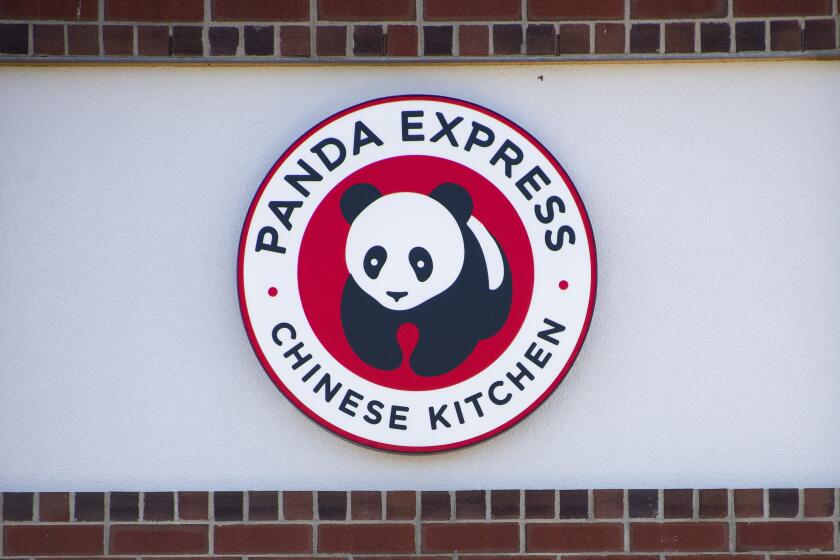
Panda Express is the latest to be hacked. What to do when your personal data are exposed
May 2, 2024

Calculating a tour budget
Hitting the road can be a wonderful way to share your music, expand your fanbase, and have amazing experiences. But when you add up all the costs, it can be pretty expensive, so you’d better make a tour budget before you book those gigs.
As we discussed in “Budgeting for your recording session,” one of the best things you can do to financially prepare for a big musical endeavor is to have a good estimate of how much each element will cost. Spending some time with a spreadsheet — even if they make your skin crawl — will be more than worth the effort.
The last thing you want is to get five dates into your tour and realize you’re running out of money — with another ten dates to go. Given that, I recommend creating a basic one-page spreadsheet with categories like the ones described below, plugging in estimated costs for each category, and then adding them up to get an idea of what your total tour price-tag might look like.
Transportation
Will you rent a van, trailer, or tour bus to get where you need to be, or will you book plane tickets? Do you think you’ll need to hire Ubers or will you be driving your own vehicle and paying for parking, gas, tolls, and general wear and tear? Regardless of the destination and mode of transport, do your best to imagine how you’re going to get you (and any band members) from here to there and tally up an estimate of the cost.
Accommodations
Successful tours have been conducted with band members crashing on fans’ floors, in plush beds in five-star hotels, and everything in between. Whether you’re looking at the Four Seasons, your cousin’s couch, or a local Airbnb, figure in the costs for yourself, band members, and any crew who will be traveling with you.
Musician fees
I’ve been on tours with my regular New York bandmates and tours where I’ve played with musicians local to the areas I’m visiting. Both can be great, but each carries its own costs. If you’re hiring musicians to travel with you, they may need higher levels of compensation to help cover time in transit — and while musicians who live in your destination city might not charge as much for the gig itself, you may have to schedule (and pay for) rehearsal time to get everyone up to speed. Regardless of how you play it, calculate the costs you’ll incur to get the bandmates you need in place and rehearsed for an amazing gig.
Phones and visas
If you’re traveling internationally, check in with your phone provider to see about charges for international calling and data. I’ve been quite happy with Verizon’s TravelPass, which, for a few extra bucks a day, lets me use my domestic calling and data plan when I’m traveling internationally. Different carriers have different options, so research yours. Plan ahead so you don’t come home to a massive cell phone bill. Also, make sure to check in with embassies and consulates when it comes to visas. You’ll want to know about any fees well before your departure date.
Seat and baggage fees
If you’re flying, check the fine print before you book plane tickets as hidden fees have become a pernicious phenomenon. Are you planning to check a road case or two as luggage? You’ll definitely want to know airline weight and size limits — and any corresponding fees — long before you head to the airport.
Do you have a custom hot-rodded Hammond B-3 that has to come on tour with you or a stack of heavy amps that define your signature sound? Whether you’re bringing bulky gear on the plane or shipping it ahead of time, make some calls, do some research, and come up with estimated costs.
Rather than shipping gear, many musicians rent what they need when they arrive at a destination. Figure into your budget not only how much it will cost to rent equipment for your tour date, but also if you’ll need to pay extra to have the gear delivered and picked up if you can’t haul it yourself. If you’re planning to borrow gear from a musician friend, calculate associated costs, like hiring a car to help get the instrument to and from the gig or buying your friend lunch as a thank you.
Estimate what you think you’ll spend each day to feed yourself on the road, whether you’re planning to dine regularly at the homes of friends, fans, and family; use the tour as an excuse to visit great local restaurants; or live off of rest-stop fare. Keep in mind that prices of food in airports, in particular, can be significantly higher than in the regular world.
Before going on any tour, I make sure the instruments and equipment I bring with me are all insured, whether I’m hauling a melodica, a synth, or a laptop I use for track playback. Instrument insurance costs are often lower than one might expect; I’ve had positive experiences with Clarion, but there are other options out there.
Incidentals
On the road, you may buy toothpaste, extra socks, or souvenirs. Incidental expenses can come up — and add up. Budget extra money to cover ancillary costs that might present themselves in the course of your tour.
Emergency fund
Maybe your car breaks down and you have to take an expensive taxi to make soundcheck on time. Or your favorite guitar splits in two and you have to rent or buy a new axe hours before downbeat. Perhaps the hard drive containing your DJ set crashes and you have to buy a whole new computer, purchase fresh software, and rebuild your tracks from scratch. Unexpected snafus happen, so budgeting some spare cash or having space to rack up emergency charges on your credit card can be a lifesaver.
Opportunity cost
Do you earn decent income giving music lessons every week? If you’re gone for a month on tour, don’t forget that’s a month’s worth of revenue you won’t be earning. While this may not be a direct expense of touring — as in, it’s not money you will be spending out of pocket for goods or services — you may choose not to include it in your spreadsheet. But any lost income or opportunities are important factors to keep in mind as you’re considering the overall cost of your tour.
If you estimate the costs associated with categories like the ones above and the total makes you want to unpack your gig bag and never think about touring again, don’t despair. There are ways to save money on the road, from sharing rides or hotel rooms to borrowing gear from friendly local musicians to tapping credit card-sourced frequent flyer miles. Individually, these may seem like small savings, but they can add up and transform a tour from financially intimidating to affordable.
Remember that, even if you hate the idea of budgeting, having even a rough projection of your tour costs ahead of time will make life easier. After all, the less energy you spend managing your bank account on the road, the more attention you can devote to playing great shows, city after city.
Disc Makers’ regular contributor Michael Gallant ’s debut trio album Completely received a four-star review from DownBeat magazine and a five-star review from Critical Jazz , which stated: “This, my friends, is the future of jazz. Fresh, invigorating, progressive – there are simply not enough positive adjectives to list here.” Learn more , download through iTunes , or purchase through CD Baby . Follow Michael on Twitter at @Michael_Gallant or on Facebook .

About Michael Gallant
1 thoughts on “ calculating a tour budget ”.
- Pingback: Six Ways To Earn Extra Money On Tour | Disc Makers Blog
Leave a Reply Cancel reply
Your email address will not be published. Required fields are marked *
Save my name, email, and website in this browser for the next time I comment.

What is the budget for a World Tour? Estimates and help with the calculation
What budget should i set aside for a world tour estimating your round-the-world budget is an essential step to be taken into account well before your departure., how much does a round-the-world tour cost, budget planning for a round-the-world trip, expenses to be planned before the round-the-world tour departure, expenses to be planned during your round-the-world trip (on site), our tips to save money during your world tour, don't plan a budget that is too small, favour continents and countries where life is cheaper., travel out of the tourist seasons, favour cheap or even free accommodation., eat local food in the street, be your own guide, travel with local transport, do not drink too much alcohol, fly low-cost, one last piece of advice: don't neglect your health and your pleasure..
- Expenses to be expected during your world tour (on site)
- Our advice to save money during your World Tour
- Don't budget too small
- Favour continents and countries where life is cheaper
- - Favour cheap or even free accommodation
- Eat local food on the street.
- Don't drink too much alcohol
- One last piece of advice: don't neglect your health and pleasure.
A trip around the world is something you prepare in advance. Even a long time in advance. You should know that few, if any, people have planned or carried out the same round-the-world trip as you have. Each round-the-world tour depends on many criteria (itinerary, lifestyle, initial budget, duration, etc...) which makes it its originality and singularity. For Travel Lovers, as a travel budget specialist, will help you to estimate and build the budget for your World Tour .
Read also: The 10 solutions for financing a world tour
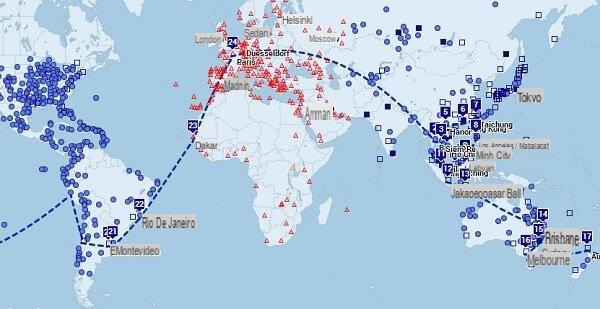
Beware of prejudices, a round-the-world trip is expensive, but everything is relative. You can choose many criteria that will allow you to make big savings and limit your expenses on the road. Once on the road, everything will depend on your choices for accommodation, food and lifestyle. But there are some expenses you can't escape. We'll tell you all about them right afterwards.
On average, a round-the-world trip costs 15,000€ for a duration of 9 to 12 months. On the internet, you will find testimonials from travellers who have done it with 10 000€, and others with 17 000€. Remember: it all depends on you. The testimonials or the post you are reading now are only there to help and guide you in your organization. Following the expenses in detail, we will show you how to save money during a world tour.
A travel budget for a round-the-world trip is divided into 2 main parts:
- 1 : expenses before departure - 2: expenses on site - en route
Think about everything you need, what you might need, what you could do without, but also what you already have.
- Visas = 200 - 250€ . Use VisaMapper to find out where you will need one.
- Equipment - Material = about 500€ . The budget depends on what you already have or not (backpack, camera, etc...).
- Travel insurance around the world = 450 - 600€. See the offers of our partner
- Vaccines = 250 - 300€.
- Round the World ticket = 3 000€ approximately . To buy your tickets separately, use a flight comparator
- Travel guide = 100 - 150€ ( not necessary)
Your pre-departure expenses can therefore vary from 4,000 to 5,000€. You will notice that the round-the-world ticket represents a large part of your budget.
On the spot, we repeat, it's up to you. But on average, it will cost you between 9,000 and 11,000€. Of course, your travel budget will be much lower if you go through Asia and South America. Keep in mind that in Europe, North America and Australia, life is much more expensive.
For Travel Lovers has created for you a travel budgeting tool that allows you to calculate your expenses on the spot in more than 200 destinations. The tool is very malleable and you can adapt your budget according to the expenses of transport, accommodation, leisure and food, as well as your type of traveller (backpack, tourist, etc...). The advantage of our calculator is that it estimates a budget per day and per person for you and only you! We don't need to give a single figure per day/person/country, it doesn't make much sense, nobody lives the same way.
The tool works in a few simple steps :

3. Select the expenses you want to include for the country in question
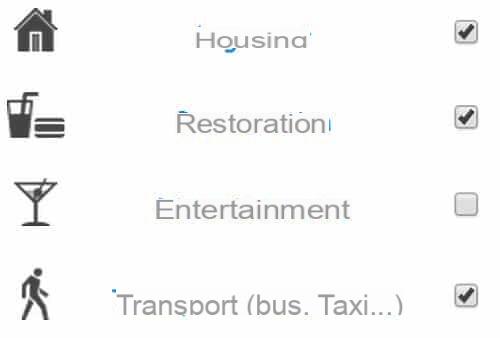
5. Discover the budget for the chosen destination with your personal criteria
You can use our tool for all the destinations of your world tour.
During your world tour, you don't know what can happen, so it's always better to be careful about expenses without depriving yourself. Here are some tips and tricks to save money during your world tour:
In the end, this advice will not save you money, on the contrary. However, it is essential to always plan a little more than the budget you set before you leave. Add a margin of about 10% to the overall budget. This will give you a safety cushion in case of a glitch, and will help you to overcome some difficulties, or to treat yourself from time to time. Don't forget that your world tour is an exceptional experience. Consider yourself lucky and make the most of every moment: don't spoil a visit or a place just because you are short of a few euros.
It's obvious. If you are looking to spend as little as possible, go to countries in Asia, Africa and South America rather than the northern hemisphere. Nature is even more beautiful, and the cost of living is lower (2 to 3 times cheaper)!
Plan your trip around the world to avoid the tourist seasons and thus the price increase.
Accommodation is the key to your travel budget. On the spot, choose small, cheap hotels, youth hostels, guesthouses, and negotiate prices. Even try to sleep in a local house. Also think about Couchsurfing.
Food will be one of the biggest budgets of your world tour . So on the spot, eat in the street (street food), in small local restaurants (bouis-bouis) and in the markets. This is often much better and above all much cheaper!
Find out what to see on the internet or in a travel guide, but avoid paying local agencies. Unless you have no choice or it is really necessary.
Take public buses or local transport (trains, buses). Avoid expensive domestic flights. If you take a taxi/tuk-tuk or other forms of transportation, negotiate and set a price before getting on.
No, this is not advice for your health, but for your budget. Alcohol and parties can quickly become a very important part of your budget. Drink only very occasionally and drink locally. A local beer in Vietnam costs only 0,60€ for example.
If you haven't taken a "round-the-world ticket", only fly with low-cost airlines. They exist today all over the world. Always use a flight comparator before booking, and play with the flexibility of your dates.
Take out insurance for your world tour, and during this one, take care of yourself as soon as necessary. Treat yourself whenever you feel like it. Otherwise, you'll regret it. Make sure that you have unforgettable memories at every stage of your trip.
Are you going on a round-the-world tour or are you planning to do so in the coming years? You have been around the world and want to share your experience with our readers? Comment on this article!
Related Items

add a comment of What is the budget for a World Tour? Estimates and help with the calculation
End of content
No more pages to load
Content for you

- Media ›
Industry-specific and extensively researched technical data (partially from exclusive partnerships). A paid subscription is required for full access.
- Average worldwide music tour admission price 2011-2019
Average ticket price for music tour concert admission from 2011 to 2019 worldwide (in U.S. dollars)
- Immediate access to 1m+ statistics
- Incl. source references
- Download as PNG, PDF, XLS, PPT
Additional Information
Show sources information Show publisher information Use Ask Statista Research Service
December 2019
2011 to 2019
based on the top 100 worldwide tours in the given period
Figures running from 2015 to 2018 were restated in 2019.
Other statistics on the topic Live Music
- Most successful music tours worldwide 2022
Leading music promoters worldwide 2020, by number of tickets sold
- Highest grossing festivals worldwide in 2019
- Most successful music tours in North America 2023, based on ticket sales

To download this statistic in XLS format you need a Statista Account
To download this statistic in PNG format you need a Statista Account
To download this statistic in PDF format you need a Statista Account
To download this statistic in PPT format you need a Statista Account
As a Premium user you get access to the detailed source references and background information about this statistic.
As a Premium user you get access to background information and details about the release of this statistic.
As soon as this statistic is updated, you will immediately be notified via e-mail.
… to incorporate the statistic into your presentation at any time.
You need at least a Starter Account to use this feature.
- Immediate access to statistics, forecasts & reports
- Usage and publication rights
- Download in various formats
You only have access to basic statistics. This statistic is not included in your account.
- Instant access to 1m statistics
- Download in XLS, PDF & PNG format
- Detailed references
Business Solutions including all features.
Statistics on " Live music in the U.S. "
- Global music industry revenue 2012-2023
- Worldwide music tour gross revenues 2011-2020
- Highest grossing worldwide music tours of all time 2019
- Number of music tour tickets sold worldwide 2011-2020
- Number of tickets sold for the highest grossing music festivals worldwide 2019
- The most successful music tours in North America in 2023
- Highest grossing music tour each year in North America 2000-2022
- Music sponsorship spending in North America 2010-2018
- Canada: total music market revenue 2011-2020
- Countries with the smallest music product sales per capita worldwide 2018
- Quarterly household spending on theater, opera, and concerts in the U.S. 2013-2022
- Share of parents taking children to a live music event U.S. 2018
- North American music and sound companies with the largest revenue in 2019
- North American music and sound companies with the most employees 2019
- U.S. retail sales of sound gear 2021, by category
- Number of events promoted by Live Nation from 2008 to 2023
- Live Nation Entertainment's concert revenue from 2008 to 2023
- Live Nation Entertainment's ticketing revenue from 2008 to 2023
- Live Nation stock and the coronavirus 2020
- Concert and movie theater attendance since the coronavirus outbreak U.S. 2020
- Coronavirus and the media: support for restricting events U.S. 2020
- Coronavirus and the media: opposition for restricting events U.S. 2020
Other statistics that may interest you Live music in the U.S.
Global market overview
- Premium Statistic Global music industry revenue 2012-2023
- Premium Statistic Worldwide music tour gross revenues 2011-2020
- Basic Statistic Most successful music tours worldwide 2022
- Basic Statistic Highest grossing worldwide music tours of all time 2019
- Premium Statistic Highest grossing festivals worldwide in 2019
- Premium Statistic Number of music tour tickets sold worldwide 2011-2020
- Premium Statistic Average worldwide music tour admission price 2011-2019
- Premium Statistic Number of tickets sold for the highest grossing music festivals worldwide 2019
North American market overview
- Basic Statistic The most successful music tours in North America in 2023
- Premium Statistic Highest grossing music tour each year in North America 2000-2022
- Basic Statistic Most successful music tours in North America 2023, based on ticket sales
- Premium Statistic Music sponsorship spending in North America 2010-2018
- Basic Statistic Canada: total music market revenue 2011-2020
- Premium Statistic Countries with the smallest music product sales per capita worldwide 2018
- Premium Statistic Quarterly household spending on theater, opera, and concerts in the U.S. 2013-2022
- Premium Statistic Share of parents taking children to a live music event U.S. 2018
Equipment and suppliers
- Premium Statistic North American music and sound companies with the largest revenue in 2019
- Premium Statistic North American music and sound companies with the most employees 2019
- Premium Statistic U.S. retail sales of sound gear 2021, by category
Live Nation
- Basic Statistic Number of events promoted by Live Nation from 2008 to 2023
- Basic Statistic Live Nation Entertainment's concert revenue from 2008 to 2023
- Basic Statistic Live Nation Entertainment's ticketing revenue from 2008 to 2023
- Premium Statistic Live Nation stock and the coronavirus 2020
- Premium Statistic Concert and movie theater attendance since the coronavirus outbreak U.S. 2020
- Premium Statistic Coronavirus and the media: support for restricting events U.S. 2020
- Premium Statistic Coronavirus and the media: opposition for restricting events U.S. 2020
Further related statistics
- Premium Statistic Highest grossing music tours of all time in North America 2017
- Premium Statistic Leading club venues worldwide 2022, by number of concert tickets sold
- Premium Statistic Concert ticket sales revenue in North America 1990-2017
- Basic Statistic Highest-grossing music festivals in Latin America 2019
- Premium Statistic Live music revenue in Spain 2016-2026, by type
- Premium Statistic Music festival ticket prices: visitor opinion in the United Kingdom (UK) 2013-2016
- Basic Statistic Number of tickets sold by the Club To Club festival in Italy 2018-2019
- Premium Statistic Average attendance per concert of main international artists tours in Spain 2019
- Basic Statistic Live Nation Entertainment's revenue from 2006 to 2023
- Premium Statistic Average attendance per concert of main national artists tours in Spain 2019
- Premium Statistic Admissions at pop music concerts in Italy 2013-2020
- Premium Statistic Average costs of classical music concerts in Italy 2006-2019
- Premium Statistic Italy: top 10 pop music concerts Q4 2017, by number of tickets sold
- Premium Statistic Italy: average costs of pop music concert tickets 2006-2015
- Premium Statistic Italy: average price admission ticket dance and concertino performances in 2012-2016
- Premium Statistic Most popular Spanish animated films based on admissions in Spain 2010-2014
- Premium Statistic Admissions' income of the National Gallery in London 2011-2023
- Premium Statistic Monthly public transport ticket price in Hungarian cities 2020
Further Content: You might find this interesting as well
- Highest grossing music tours of all time in North America 2017
- Leading club venues worldwide 2022, by number of concert tickets sold
- Concert ticket sales revenue in North America 1990-2017
- Highest-grossing music festivals in Latin America 2019
- Live music revenue in Spain 2016-2026, by type
- Music festival ticket prices: visitor opinion in the United Kingdom (UK) 2013-2016
- Number of tickets sold by the Club To Club festival in Italy 2018-2019
- Average attendance per concert of main international artists tours in Spain 2019
- Live Nation Entertainment's revenue from 2006 to 2023
- Average attendance per concert of main national artists tours in Spain 2019
- Admissions at pop music concerts in Italy 2013-2020
- Average costs of classical music concerts in Italy 2006-2019
- Italy: top 10 pop music concerts Q4 2017, by number of tickets sold
- Italy: average costs of pop music concert tickets 2006-2015
- Italy: average price admission ticket dance and concertino performances in 2012-2016
- Most popular Spanish animated films based on admissions in Spain 2010-2014
- Admissions' income of the National Gallery in London 2011-2023
- Monthly public transport ticket price in Hungarian cities 2020
Count It All: The Actual, Hard Costs of Touring

Touring is expensive . My band Enation has at times lost thousands of dollars doing it all the wrong ways. I have talked with other musicians who have had the same problems: working months to get on the road only to be met with a lot of debt at the end of the tour. You’ve probably made some amazing memories and had a lot of fun… but if touring becomes a consistent financial drain then chances are you won’t be able to sustain it.
There is one lesson that seems so basic I can’t believe we ever really needed to learn it the hard way, but we have: when planning a tour, make sure you understand ahead of time where every expense is going to come from, and be sure that your pre-determined income is at least helping you break even before you leave for the tour. Either that, or truly understand how much money you’re going to lose at the end of the day and be okay with it.
When you’re traveling, you have to figure out ahead of time how much food is going to cost, per day, per person. How much hotels are going to cost, per day. How much the airline flights, van rental, gas, and gear rental will cost, per day. If you have additional expenses like crew members or management/booking agent commissions, you’ll want to factor those expenses in, too.
It’s incredible how fast things add up.
For instance, we didn’t realize until we were less than two weeks from leaving that each third bag we checked on the airlines would be $100 per bag, per trip . That meant that on a one-way trip, if three of us had a third bag (of merch or gear or whatever), we’d be paying $300 extra! That was on top of the fees already associated with the first two bags (between $20-$35 per bag). Once we realized we had those expenses, we had to play musical chairs with our gear — figuring out what basics were needed to fly with, which things we could rent somewhere for cheaper than flying that third bag, and who would carry what bag, all in order to limit us to two bags per person, plus our carry-ons.
That small detail alone helped save us hundreds of dollars. It came from research online, looking at the fine print of the airline baggage fees. Not fun stuff, (who wants to read the details of baggage fees?) but in the long run, it was worth the extra few minutes of time.
Another example of budgeting came from doing research between companies and finding out which company had what we needed at the best price. Google and FareCompare were our best friends in that. With Google we found companies offering similar products we needed (like renting a van in New York) and then compared prices, sometimes by looking online, sometimes by calling around. We saved hundreds of dollars by not going with the first thing we found – like using Bandago instead of another higher priced van rental company, and also using Bandago for gear rental vs. SIR NY . (Note: SIR is an amazing company for many things. Located in many major US cities, they’re a tremendous resource to have. We played our showcase in Nashville there, and they had the studio/room we needed, all the gear, with tons of options, and great customer service. But for weekly backline rates, Bandago is less expensive.)
We also did budgets for different ways to get where we were going. Driving, flying, renting a bus, renting a van, one-way tickets, round-trip tickets plus bus rental, round-trip tickets plus van rental, etc. In the end, we saved thousands of dollars by researching all our options and comparing them. When we found the right means for our trip, it allowed us the best chance of being successful from our small tour before we even left home.
Once you have adequately budgeted for the entire trip, and compared different options, trying to find the most cost effective and efficient plan, then you need to make sure that your solid income will get you to (at the very least) a break even point.
For instance, when we budgeted for one trip, we realized with six weeks before the concerts that the ticket sales weren’t going to cover our expenses. We made the tough decision to reschedule those dates for later the following year, to give us more adequate time to promote them to our fans.
It wasn’t fun telling the booking agent that we needed to reschedule, and it wasn’t fun for them to tell the venues, or for us to tell our fans the news. We even had to pay an advertising ‘fee’ to one of the venues for the cost of advertising our cancelled event (that ‘fee’ came off our ticket sale income after the rescheduled event took place). However, it was within our contractual right to cancel with six weeks out, and we decided to be honest with our fans and let them know, quite frankly, the pre-sell tickets weren’t up to the minimum we needed to play.
Instead of a backlash from our fans, they took it as a personal challenge to help us get the ticket sales up so we could come to their area. We also took the opportunity to involve our fan-base in a more direct way through using the band-fan-engagement website PledgeMusic to invite our fans to help us raise funds particularly for touring that year. The response was tremendous, and knowing we had a certain amount of our hard costs covered through that campaign made the necessity for ticket sales to be higher less imperative.
Months later, with a good amount of promo on all of the usual social media and email campaigns, our ticket sales were, in some venues, almost twice as high, our expenses were covered before we left for the tour, and the trip went in the black for us within the first three shows because of a good amount of merchandise sold.
The worst thing you can do, (and I know this because we’ve done it), is not to do the mundane work of planning out every expense and offsetting it by every known (not hoped) streams of income. Just winging it with a hope and credit card is a big mistake! We have lost thousands of dollars ‘planning’ that way.
Being in a band, if it is more than a hobby to you, requires a decent amount of business sense. ‘If we continue to spend more than we make, how long is that going to be sustainable?’ is a question we should have asked ourselves sooner and probably more often. Thankfully, we are learning in time and turning the preverbal touring ship around!
Learn from our mistakes and plan your tour out in as much detail as possible. Give yourself the most likely bet for making a return on your investment – so you can continue to be the artist you were meant to be.
www.EnationMusic.com
@Enation on Twitter .
Richard Lee loves music, writing, and hoverboards — and can’t wait to buy one when they’re finally on the market in 2015.
What do you think? Leave us your comments below.

STAR COACHES - 2023 ONLINE TOUR COST ESTIMATOR
©2015 - star coaches, inc. - atlanta, ga, how much bus can i afford - 2022, step 1 of 11.
- SELECT A COACH DAILY RATE * Select one daily rate from the pull down menu... You may select from $800 / day to $1,200 / day... For most tours, our entire fleet of coaches will fall within the range of $800 - $1,200... 800 850 900 950 1,000 1,100 1,200
- YES - RENTAL TRAILER @ $150 / day
- DIESEL FUEL PRICE * Select one from the pull down menu based on the current cost of diesel fuel / gallon... Currently, we suggest between $5.50 - $6.50 / gallon... $2.50 / gallon $2.75 / gallon $3.00 / gallon $3.25 / gallon $3.50 / gallon $3.75 / gallon $4.00 / gallon $4.25 / gallon $4.50 / gallon $4.75 / gallon $5.00 / gallon $5.25 / gallon $5.50 / gallon $5.75 / gallon $6.00 / gallon $6.25 / gallon $6.50 / gallon $6.75 / gallon $7.00 / gallon $7.25 / gallon $7.50 / gallon $7.75 / gallon $8.00 / gallon
- NO TRAILER - 6MPG
- PULLING A TRAILER - 5MPG
- CREW / BAND BUS - NO TRAILER - $325
- CREW / BAND BUS - PULLING A TRAILER - $400
- ARTIST BUS - NO TRAILER - $375
- ARTIST BUS - PULLING A TRAILER - $450
- DEADHEAD MILEAGE TO PICK UP * Enter the mileage from Atlanta, GA to your pick up city...
- DEADHEAD DAYS TO PICK UP * How to determine deadhead days to pick up: Based on travel from Atlanta: Under 200 miles: 0; 200-500 miles: 1; 500-1,100 miles: 2; 1,000-1,500 miles: 3; 1,500-2,000 miles: 4; 2,000-2,500 miles: 5; 2,500-3,000 miles: 6 0 1 2 3 4 5 6
- TOUR MILEAGE * Enter the total mileage from your pick up city to your drop city... Do NOT include any deadhead mileage...
- TOTAL NUMBER OF TOUR DAYS * Enter the total number of days from the pick up date until the drop date...
- DEADHEAD MILEAGE AFTER DROP * Enter the mileage from your drop city back to Atlanta, GA...
- DEADHEAD DAYS BACK AFTER DROP * How to determine deadhead days back after drop: Based on travel back to Atlanta: Under 200 miles: 0; 200-500 miles: 1; 500-1,100 miles: 2; 1,000-1,500 miles: 3; 1,500-2,000 miles: 4; 2,000-2,500 miles: 5; 2,500-3,000 miles: 6 0 1 2 3 4 5 6
- ESTIMATED OVERDRIVES * To determine this number, look at your routing... For all drives that are 501-600 miles, factor 1 overdrive... For all drives between 601-700 miles factor 2 overdrives... Please note: Any drive longer than 10 hours will require a co-driver or the drive will need to be split up into two shorter drives...
- YES - $10,500 + $1,250
YOU'RE DONE! CHECK OUT YOUR RESULTS...
Auto-calculated weekly services.
- GENERATOR SERVICES This is the maximum number of generator services that will be performed by your driver... A generator service will take place every 100 hours of use...
- BUS WASHES & RENTAL TRAILER WASHES This is how many bus washes are suggested for your tour...
- LINEN CHANGES Your driver will clean the bus every day... Once a week, the driver will change and clean the bunk linens... This is how many interior cleanings you should expect during your tour...
AUTO-CALCULATED SUB TOTALS
- COST OF THE BUS Based on the daily rate you selected for your coach, this is how much it will cost for all deadhead days and tour days... Play around with the daily rate pull down menu as you may find you can afford "more bus"...
- DIRECTV / WIFI All of our coaches come with dual DirecTV satellite systems and WiFi units... This is the total cost of satellite and WiFi for your tour...
- MAIN ENGINE & TRANSMISSION SERVICE This number is based on mileage... We charge $.15 / mile to cover all main engine and transmission service costs...
- TOLLS / PERMITS / IFTA / DOT FEES This number represents the costs involved with all tolls, state permits, IFTA and DOT fees in both the United States and Canada... We incorporate devices and transponders in each coach to manage the costs, documentation, and compliance with all tolls and permitting...
- MANAGEMENT / ADMINISTRATIVE FEES This line item reflects a 4% Management / Administrative Fee based on the coach daily rate and trailer rental fee to help offset the increased cost of insurance, parts and labor...
- END OF TOUR CLEANING FEES This number reflects what you will pay to have the coach cleaned, steam cleaned, all linens changed, final bus wash, and final generator service after your tour...
- TOTAL FUEL COST While it is one of the three big costs of touring, it is also the big variable... This number is clearly an estimate, so remember to shoot a little high on your fuel price selection... Anyhow, this number, based on your mileage inputs, selections for fuel pricing and MPG, will give you a credible estimate of your fuel costs for the tour, including all deadhead fuel costs...
- DRIVER BASE PAY This number represents how much your driver will cost for his daily base pay for your tour... Weekly services, overdrives, etc. are not included in this number, but are listed below as separate line items...
- DRIVER OVERDRIVES Here we have your projected overdrives based on what you entered... Each overdrive is equal to the driver's daily rate of $325, $375, $400 or $450...
- DRIVER WEEKLY SERVICES This number is a total of all the driver's weekly services... It includes all generator services, interior cleanings and suggested bus / trailer washes...
- DRIVER PER DIEM Most of the time, drivers are not able to eat at normal times, or when catering is provided because of their odd work / sleep schedule... Therefore we include driver per diem in our proposals and contracts... It is set at a rate of $55 / day...
- DRIVER HOTEL BUYOUTS (DEADHEAD) If your tour has deadhead on the front or back, the driver will more than likely incur "hotel buyouts" during that deadhead travel... Hotel buyouts are used to compensate / reimburse a driver for sleep breaks during deadhead... The rate for each hotel buyout is $150, and it is auto-calculated based on the number of deadhead days you entered...
- PAYROLL FEES (25%) Taxes, taxes, taxes... This is the fee that our payroll company charges for all the driver's federal, state and local payroll taxes, along with worker's comp insurance and unemployment insurance... It is set at 25% of all earnings that are handled "in lease" if you go to contract... Call Don Neuen at Star Coaches to see how you can lower this cost by simply paying some of the driver costs on the road...
- DRIVER HOTEL ROOMS Drivers require a hotel room each day of the tour... While this expense is always handled out of the road, we believe it is important to list this significant touring expense... That is why we suggest factoring in $200 / day for budgetary purposes...
- RENTAL TRAILER Rental trailers cost $150 / day... This number reflects the cost of a rental trailer for your tour...
- MISC. ROAD EXPENSES While on tour, you will need to purchase various items for the bus such as cleaning supplies, toilet chemicals, paper towels, etc... This number also factors in the cost for estimated Uber rides for the Driver back and forth to his / her hotel. While this is a small expense, it is an expense nevertheless, therefore, to create an accurate budget, we feel it should be factored into the equation...
TOTAL COST OF THE BUS & DAILY AVERAGE
- ESTIMATED BUS RELATED COSTS This number represents the total of all bus related costs...
- AVERAGE BUS RELATED COSTS PER DAY This number represents the average cost per day for all bus related costs...
TOTAL COST OF THE DRIVER & DAILY AVERAGE
- ESTIMATED DRIVER RELATED COSTS This number represents the total of all driver related costs...
- AVERAGE DRIVER COSTS PER DAY This number represents the average cost per day for all driver related costs...
TOTAL COST OF ESTIMATED FUEL & DAILY AVERAGE
- ESTIMATED FUEL RELATED COSTS This number represents the total of all fuel related costs...
- AVERAGE FUEL COSTS PER DAY This number represents the average cost per day for all fuel related costs...
TOTAL COST OF TRAILER / MISC. ROAD EXPENSES / EXTERIOR WRAP
- ESTIMATED TRAILER / MISC. ROAD EXPENSES / EXTERIOR WRAP COSTS This number represents the total of all trailer, misc. road expenses, and exterior promotional wrap related costs...
- AVERAGE ESTIMATED TRAILER / MISC. / EXTERIOR WRAP COSTS PER DAY This number represents the average cost per day for all fuel related costs...
GRAND TOTAL / AVERAGE DAILY COST
- GRAND TOTAL The BIG number... This is the estimated grand total based on the data you entered for your tour...
- AVERAGE COST / DAY And this number reflects the average daily cost... It is important to understand that with the Star Coaches Tour Cost Estimator, we leave no stone unturned... These are real costs... You can now compare a Star Coaches proposal to other entertainer coach companies... If there is a substantial difference, they have left something out of their proposal... And just because it was left out of a proposal, dosn't mean you won't incur the cost on the road... You will...
COST PERCENTAGE ANALYSIS
- COST %: COACH
- COST %: DRIVER
- COST %: FUEL
- COST %: TRAILER / MISC. ROAD EXPENSES / EXTERIOR WRAP
MILEAGE STATS
- TOTAL MILEAGE How many total miles, including deadhead will your tour log? This is the number...
- AVERAGE MILEAGE / DAY How many miles a day does your tour average? This number is your average daily mileage... If you're tour is costing you more than normal, more than likely, this number is higher than before... The bottom line is that the higher the average daily mileage, the higher the overall cost will be... If your average daily mileage is close to 400 miles a day, it is time to have a discussion with your booking agent to bring the routing back into line...
We are pleased to offer you the 2023 Star Coaches Online Tour Cost Estimator!
Since January 2016, this exclusive and invaluable tool has been used more than 53,000 times by Tour Managers, Band Managers, and Business Managers to research for themselves the true cost of touring in an entertainer coach...
Only Star Coaches offers such an online experience!
Only Star Coaches offers complete transparency!
Only Star Coaches offers you this budgeting advantage!
Now YOU can enter variables into a form and calculate approximately how much it will cost to lease various entertainer coaches for your next tour.
Here is what you'll need to get started:
a) your tour itinerary with mileage...
b) the distance from our home base in Atlanta, GA to your pick up city...
c) the distance from your drop city back to our home base in Atlanta, GA...
d) an estimated number of overdrives
Now YOU can see how much bus your budget will allow... Experiment with different logistical scenarios...
This online feature will give you a very good idea of the estimated cost you will incur on your next tour...
Once you have played around with the possibilities, then have Don Neuen prepare a formal proposal based on your findings... More than likely, he will figure out how to save you more money, or get you more bus for your budget than you anticipated...
Here's the bottom line: No other coach company offers this level of client interaction... No other coach company is more transparent...
COMMON DEADHEAD MILEAGE CHART
Below is a chart with our most common pick up / drop cities, the mileage from Atlanta, and normal deadhead days charged:
Albuquerque, NM - 1,412 miles / 3 days
Austin, TX - 988 miles / 2 days
Baltimore, MD - 716 miles / 2 days
Birmingham, AL - 163 miles / no deadhead
Boise, ID - 2,196 miles / 4 days
Boston, MA - 1,128 miles / 2 days
Charlotte, NC - 287 miles / 0-1 day
Charlottesville, VA - 539 miles / 1 day
Chicago, IL - 738 miles / 2 days
Cincinnati, OH - 480 miles / 1 day
Cleveland, OH - 737 miles / 2 days
Columbia, SC - 253 miles / 0-1 day
Dallas, TX - 802 miles / 2 days
Denver, CO - 1,418 miles / 3 days
Detroit, MI - 739 miles / 2 days
El Paso, TX - 1,436 miles / 3 days
Houston, TX - 814 miles / 2 days
Indianapolis, IN - 554 miles / 1 day
Jacksonville, FL - 377 miles / 1 day
Kansas City, MO - 823 miles / 2 days
Knoxville, TN - 218 miles / 0-1 day
Las Vegas, NV - 2,007 miles / 4 days
Los Angeles, CA - 2,206 miles / 4 days
Madison, WI - 887 miles / 2 days
Memphis, TN - 401 miles / 1 day
Miami, FL - 695 miles / 2 days
Middletown, NY - 938 miles / 2 days
Minneapolis, MN - 1,149 miles / 2 days
Montreal, QC - 1,248 miles / 3 days
Nashville, TN - 268 / 0-1 day
New Orleans, LA - 491 miles / 1 day
New York, NY - 929 miles / 2 days
Newark, NJ - 904 miles / 2 days
Oklahoma City, OK - 870 miles / 2 days
Orlando, FL - 491 miles / 1 day
Phoenix, AZ - 1,846 miles / 3 days
Philadelphia, PA - 814 miles / 2 days
Pittsburgh, PA - 716 miles / 2 days
Portland, OR - 2,622 miles / 5 days
Richmond, VA - 563 miles / 1 day
San Diego, CA - 2,159 miles / 4 days
San Francisco, CA - 2,494 miles / 5 days
Salt Lake City, UT - 1,900 miles / 4 days
Seattle, WA - 2,715 miles / 6 days
Spokane, WA - 2,437 miles / 5 days
St. Louis, MO - 573 miles / 1 day
Tampa, FL - 487 miles / 1 day
Toronto, ON - 970 miles / 2 days
Tulsa, OK - 805 miles / 2 days
Vancouver, BC - 2,851 miles / 6 days
Washington, DC - 670 miles / 2 days
Winston Salem, NC - 348 miles / 1 day
A Little RTW Budget… How Much Does it Cost to Travel the World for a Year? (2024)
Last updated on January 4, 2024 by Shannon
When I left on my first round the world trip, I asked veteran travelers a key question: How much does it cost to travel around the world ?
It was the single biggest factor impacting my trip length and destinations, and the number of things that impact a long-term travel budget are far different than a two-week European vacation.
Estimates varied wildly, and knowing where my own around the world trip would fall in that spectrum was a great unknown. I had no idea how long my travel savings , my freelance income , and travel blogging to would keep me on the road, so over that first year, I tracked every single dollar I spent while traveling.
Since that first around the world travel, I’ve spent more than a decade of traveling, and budgeting for short- and long-term around the world travel is my specialty. My upbringing was modest , yet I was still able to save the money to travel and work remotely for all 15+ years of my world travels.
Table of Contents
Breaking Down the Cost of World Travel
Let’s dive into a very detailed breakdown of what it costs to actually travel around the world for one-year trip —the hard costs associated with around the world travel, and the factors that most dramatically impact your travel budget.
I’ve included some notes on the impact of the Covid pandemic on costs that are likely here to stay—from the dramatic inflation hitting the U.S. and the UK to increased costs at hotels as many of them make permanent their increased sanitation measures.
How Much Does Traveling the World Cost?
Generally, $20,000 is the baseline cost for a trip around the world for one person for one year. This estimation falls in line with popular recommendations that budget travelers can spend an average of $50 a day on the road, and allows additional budget for flights and vaccines.
You’ll spend up to $30,000 for a budget trip that includes fewer hostels, and more upscale accommodation, transport, or food. Traveling as a couple or family does not directly double/triple/ etc the costs because lodging and transport are shared expenses.
As you’ll see in the detailed trip budgets below, world travel costs for mid-range to budget-luxury world travelers can run as much as $50,000—or much more!
My Personal Round the World Trip
On my first RTW trip, I traveled around the world for for 328 days (11 months) through 15 countries and I spent USD $17,985 .
Then I decided to keep traveling. I’ve been on the road since 2008, still “traveling” as of 2024, although from my home base in Barcelona, Spain .
In the years since I originally posted my cost breakdown for world travel, other backpackers have loved the precise and meticulous details of just how much I spent throughout a year of active world travel. And even with rising global food costs a decade later, people still travel on similar budgets —yes, so many elements impact travel costs that you can still travel the world for the same price as a trip 15 years ago (more on how that’s possible later).
Let’s dive into the good stuff. The following tables and charts further outline my around the world trip costs including the country-by-country expenses and budget.
Just want the cold hard costs? Navigate my Google spreadsheet by the countries listed at the bottom of my full World Travel Budget .
My Total Costs to Travel the World for a Year
My final costs of $17,985 for the nearly year of world travel completely include of everything from getting jabbed in the arm for my Yellow Fever vaccine to buying all of my pre-travel gear , my travel insurance , all of my plane flights , bus rides , camel safaris , and surfing lessons , and straight through to my first delicious sub back on home soil when I passed through Philly on my final layover.
What does that number not include?
Some personal choices upped the cost of my round the world trip: an external hard drive for photo storage, a new camera (old one was waterlogged in Australia ), and a rental car splurge in Ireland . My personal total, inclusive of all of that, was just under $19,000 … so it’s still a bargain considering I was on the road for nearly an entire year.
In the above category breakdowns, consider:
- Lodging includes all accommodation; I couchsurfed in a few countries and stayed with friends a couple of times.
- Food includes everything from three meals a day to snacks, and funding for my chocolate obsession.
- Entertainment covers going out on the town, sharing beers with friends—this will be much higher if you drink often. My budget was for drinking on average once a week.
- Activities includes my volunteer program in Nepal, and all tours, trips, and group adventures—everything from diving to ziplining to visiting temples and museums .
- Transportation excludes flights, but covers all intra-country transportation like buses, trains, taxis, and tuk-tuks.
- Misc is a catch-all and a large portion of costs there came from paying for fast internet—it was pricey to make sure I had a strong connection for my work. It also includes shipping things home, gifts, and toiletries along the way.
- Flights includes puddle-jumper little flights between countries in the same region—I did not use a RTW ticket, but instead booked along the way ( here’s why ).
Budget of Daily & Total Costs Per Country
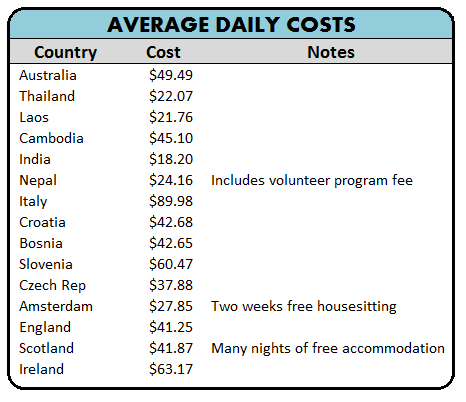
Don’t forget to check out my well-loved Travel Planning Resources .
And consider using the blank, formatted spreadsheet to log your own RTW travel budget (this is a Google Spreadsheet, either save a copy of this to your own Google drive for editing, or download as an excel file!).
How Much Will Your Dream Trip Cost?
Finding a way to travel the world is a mental obstacle as much as a financial one. Every situation is different, but I believe that if you truly prioritize travel, then it’s possible to plan and execute an around the world trip. The problem is, there’s crappy information out there about how to make it happen—just as many bloggers don’t really share straight costs to travel the world. Many bloggers have shared posts with a handful of tips about how much they saved for their dream trip, but they don’t break down how they arrived at that final figure. You may read this information and see my budget, but it leaves you wondering if your own world travels would cost the same.
For that reason, I wrote two entire guides to address your current hurdle. One is about creating a realistic anticipated budget for your trip. The other is about saving for world travel.
How much will your dream trip cost? I wrote this guide to specifically answer the most common question I was emailed by readers: how much will a specific route/itinerary costs.
In it, I share comprehensive and thoroughly practical advice about understanding trip budgets and understanding your own style of travel.
The guide is a full treatise on how to estimate what your dream trip will cost and it includes case studies from other long-term travelers who tracked their trip budgets.
I spent ten years on the road, and nearly that long talking with with other travelers about how they budget for travel. Using the aggregate of their knowledge and experience, I’ve outlined a road-map to taking a long-term trip.
I wrote this guide to empower travelers and travel dreamers anywhere in the world with the tools to plan their trip. The guide breaks down average traveling costs for the world’s most traveled destinations, which you can use with the fully customizable Trip Budget Worksheet to create an accurate anticipated budget for your dream trip. Available on Kindle, ePub, and PDF .
True wealth is having the freedom to do what you want with your life. Many travel dreamers get waylaid by the financial side of life.
If you’re new to personal finance, or lost about how to start saving for a big goal, this book distills hard-learned information into easily actionable steps specifically targeted at giving travel dreamers tools to become financially literate.
This book provides a thorough deep-dive into the principles of saving money, common obstacles, overcoming debt, and the tenets of strong personal finance. It offers a streamlined process to create substantial changes in your financial life.
If money is your primary obstacle to leaving on a long-term trip, this guide breaks down exactly the shifts you can make to change your financial situation.
Many travelers look at my adventures and experiences these past 12 years that I’ve traveled and they dream of also traveling through the cultures, stories, and conversations. This guide gives you the tools to move the needle from dreaming to doing. Available on Amazon Kindle or as a PDF bundle with the budget book .
How to Decide on Your Final World Travel Budget?
Travel was my bootcamp for life. My around the world trip was the single best investment in both my personal growth and my career. Throughout life we are presented with a series of choices—each has the ability to help us create the life we dream of living. I am forever glad I chose to travel our beautiful world. ~ Shannon O’Donnell
Creating an accurate anticipated budget for your world tour is an important step—you certainly don’t want to plan for a year but run out of funds in month eight! Each person has different goals, a unique world trip itinerary , and differing travel styles. These factors can create significant differences in the total cost of a round the world trip.
Assess How Much You’ve Saved for World Travel
A round the world trip is not as expensive as you assume. Most anyone reading this post has the ability to save for travel if it’s a true priority. My family is quite poor and I put myself through college with merit-based scholarships. Instead of counting on help from family, I budgeted for the trip, and I traveled with the budget I had—not the one I wish I had.
Before leaving, I purged everything I owned and saved ruthlessly in the countdown months. When calculating if I could afford my trip around the world, I even accounted for my student-loan and medical credit debt repayments (because yes, I was actually in a fair bit of debt ). I took on side-hustles to sock away money. And then I worked on freelance SEO remotely for the entire year.
Compared to my life in LA, where $1,200+ went toward rent and bills each month, I used that same online income to travel the world, digging into my small savings for my travel gear and long-haul flights . I wasn’t sure how much my trip would cost when I left to travel, and the information just wasn’t out there like it is now.
Now you can play with your travel route and your travel style and come up with a tally in just a few hours for what your dream trip will cost. In fact, I believe so much that world travel is affordable that I wrote a budget guide and spreadsheet to help you price out your dream trip and have all the possible resources you need at your fingertips.
Decide Your Route & Speed Around the World
This is the single biggest indicator of how much world travel will cost. Slow overland travel lowers costs, and you can minimize the number of flights needed.
To save money, also consider visiting fewer places. Every travel dreamer over-packs their around the world route. You surely have a dream list, but unless you have unlimited funds, then you should scale back the number of regions/countries that you will visit.
When I first planned my trip, a long-term traveler advised me to cut five countries from my itinerary. Looking back now, I can’t even imagine where they would have fit! It’s my route and speed that allowed me to travel for under $20K.
Read: How to Plan an Around the World Itinerary in 8 Steps
Determine the Types of Countries You’ll Visit
If you add in developed countries like Europe, Japan, Australia, and the United States, your daily budget will double. Instead of spending $25 per day in SEA and India, you will average $75 to $100 per day in most developed countries.
For that reason, weight your trip in favor of developing regions of the world. Save Europe or the U.S. for a shorter trip later in life, and add a few off-beat locations to your planned route—these are most often the sleeper-favorites by the end of your RTW trip.
If You’ll Eat Local Food, Street Foods, & Shop in Markets
How you eat on your travels impacts your bottom line. Eat locally from mom and pop restaurants, and sample eats from street food stalls. Contrary to many assumptions from first glance, these locations are perfectly safe so long as you adhere to a few standard food safety practices.
Local food is a window into the culture, so dig deep and eat like the locals, asking the vendors questions and learning more about each country’s food peculiarities. Also, when traveling in Western countries, shop for groceries and prepare your own breakfast at the very least.
Read: How to Eat Street Food Without Getting Sick and buy the Food Traveler’s Handbook to learn even more about safely enjoying street eats
Factoring Covid and the Pandemic into you Round the World Trip
The fact is, although wealthier and Western countries have moved on from the pandemic, this is not case in all countries. Vaccine iniquities and underdeveloped healthcare systems mean that many countries struggled for years.
If you’re planning world travels, be prepared increased costs to test or meet Covid requirements if another strain were to pop up during your travels. What might this look like:
- Some countries may suddenly re-close to travelers from certain countries.
- Some countries will continue to require proof of vaccination before entering (this may last for years given that proof of vaccination is already required for other illnesses, namely Yellow Fever).
- Travelers may be forced to quarantine, sometimes unexpectedly if you test positive, and this may take place in government-run hotels that cost quite a lot.
- Crossing land borders could be pricier than anticipated—for the three years of Covid, the land border between Belize and Mexico cost ~$225 to cross , and it usually costs about $20.
- Travel insurance companies are now mostly considering Covid endemic , but that can change as official travel warning levels change in your home country. Buy your travel insurance with care.
In short, assess the trip you have planned, and read up on Covid policies. Where you choose to travel should likely remain fluid once you set out so you can adapt on the road.
Note that budgets and guides give clear examples of how travelers can truly spend on average $50 per day on average to travel the world. And using the tips above, you can lower these figures even more, if needed.
You could likely travel with as little as US $12,000 per year if you stick to one region—overland for a year from Mexico to Argentina; or overland through China, Southeast Asia , and India.
The price of a budget trip jumps to US $25,000 to visit many regions rapidly. If you prefer mid-range accommodations, that might increase your expenses by $10,000; same goes if you’re prone to splurging on expensive extras like helicopter rides, diving, and adventure activities.
The bottom line : Understand your route, travel style, and goals before you can develop an accurate anticipated budget for travel.
Recommended Next Steps
It’s easy to see the numbers, be inspired for a bit and then never take action. If you’re actively planning your RTW—fantastic! My site and those of my friends contain every essential resource you need to plan world travel .
If you’re currently working, studying, or just dreaming of traveling, I have resources for you as well. And if you want a second look at those spreadsheets, visit my full RTW budget as a Google Document that will open in your browser.
Or head to the free blank spreadsheet to track your own expenses as you travel around the world . You can save an editable copy of these to your own Google Drive, or download for your own use.
Eight Steps of Planning a World Trip
- Save for Travel & Eliminate Debt
- Build a Realistic Trip Budget
- Plan Your Around the World Trip Itinerary
- Pick the Right Travel Insurance
- Pack for Long-Term World Travel
- Work Remotely While You Travel
- Stay Healthy on the Road
- Browse Free Destination Guides
Resources & Further Research
World travel budgets.
- ALA readers Jesse and Ally sent me their couples budget for a trip that ended in late 2019—they came in at $38.2K for two people for 342 days traveling through everywhere from South America (Peru, Bolivia, Chile, Argentina) to Southeast, South Asia, and even Japan. They didn’t sacrifice on fun RTW trip activities: They hiked Machu Picchu, toured the desert in Morocco, did scuba diving here and there, and more.
- A mid-range couples budget of shared expenses for a year came in just under $20K per person .
- A meticulously detailed couples backpackers budget came in at $36,532 (an even $50 a day).
- A solo male traveler for two years on the road averaged about $20K per year .
- A list of travel budgets by region of the world .
Books to Read First
- How to Travel the World on $50 a Day . Published by Penguin and now in its second edition, it shows you how to stick to a budget while you’re traveling. It’s an guide for travelers new to budgeting on the road and weighs heavily toward backpacker-style travel with basic tips and hacks to save money by using travel cards, points, etc.
- A few of my favorite travel books include: The Geography of Bliss , Wild , A Thousand Splendid Suns , The Great Railway Bazaar , and Behind the Beautiful Forevers .
- My two low-cost guides designed for world travelers include How to Save for Travel and How Much Will Your Dream RTW Trip Cost?
On-the-Road Travel Resources
- ALA Travel Guides share comprehensive information on what to know before you go in each new destination.
- Grassroots Volunteering is ALA’s sister site, offering a database of responsible travel companies and volunteer experiences all over the world, as well as Responsible Travel Guides about how to use travel as a force for good.
- Cost of Living Guides show you how affordable it is might be to live outside your home country. You can sometimes elongate world travels by months or years by stopping in these affordable locations.
Working on the Road
- How to Start a Travel Blog : Record the highs and lows of your once in a lifetime trip. This no-nonsense page details the process and won’t upsell you on any courses you likely don’t need. Just basic facts of how to start your first blog, and maybe even make some money along the way.
- Finding Freelance Work for Digital Nomads . Since money is a huge factor for many travelers, this resource page thoroughly covers remote work—something I’ve been doing since 2005.
I truly believe that world travel is possible for most people. When and how is unique to each person, but by prioritizing and planning travel, you can make an around the world trip possible.
Essential Travel Planning Resources
❗ Yes, you need travel insurance . IMG Global is the travel insurance I’ve used for well over a decade of traveling solo, and with kids. Here’s why .
🧳 Smart packing can save your trip. Shop my favorite travel gear , including all of the packing essentials for world travel , gear to keep you safe on the road, my favorite travel books , and more.
🛏️ Find great accommodation . Booking.com is essentially the only hotel booking site that I use. It has a wide and affordable selection of traditional hotels, but also hostels and vacation rentals, too. Use these pro tips to find the best travel accommodation .
📍 Navigate more effectively. Rome2Rio is super handy to assess the full range of transport options between two cities—shows everything from flights to trains, buses, minibuses, and more. If you’re booking a rental car, I’ve always found the best deals on RentalCars.com .
✈️ Book affordable flights. Expedia is one of the first places I look for low-cost flights .
☕ Peruse all of my tips for round the world travel , or learn how to move and live abroad .
391 thoughts on “A Little RTW Budget… How Much Does it Cost to Travel the World for a Year? (2024)”
Can you recommend a travel insurance provider?
I recommend IMG Global for most world travelers. Here’s my full rundown .
The best way to experience seamless travel through breathtaking landscapes is Gothenburg to Oslo train route.
Hi there, great article, thanks, very very helpful. I also do these things when travelling on a budget: 1. Try to find the fee-free and low-fee ATMs in a foreign country. 2. Get fee-free cards from home 3. Avoid withdrawing cash from credit cards as the cash advance fee is very high 4. Withdraw maximum amount ATM gives me 5. Book directly with hostels/hotels to avoid extra commissions
Do you offer personal help/training on this?
I don’t see how you can possibly only send that amount on accommodation. That works to only $8.50 a night. You’d have to be staying in some very skanky bed bug ridden dives for that amount.
The you clearly didn’t read everything. I couchsurfed, I had accommodation included in the fee for my volunteer experience in Nepal (so that month is not included in the accommodation line-item), and I also met many travelers early in my travels who hosted me later in my travels when I passed through Europe. Plus, shared dorms are pretty cheap outside of the US, Europe, Australia, Japan, and the like. Guesthouses truly do cost about $15 a night split between two if you travel with someone. Think a bit more creatively rather than trolling and you’ll get there. fwiw, I have never gotten bed bugs in 15+ years, so I’m doing something right, and I’ve met travelers who got them at 5-star resorts, so price isn’t always an indicator of cleanliness my friend, and you’d be wise to note that if you travel in developing countries.
This sounds about right. My partner and I travel half the year every year and I budget (In CAD which I’ll put today’s USD exhange rates for) 2200 CAD/1,650 USD a month for flights and accomodation (I know it’s weird to combine these, but I sold my partner on travelling by telling him that I could make all the flights and hotels add up to the same as our rent in Toronto, Canada and that’s stuck – so the more I spend on a flight, the cheaper I try to find accomodation for that month)
1400 CAD/1050 USD a month for food (a mix of groceries and eating out. Drinks we have with meals count in this category)
800 CAD/600 USD a month for activities (Going out for drinks counts in this category, as does public transit)
Bringing our total to 4400/month or $26,400 for dix months for two people. (3300 USD/month, 19800 USD) So if we did the whole year we’d be close to 39,000 USD.
That said I also usually spend another 500-600 on clothing because I love to shop – but I don’t consider that part of the travel budget.
Believe it or not – I actually spend more when I stay home in Toronto the other half of the year than I do while travelling. Food in Toronto, Canada is really expensive – as is alcohol – as is entertainment. Tho in fairness I do live on a boat on the Toronto Islands, but it works out to costing similar to rent for a two bedroom apartment downtown.
Anyways, thanks for sharing!
Very informative, Thanks for the share.
Came across your blog, I was wondering what current costs were. I travelled for a year in 2015 with about $9k, so today that would be a bit over $11k. I did a mix of hostels, nice hotels (usually thru mistake rates, or points), backpacking (ie camping), and some volunteering for room/board (I think 6 or 7 weeks total). Mix of cheap places like in parts of SEA and also expensive places like Japan, Pacific Islands, or Europe for instance. I didn’t include pre-travel purchases though for gear. Another perspective, anyway!
Great breakdown, thanks!
Thank you for sharing so much of your information! I am just starting to think about our retirement travel, which is still several years off. This information is so wonderful to review for those of us who have a dream of travelling throughout the world and are in the planning stages. I hope you are able to continue to follow your dreams.
Good luck with the planning—this past year has been a bad one for traveling in general, but a great one for planning and dreaming! Best of luck. :)
I have done a RTW twice in the pass, first time 4 months, second time 6 months, now at the ripe old age of nearly 60 years old woman alone I find myself planning on travelling threw South East Asia and beyond for a year or more, thanks for all the great info. It is so exciting to be doing this again, if it was not for my daugther here in UK, I would stay abroad for good, I will be teaching online so that helps with cost, and I always keep £1,000 aside for emergency at home in UK and abroad, you never know what may happen.
Now is the perfect time to start planning a trip, and dreaming about travel when the world reopens. Do you think you’ll do a longer RTW this time? My first one was 11 months, but after that I found the sweet spot was between 6-8 months to maximize the long plane flight over and time exploring on the ground, but still have enough energy and enthusiasm to really enjoy each place. SEA remains one of my favorite places in the world, so I hope you have an incredible time exploring it.
Would u please advise ir suggest 1st time where u went RTW
Wow, absolutely incredible. Thank you for sharing your story, Shannon! Going on a solo-RTW trip has been something I only could dream of, but after reading your posts and other similar posts, i’ve realized this is a realistic goal i can achieve. Super excited to begin planning my South America trip! Let the saving begin!
I am so glad to hear that this resonated! You can absolutely make a RTW trip happen when you’re motivated and able to save. Best of luck and let me know if there ever anything I can do to help once you start planning! :)
Marvelous work!. The blog is brilliantly written and provides all necessary information I really like this awesome post. Thanks for sharing this useful post. I really enjoyed reading this blog. I like and appreciate your work. Keep up the good work.
Hey Shannon,
I love the blog! I definitely agree with seeing less countries in your first trip and staying longer is a huge one that can save you money. We just did Croatia in a month and tried to see the whole country. We wouldn’t say it was a mistake but definitely realized it’s maybe seeing less places but getting more out of each place!
Love the blog and enjoy your 10th year of being on the road!
Thanks Dom and Jo! So glad you guys also found it true that staying longer in one place can really help your budget’s bottom line! And to be fair to you though, a month is still a lot longer than many people spend exploring Croatia, so I am sure you have some incredible experiences under your belt from being there even that long. Happy travels. :)
These are great travel tips! Whenever we travel, I always make sure that we stick with our budget and one of the best things I’ve learned is not to be so touristy. We try local and live like local. I love these tips. Thank you so much for sharing.
Thank you for this! I’m planning a year-long RTW trip with my husband and two daughters, who will be 9 and 10 when we depart. I know it’ll be life-changing! We’re skipping W. Europe to keep things inexpensive and to see places the children may not easily get to later in life. I’m wondering if, in your research, you came across information or calculated yourself how traveling as a family changes the math? Multiplying your number by four, even when looking at your specific country worksheets, doesn’t seem quite right, so any tips? Your total equals $219/day for a family of four for a year, and I’m not sure how much to reduce that by due to economies of family travel. I saw your Further Research section and will dig deeper there. I appreciate your thoughts, and again, thank you for giving me such a fabulous starting place. So grateful for the details and transparency!
Hi Stephanie! Thanks for you message, that’s a really great question and it doesn’t have an easy answer. It’s definitely not going to be multiplied by 4, because in many cases your accommodation will be doubly more expensive—that’s probably what I would anticipate. Not sure how keen your kids are to share a bed, but in some cases if you are getting places with two double beds, or even just two rooms, it’s likely double the cost. That will fluctuate depending on where you are. Airbnbs are a great idea, but depending on where you are you’ll likely be in guesthouses in rural Loas for example, not renting apartments, and that will average out the perhaps more than double you might pay for a nice 2br Airbnb in Bangkok, for example. But with things like pull out beds/couches in Airbnbs, and that you’ll be saving on breakfast costs when you’re using them, I think double’s a safe bet there.
Lots of places offer a discount for children on public transport (although when my niece was 11 she was much taller and more developed than the similarly Asian children so they gave me a hard time on the kids discount), and things like a taxi would cost the same were it just you and your hubby, or your kids too, so that’s not going to be times four for overland transport. Flights though, of course, are times four!
Big name activities again may offer a kids discount, but it’s not going to be much in the grand scheme—they may get discounts or into a few museums free, but for tours and such it’ll be times four.
Those are some thoughts off the top of my head! Let me know if there is anything else I can do to help as you start planning! :)
That’s amazing information!! With my wife we are planning to travel from January for over a year, we are a little bit concerned about the budget, we think we can together up to $45K AUD not sure if that will be enough. We are planning to use the site TrustedHousesitters as much as possible to save cost of Accomodation and the plan is to start in South Asia, moving to Europe and finally South America but I’m not sure if the money will be enough. Thank you for all the tips and reccomendations, would be possible to see Scott’s link as well? I’m quite interests to see his expenses around 4 different continents. Thanks in advance
Hi Camilo! Congrats on the upcoming trip, January will be here before you know it, and I definitely think that your planned trip is doable on 45K, but you’ll want to play with the amount of time you spend in each region. Longer time spent in Europe will eat into your budget, so make sure you play with your dailies and length of time in places like SEA, so you don’t run out too quickly in the middle in Europe!
Thank you Shannon for the quick replying. We are planning to spend at least 6 months in SEA and squeeze de budget to the maximum to have enough for 3 months in Europe, I know that will be the most expensive part of the trip. Shannon, any recommendations on insurance?
Yes, that’s an important topic and I have a whole post about it here: https://alittleadrift.com/backpacker-travel-insurance-world-nomads/ It gets into when I use World Nomads, and when I’ve gone with IMG since I’ve used them both over the past eleven years!
My wife and I spent $33k for 12 months and kept a very detailed budget. We traveled in 4 continents and through 30+ countries. We have a detailed budget overview and I also built an excel tool that lets you track your own budget.
That’s a great budget. Your spreadsheet looks a lot like my own spreadsheet—including the former color scheme , layout of the final stats page, and more——but all without any attribution or acknowledgement of modification, so I’ve deleted the links to it here. If you’re keen to link to my post and share where you got the inspiration for your own spreadsheet, I am happy to add the links so others can view your trip totals. Glad you had a good trip, but attribution would have been appreciated since it’s evident you know how much work went into it.
Hi Shannon,
Thank you for sharing this information with all. I am quite impress with your traveling costs and need some advise. I am planning a trip to Eastern Europe and Africa, places like: Romania, Bulgaria, Ukraine, Turkey, Georgia, Armenia, Tunisia, Egypt and more. The current plan is for one year and maybe around 12 countries. Part of the plan is to move from one country to another using ground transportation, sleeping in hostels, buying food at the grocery store, and some activities could include hiking and maybe cooking classes. How much money do you think I need?
Hi Chicho, that’s a good question so I would recommend that you figure out your anticipated fixed costs like flights and visas and travel gear and insurance, and then estimate the daily costs in each of your planned countries. Once you research daily travel costs by country, it will actually help you decide where you should spend more time and less (some countries can cost more than you anticipate, while others might be far more affordable). Play with the numbers and days you’ll spend in each place, then you’ll have a good estimation of how much you’ll need to save!
Thank you for your valuable information! I will do more digging, my budget is not limited and time is open. I have this strong desire to travel because when I was 8 to 9 yrs old I traveled to Iceland, and Europe, visited 7 countries and lived in Spain on the beach in house we rented. Also lived in England and Germany. I long now to travel more then before because finally I can afford to do it. I am 66 and in excellent health. But I know there is no time to waist. Wait advice in planning can you offer? I do not want to waist money. But I want to maximize my enjoyment. I know I want to return to Spain. And my Spanish is now 95% or higher. I might consider renting houses as I travel. Maybe buying? Can you offer me your wisdom tailored to my situation. I am blessed that my dreams are coming into port. And my last days of life I want to broaden even more my appreciation of what I have. Thank you for your answer, ahead I await your attention. Jerry
Hi Gerald! Thanks for reaching out, it sounds like you have a great adventure on the horizon. For planning, I really recommend that you first pick a date and timeline for setting out and leaving—your planning will contract or expand to fit whatever time you give yourself. Then it becomes a question of getting the other things in order—health insurance on the road, your route, etc—all of that is harder than actually buying the ticket and making your dream a concrete reality on the horizon. And to that end, I think you should travel some to Spain, as well as any other places that call to you. It’s definitely easy to rent places for a few months, and that will allow you to start seeing the world and also learning what you want in a new homebase. Spain is a very different place, so come check it out before buying—it sounds like you are ready for a bit more freedom than a house would allow. If you decide on Europe, the long-term/retirement visa will take a bit of time (3 to 6 months or more), but can easily be done when/if you decide you want to settle there. :)
Gerald, I’ve been traveling for the past 3 years as a solo 70-year-old. I sold my house and have never looked back. Considering you are fluent in Spanish, you might think of doing a trip to those countries to our south. I just returned from a 5-month trip through Ecuador, Colombia, and Panama. During those 5 months, I could count on two hands, the number of Americans I met along the way. For some reason, most Americans don’t think of traveling to South America. I speak very little Spanish but thoroughly enjoyed my trip with no problems. It would probably be much easier and more enjoyable for you. All three countries were very interesting and very safe. I never once felt for my safety. Speaking of budgeting, I spent approximately $2,100 per month, which included 13 separate flights. Also, I did look to see what a furnished apartment would cost while in Boquete Panama: $600 bucks will get you a very nice place in the cool tropical highlands.
What an amazing informative article about traveling and budget! Thank you!
It’s a great article. It has everything you need to travel around the if you the budgeted capital. It has a very detailed content including some images and links too. Thank you for posting this article. Happy posting.
It’s a great article, finally some honest data. But girl, please… I don’t want to be that person. But Amsterdam is not a country! It’s a city in the Netherlands. It’s such a shame that tourists think Amsterdam is a country own. There’s so much more to the Netherlands than just Amsterdam.
Hah, you are not the first to point that out, but I’m still going to leave it just like that. The Netherlands is the only country where I visited just one city, so I think it’s disingenuous to say it’s the budget for traveling the Netherlands when I only visited what is likely the most expensive place in the country. And then on the visuals side, it’s just too long to write Netherlands (Amsterdam)—it didn’t fit. So alas, I made a choice that I know frustrates the die-hard geography buffs. Happy travels :)
Good stuff to know. Thank you. Any chance you, or someone you know, has written a book on surviving in countries where you don’t speak the language? I would like to go to China or Brazil but I only know English.
Good question David! And one I know many travelers face. English is the best language to have in a foreign country, because it’s usually the default language of tourism. But, a big exception to that is China, where a large internal tourism industry makes it harder than some places to visit without any language. But there are work-arounds. I traveled through China using an app on my phone to help communicate, and I had essential phrases written down by a local (I am vegetarian, so I always had that on paper.
As for books, one you are absolutely going to want is a wordless, pointing book. This one and this one are good: https://amzn.to/2QqhO9J and https://www.amazon.com/Point-Travellers-Language-Original-Dictionary/dp/3980880273/ – One of these will get you a long ways in both of your planned travel locations (and are better than an app because they will never run out of battery).
Then, download the Google Translate app, which allows you to point your phone camera at text (on a menu or bus station sign) and it will translate the text into English. You can easily buy a SIM card when you arrive and pop it into an unlocked smartphone.
You could also hire a local guide. Even if you don’t use a tour/guide for the entire time, planning an English-language tour (everywhere will have these) will help you acclimate in the first few days. Urban Adventures offers great day tours, as does Context travel and some others. :)
Hope that helps!
Thank you for sharing these travel tips—some I have never read elsewhere. I love traveling too, and I am planning my budget now to figure out how I can travel the world.
Hi my daring thank you so much for your lovely article I read it word from word. I have never done a Euro trip and I was born in Aus. My partner is Serbian born in Croatia and he has a house in Knin (somewhere in the country). We want to go traveling around Europe for 1 year with 30,000 between us. He has a house in Croatia so will save money there. We want to rent a nice car and go around in style on a budget to all countries but the roads are not safe. What is your suggestion and how expensive is the flights between each country?
Hi Jen, thanks for stopping by, sounds like you have an incredible adventure you’re planning. Your budget will surely work, especially if you plan wisely how you spend that 30K (not sure if you are talking Euro or US, but both would work, though certainly more leeway if you are talking Euro). Most of the roads in Western Europe are quite safe to drive, and with the open EU borders it’s a great way to get around. Your budget will allow for $82 a day for the both of you. Although that is on the low side of a budget many would recommend, because you are traveling for longer you can aim for that as an average expense. So in Switzerland your rate will be far higher, but you can easily spend under that daily average in Portugal and Spain. So by watching where you visit and perhaps even doing a vacation rental somewhere for a month or two, you could really maximize your budget and experience a ton. If you are flying (I am really unsure why you said the roads are unsafe?), flights are very cheap… you can do a search on Skyscanner but if booked in advance flights in Europe can be as low as $20-$50 to hop between cities, with a max price usually of 150 one way, and I’ve only paid that when I am booking within a week or two of flying. There are also great train passes and such, which are affordable if you book ahead as well. Hope that helps! :)
absolutely great read! What do you reckon, would 50,000 USD be a good budget for 2ppl for a year around the world? No europe countries Mostly South Asia, souh America and some African & Middle estern Countries thrown in for good measure. We have friends in Aus so we would stay with them for two weeks or so… Any insight would be greatly appreciated.
That’s a pretty good budget in general, especially since it doesn’t include Europe! It’s enough in general, but also depends on how you consider your travel style and the speed once you are on the road. Transport and moving quickly ramps up costs, but if you are taking a slow pace as you go, $50K is definitely in the range of budget+, with some mid-range splurges on accommodation when you are in affordable places like South Asia and such. Africa and the Middle East might not be as cheap as you first think, so do some research on a per-country basis when you start planning your route! :)
In little over a month I will begin my last High school year, and I was thinking about doing a gap year before university and travel across southeast Asia. Which and how many countries would you recommend me visiting?
Hi Emma! What a wonderful opportunity you have ahead of you. With a gap year to fill, your best bet is to head out on the road with a rough idea of how you will start, but then leave the rest up to chance. You will meet so many people on the road as you travel, and within weeks and months you’ll have new friends you may want to join, or you may find a place you love so much you want to stay for a while longer. I have a few resources on the site for planning a route and what to consider. Head here: https://alittleadrift.com/rtw-travel/#planning – for advice on what sort of things you should consider when picking a route. And then this page lists out my own route: https://alittleadrift.com/rtw-travel/round-the-world-travel-route/
I hope that helps! SEA is a wonderful place to start travel—it’s a forgiving place for new travelers and there are heaps of other backpackers and traveling culture to help you get your feet under you. It’s also safe, the foods amazing, and the culture is incredible.
Shannon- Just wanted you to know that you have been an inspiration for me and thanks for sharing all your knowledge with us – it is invaluable! That said, I recently put in my notice at my job and leave May 10th for a year around the world ( which I hope to be able to extend longer :) ) I am so excited! Planning question for you- how far in advance did you plan ? I am in this limbo between not wanting to over plan and would like to keep some spontaneity in my travels but also want to make sure i have safe accommodation as a single girl traveling alone. Another added caveat for me is that I will be traveling with my pup so I have that added concern as the places I stay and the airlines I fly on must accept pets. Thanks in advance!
Thank you so much Steph, it makes my day to know my site has been helpful and inspiring as you plan your travels. I also know how tricky it is to find a balance in the planning. Your situation is trickier than many with the dog going alongside, as there will be some other hurdles depending on the country requirements. I know sometimes places require a standard microchipping, and then proof of entering from a rabies-free country, or things of that nature. I am thinking that you are going a bit slower and sticking to a few regions? Friends have been forced to kennel/quarantine their dogs for up to two weeks when entering some places, so it’s that type of information that you would really need to know far ahead of time. So the balance of over-planning would perhaps be that you extensively research pet requirements for each place on your route. Then, my advice for the rest is that you plan a place to stay your first week, making sure it’s pet friendly, and then figure out the rest as you go. I knew a rough route for my RTW trip, but past that, the actual nitty gritty details of what to see, it’s so much easier to plan those things as you travel. It not only makes it much less stressful in these last months before you leave, but it’s just easier and a lot more fun to ask locals and take advice on the ground. I hope that helps! I am sure you’ve found it, but there is a research portal with information for most countries ( http://www.pettravel.com/passportnew.cfm ) and that should help! Please report back on how it all goes! :)
$3,130.77 for a year of nomad lodging? I’m sure you ‘couch surfed’ a few times and stayed with lots of ‘friends’. ;)
Yes, I definitely did couch-surf some and I had a house-sitting gig in Amsterdam. I also paid for a volunteering program for a month, and the fee included housing (but in the calculations it’s in a different category). But I also chose places where my money went further. My cousin and I spent six weeks in India, where we were splitting the cost of a $12 private room each night. Same in Southeast Asia — I would often share with another backpacker and we could sleep for less than $10 each. When you figure I spent half my time in more affordable countries, it makes a bit more sense!
Hi Shannon, I love the spread sheet and have downloaded a copy for our own RTW trip which starts in 6 weeks! I just wanted to find out how to add more tabs across the bottom without losing the formulas? thank you!
Six weeks! That’s so soon! You can actually right-click the tabs at the bottom and click “Duplicate” – that will add one! Then, depending on how many you add, you will have to adjust the front page that auto-calculates. That’s a bit trickier, so if you add all the countries you need and share your Google Document with me then I can help you make sure it’s calculating correctly!
thank you Shannon :-) yes it’s coming round really quickly! So I’m not great with this technology stuff haha, I’ve added all the countries I need, how do I send this via Google? it’s just saved to my documents at the moment :-)
You can send me an email at [email protected] and attach it there! I will take a look! :)
Laura- I am heading out on an around the world just about the same time as you! I leave May 10th. How about you? Where are you headed?
I cannot tell you how incredibly lucky I feel I am to have found your website! The information you share with all of us is invaluable. I have read all that you have shared on all of the topics you have discussed in this post! I admire you so much! I will be travelling later this year and will want to talk to you.
Thank you Marg! I am so glad that you found it useful! So wonderful that you are traveling soon — don’t hesitate to let me know if I can help with anything. :)
I’ve edited a list resources for finding seasonal jobs – these have helped me get nearly every seasonal job I’ve had. Most of the jobs provide housing which is deducted from your wage. So you don’t need to worry about finding your own place to live, and food is often included as well. If you’re willing to work while you travel, it’s a really excellent way to see the world on a small budget.
http://jacquelineboss.com/2017/12/15/work-in-beautiful-locations-close-to-nature-resources-for-seasonal-jobs/
That’s a great article indeed! A really wise thing to do before going for a trip somewhere is to think over everything twice. Once bitten twice shy, you know. So, think over all the problems you might face up with. Make sure the accommodation you chose for your stay corresponds its actual price. Get in touch with the owner beforehand. Thank you again for this post. I wish next year everyone has a chance to have their own dream trips.
Great article!
After deciding that it was time and purchasing a really inexpensive one-way flight from FLL to Auckland, I have been reading and researching on what my next step should be. I think I have a plan (sort of, maybe, I don’t know AHHH), but would you be able to direct me to articles, boards or anything on what type of meet up opprutunities are out there. I am a 31 year old female and am doing this adventure solo. I don’t mind being solo, but I think it would be great to meet up with people who are also traveling for more then a vacation.
Hi Stephanie, congrats on the decision to just set out and travel! I know that can be such a scary leap. I can definitely help you find ways to meet other solo travelers, although you will definitely and absolutely meet them along the way as well. Especially if you are staying at low-cost and budget accommodation (like hostels) — it’s nearly impossible not to make new friends if you want to find people heading out on day trips and what not. For boards, there are some great FB groups where you could share your route and ask if others are looking to meet up along the way: – https://www.facebook.com/groups/thesolofemaletravelernetwork/ – https://www.facebook.com/groups/solowomen/ – ww.facebook.com/groups/solowomentraveltribe/
Then there are forums and such. Nomadic Matt has a “travel companions” tread in his forums: http://forums.nomadicmatt.com/forum/39-travel-companions/ As does Lonely Planet Thorntree: https://www.lonelyplanet.com/thorntree/categories/sell-swap-meet-up
I hope that helps get you started! :)
Hi Stephanie!
I am also going to do this around the world solo too! and I am 31 this year as well. I am thinking if I dont do now, when would I have the chance to do it? ;p
Is this a book? :D If not, pls make it one!!
Found it, never mind. :D :D xxx
So glad you found it! Don’t hesitate to let me know if you have any questions as you read it. :)
Thank you very much for sharing!!!
I bet you had an amazing experience on that budget as well. It’s so doable at every level. Some people assume it’s hugely expensive, while others assume you have to stay at hostels. Looks like you guys had a wonderful trip without sacrificing comfort!
great and inspirational story and in fact it also provide the best and in depth knowledge about the Cost per day on different countries. Thanks and God bless you :)
So glad you found it helpful!
Hi Shannon, Thank you so much for all the time dedicated to your passion and thank you so much for sharing all of that with us. I will make a big use of your Google template, with my partner we plan to leave our lives here and start our passionate and adventurous journey to the unknown. I like the fact that you are ultra precise on everything, I keep your website as a reference. We have started a website and I will write blogs and articles on our journey, I will not forget to mention and link your pages; it’s just the beginning so if you have other advice and experience with blogging, digital marketing, …. I’ll be happy to take it on board.
Thanks again Shannon for everything, enjoy the ride! Marlene
I am so happy to hear that you plan to use the Google template! It’s still so handy on my own travels. As for the blog, it should be a passion project for you, something you love to build even if you never make money, and it should provide value that you can’t find elsewhere. Either a truly unique perspective on it all, information others aren’t sharing, or a niche that hasn’t yet been done. Find a voice and a story to tell and others will read. I wish you all the best luck! :)
Ma’am. I love all the detail you went into about saving for a RTW trip – something I’ve always wanted to do and am currently in the process of saving up for. I do have a question though (and I apologize for the ignorance – i just can’t seem to get an actual answer for anything). What are the visa requirements for just going on holiday to a different country? Will I be required to get a visa for every country I plan on visiting on this trip? I saw that you got an Indian visa, but no others were listed that I saw. Does it matter how long your there as to where or not you need a visa?
Wow… this has opened up my mind to what is possible… so really I just need to save the initial flights and a bit of a buffer for a month or so… and if I can get money by working online or something… I can then just continue to live in south east Asia or something for far less than where I live now (Australia). Just one question… how do you get the accommodation cheap? Like do you need to rent a place and sign a lease? Doesn’t it cost a lot more to live in a hotels for such a long time? or am I just use to Australian prices…?
So glad that it opened your mind to some more possibilities out there! As for rents, these are much different than the hotels you are thinking about, although even hotels are significantly cheaper than Australian hotel rates. Right now I am on a renting a bungalow for a week on the beaches of southern vietnam, 100 meters from the ocean, for $15 USD per night. Some monthly rents in Hanoi, Chiang Mai, and other places are in the $150-400 range per month. You’ll definitely want to have a read of these two cost of living posts I wrote for Thailand and Mexico: https://alittleadrift.com/cost-of-living-mexico/ and https://alittleadrift.com/living-costs-chiang-mai-thailand/
Wow, thank you so much. I’ll definitely check out these posts!
Hi Shannon! I plan to go on the road next April 2018, so I have one year and a half to save up money. I believe I can save up to 7000 euros (being pessimistic, because I think I could earn more) and I would like to travel for 3 to 6 months. I live in Europe, so I think I wouldn’t travel, and I have 3 plans, so to say: 1) A tour including Letonia, Lithuania, Estonia, Poland, Rumania, Eslovenia, Viena. 2) A tour in Canada 3) A tour in Asia (I’d like to visit China, Vietnam, Laos, Cambodja and Korea). How much do you think I should save to do so? Which tour do you think it’s the most-doable one?
Good question! All of your trip ideas sound incredible. For that €7,000, you will get the most for your money if you stay out of the Western countries. Your money won’t go as far in Canada, but even more than that, Canada is a trip that you may find yourself taking later in life when you have more money, kids, etc. It’s an easy destination to visit. You should look at picking a spot that really excites you and that also matches the adventurous spirit you have right now. My bet is on Southeast Asia since it’s very affordable and also a good spot for a first-time traveler since it’s very safe. Since you live in Europe, it’s dead simple for you to plan another trip in the future for the Baltics and Eastern Europe. I am going to send you a private email with some more thoughts! :)
I’ve heard some people travel for a year in the same continent for under $10,000 USD, South America, Central America, SEA… I hope I get my chance soon!
That is absolutely within the realm of possible if you are limiting the number of flights that you take. Flights are usually the biggest expense, with accommodation next. So if you can limit the flights, and then pick regions of of the world with affordable accommodation (definitely SEA and Central America… South America can be pricier in areas and in the activities). Best of luck plotting and planning those travels!
I just randomly came across this because as you mentioned, you get addicted to long-term travel…lol. I was trying to get some ideas for my 10k I’ll have saved up this year. But, wow! Seriously, 10k RTW is possible, I’m surprised that 5 yrs ago you didn’t think that. I spent 8k last year and went to 25 countries in Europe, Asia (South, Southeast, Central, and East/North), Middle East and Oceania. This year I’d probably concentrate on South America where I’ve not been yet, which should be even cheaper. I did things like a private 12 day tour in Mongolia, spent a month in Japan (usually expensive) etc. It’s definitely possible. I have friends who did this on even less, they hitchhiked and couch surfed most of the time (I only did this a couple times though I did get some accommodation/food free from some volunteer things I did. On the other hand I also stayed in 4-5 star hotels sometimes too.)
Hey Shannon, My name is Claire and I’m currently a junior in high school from Seattle, WA. I’ve have plans to take a gap year or two after graduation to travel throughout Europe. I would like to land in Barcelona, and take the Eurail throughout most of the other countries(Germany, Sweden, England, Czech Republic, Italy, Greece, etc.) I’m aware of the Eurail system, so I will plan on buying a pass. I’m also aware that staying in hostels is probably the cheapest/easiest way to go. The problem is, it’s a very vague plan and I am not very familiar with coordinating plane trips, train rides, hostel stays, etc (Since this is will be my first solo traveling experience). Do you have any suggestions on how to make money while I’m traveling, the steps to take before I go, how to find affordable places to sleep at night (that are close by the Eurail stations), and advice you wish you knew before you started traveling? From your experience, do you think $30,000 is enough to travel with for a year(assuming I also make money along the way)? Thank you so much for your time, Claire.
Hi Claire, thanks for writing. I absolutely think that your gap year is doable and that you can certainly save the funds for that. An entire year in Europe would be hard because of the visa situation, and because it would be very pricey. You can backpack Europe for 90 days on a tourist visa, then you have to leave for 90 days. So with that in mind, you’ll be looking at other places you could work and travel. Have you thought about getting a work visa to a place like Australia? They are fairly easy to obtain straight out of school and many Europeans go there and work (picking fruit or waiting tables) and travel and save the funds that way to continue traveling. There should be good information about that online. I have a work and travel page here if you are keen to find a way to work online: https://alittleadrift.com/how-to-work-and-travel-rtw/
As for planning it all out, that’s the least of your worries. The planning part is more straightforward once you are on the road, but finding ways to work and save now is, perhaps, the most important part of your plan. That work and travel page should give you some ideas. I have a ton of planning resources on the site ( https://alittleadrift.com/rtw-travel/ ), and the working page lists out a lot of other job boards and ideas, from teaching English to finding an online skill. Best of luck! You’ve totally got this. If you dream of travel, then you can make it a reality with focus and determination to save the funds and work toward that goal.
Im guessing this was a while back and prices of things have gone up quite a lot since then. I keep coming back to this page like I did for past 2 or 3 years..keeps me motivated when i’m gonna start mine…Thank You
Hi Mohammad! Suprisingly, it’s still possible to do a RTW trip for that same cost. Somethings have certainly gone up, but others have gone down. So it’s gotten significantly cheaper to travel in Australia, and I would save several hundred dollars a month if I was backpacking there now compared to being there in 2008 with the Aussie dollar was a much stronger global currency. Gas is also cheaper, meaning flights have gone down. So the cost of food in Thailand is about 50 cents more a meal, but that has been counteracted by other changes too. Take a look at this woman, she spent the same figure for a RTW in 2015 .
Good article, Thanks!
I love your honesty! This is going to help so many travellers. I can’t say I kept my totals to the penny, though, but maybe to the nearest pound.
To the nearest pound is still pretty fantastic. So many people dream of a trip and are surprised when they see the real costs broken down for them.
My business partners required DS-82 several days ago and used a website with lots of sample forms . If people require DS-82 too , here’s https://goo.gl/LqB8da .
Hi Shannon, I’m just starting grade nine, but I have a passion for travel and I’d love to do a solo RTW yearlong trip after going to university. My dream would be to leave right after finishing all my schooling, but I’m not sure if I’ll have enough of a travel fund by then. I’m very roughly planning on 2 months in Central and South America, 2 months in Africa, 4-5 months in the southeastern half of Asia (all the way from India to Thailand and up to China), 1 month in Australia/New Zealand, and 2-3 months in Europe. I’d be departing from and returning to Canada. I’d probably stay in hostels and guest houses most of the time, maybe couch surf in more expensive regions. I’m definitely considering working online while on the road, but I’d like a minimum of $15k before I go. Do you think it’s possible to save $15-20k in 4 years of high school plus 4 years of university? Or would you recommend finding a full time job for a couple years before the trip? Thanks, Kathryn
Hi Kathryn, it is so nice to receive your comment! I have no doubt that you can make it happen with that much time and since you are clearly planning now. Since I doubt you can formally work, I suggest you save a portion of your babysitting money or any work you can do in the summers — enjoy some of it but get a savings account and set aside a portion. Then, once you can work, if you spend your summers really working hard, then you can easily reach the 20K in the next eight years. It’s even easier if you have help by living with your parents or family in the summer, then you are saving costs on accommodation while you work between college years. I know that the summer after I graduated high school, I had a job waiting tables and I managed to save nearly all of that money ($4K). I used it to buy a car, but if you put even a portion away each summer, you will surely reach your goals. I encourage you to talk to your parents now, ask for their help in getting a savings account set up, and ask for them to help you prioritize your savings. It can be easy to spend money on the little things, especially with so many activities in high school that require expenses, so with their help you can perhaps really focus on saving a healthy portion of anything you earn. I definitely think you can make it happen with savings ready for when you graduate! Keep me posted, and don’t hesitate to email me if I can ever help as you are saving and dreaming and planning. :)
Thanks for the advice! I’ll definitely consult my parents to set up a savings account for travel, and although you’re right that I can’t apply for a traditional job yet, I have a semi regular pay cleaning my grandparents house for them. Not too many babysitting jobs, since I live outside of a small town, but there are a few. I’m planning to apply for a part time job as soon as I can. Thanks so much for the positivity and support, and I’ll make sure to keep you posted! :D
Hey Shannon, so after looking at lots of RTW travel blogs and seeing how much Europe can raise the cost, and realizing just how much time I want to spend there, I think I might save that continent for a trip of its own farther down the road. The time I would’ve spent there will be spread throughout the other parts of the trip. How significantly would skipping Europe lower the total cost? Do you think $15k USD would be enough for the whole trip?
I think that is a great figure and plan. Europe will be there and surely you will make it back there in the future. 15K will go a long way toward backpacking all over. I am going to send you an email in a few days to something that I wrote — I think it will help you better play with the figures and potential budget!
Alright, thank you so much for your help! I’ll be patiently waiting. ????
Hi! Im just starting 10th grade, and i also dream of traveling the world!….just like you Im going to try solo backpacking. Maybe ill try for a year or two Im not sure right now…and since im homeschooled i have time have a job so i can save up money to go. Im trying to go as soon as I turn 18 and school finishes which is roughly in another 2 years… Im trying to save up at least $30-40k in the next two years and even though it sounds like a long shot I truly believe its possible. Im going to Greece and Italy next year as part of my school trip and so ill get to see what it would be like to travel alone. I have this huge map on my wall and Im trying to plan out where in the world i want to go. Making a travel route of sorts. Pinterest helps alot! I was thinking of renting an apartment (cheap) so I can just travel through out Europe and always have somewhere to come back too… Do you think its a good idea? i dunno… I have some money put away so I don’t necessarily have to save up but it would be great to challenge myself and get some experience in working. I want to work and travel in bars, restaurants, cafes, teaching etc… would i need a special visa for that or something? Do think i should go to college first? All in all my end game is to find a place in the world i truly love and live there forever! After that ill go to university and get a degree in nursing!
Thanks for writing! So sorry for the delay in getting back to you. I love that you are heading out on a solo trip. It’s wonderful that you are able to work now and save up the funds. As far as getting an apartment, that can definitely help save on costs in some parts of the world, but there are other considerations about getting a visa and such. In Europe, you can’t stay for longer than 90 days. Plus, it’s pretty pricey. Perhaps look into budget backpacking through Europe — you will meet a lot of others at the hostel. Then you could rent a place in Thailand, Mexico, or somewhere very budget that has a lot to explore.
And yes, working is a whole other thing. There are times that you can find under-the-table work waiting tables or you can often work in a hostel and earn your bed (this is very common). It’s best to save up the majority of the funds that you will need, and not count on finding work. That said, look at the work-visa for Australia — it’s very popular and you qualify for that one-year visa until you’re in your late 30s. This is hugely popular and lots of backpackers work the farms picking fruit and waiting tables in Oz, and then backpacking this region ( https://www.gooverseas.com/blog/americans-guide-working-holiday-visas ).
Lastly, it’s a tough call on going to college. I am very glad that I had my degree when I left long-term, it has allowed me to earn more money and stay on the road longer because I have a degree. It really depends on your situation. You could always backpack in huge chunks every summer throughout college and then go on a longer one- or two-year adventure. There is no wrong decision, and it comes down to your goals. There are travel nursing programs that could be an incredible fit for you, I recommend that you google these organizations that send nurses for several months to spots all over the world. I’ve met a few on the road and they seem like they have found a good dynamic to work-life-travel. (My friend Candy has a great blog about it: http://www.thegypsynurse.com ). Best of luck! Keep me posted if I can help with anything. :)
Hi I am chandan planning for a backpacker trip of 20 days in may/June 2017 please help which countries should I visit. I am planning to visit whole world on continent basis say one continent or two in a year. Would like to start with Europe. Since I am from India will need help on 1. Which country to start and end. Visa requirements.trip cost with minimum air travel. I like to feel the place I visit. And best places to stay.
Hi Chandan! So exciting that you have a good trip coming up. Europe is wonderful and will make for a fun way to start your years of exploring. As for starting and ending points, hub cities are the best. I recommend that you use Skyscanner to look for open-ended routes from the airport you will leave from and then you can just type in “europe.” This will allow you to find good rates into cities you might not have considered that have easy routes to and from India. Then look into Eurorail passes, the Global pass may be the best bet for the maximum way to move around and explore a lot of the countries on offer. Best of luck! It’s such a culturally rich area of the world to be exploring. :)
Hi just update me on the best and cheapest season. Which countries have good landscapes. I love them. Considering 20 days trip which countries do u think I should opt. BTW thanks for immediate reply and such an informative post.
I think you should look up the weather information for the countries you’d like to visit and you can chart a course through them in the right time of year for your ideal climate. There are warm parts of Europe even in the winter, or you could go north and ski. Up to you and will depend on what you are looking for! That type of information is not something I specialize in, but once you are planning the trip, I have a lot of gear resources and the such here: https://alittleadrift.com/rtw-travel/
Best of luck!
Thanks again..things are more clear now
Hey Shannon, your story was amazing and inspired me to travel for about 3 months… Would $12,000 suffice? ????
Hi Amanda! $12K is a good sum! It will surely get you three months of travel at almost any travel style too. Even if you have a mid-range budget, that will last more than three months in developing countries. If you are backpacking Europe, then it’s a good sum to really enjoy and have tasty food and nice lodging the entire time. :)
Thank you so much! I also started following you on FB, your page is amazing!! ????????. Also I was wondering how far $12K would take me in SEAsia (Time Wise)? ????
Well, if you are willing to travel as a budget traveler, then you could backpack around Southeast Asia for about $1,200. That is staying a low-cost guesthouses or hostels, and going with the backpacker vibe. If you decide to stop in one spot for a month or two, it can be much cheaper. You can temporarily “live” in Chiang Mai or Bangkok for as little as $600-$800 for a month. If you plan to stay in nicer places, it will just cost a bit more each month. The $1,200 is a guestimate though because it really depends on the countries you choose. Vietnam is very, very cheap to backpack, and you will spend less than that for a month backpacking there, but Myanmar can be pricier. I think $1,200 is a good backpacker average estimate if you are in SEA for 8 months or so. :)
Hi! Happy to see that your still responding on this blog post. I plan to pick up my things and just go very shortly. I currently travel on short trips every month in the US but I still crave more. There is just something about meeting new people, experiencing new things and just seeing the world that draws me in. I really think just finally deciding to go and experience such a once in a lifetime opportunity is what my soul needs.
The only problem is I literally have NO idea where to start. I read blog post after blog post but still can’t find a starting point, nor a travel path that will be the most cost efficient. I do have about $20k saved up so thats not the problem its just determining my path that continues to pull me back. Any help on what to do when in this situation?
Also, was wondering if you are still traveling? If so, where about may you be now? Do you expend your trips a bit longer then a month now a days. ?
Thank you for any help, Bianca
Hi Bianca! You have definitely reached the hardest step, which is saving up the funds. In terms of actually traveling and setting out, there are so many various options. There are a few key ideas that can help stretch a travel budget. If you stick to one region of the world, especially affordable areas of the world, then those funds can stretch to 18 months or even longer. You could slowly backpack around Asia for a very long time on a budget like that. Or even start in Central America and then head south until you reach the end of South America. This style of travel allows you to cut down on expensive plane flights, while also exploring neat cultures and countries, and also giving you the flexibility to stop for a few months in a spot if you end up loving it. All of these things would stretch the budget a good deal. I suggest that you start looking at what other travelers have spent in the countries that you are interested in. There are two levels — traveling daily rates accounts for things like touring and getting between cities. But cost of living breakdowns that some digital nomads post ( https://alittleadrift.com/cost-of-living/ ) will give you a good idea of what it will cost to go very slowly. I will send you an email with a few more ideas. As for me, I am currently in England, I was in Spain house sitting for two months, and now I am going to head to Australia for two months to visit a friend there. I go much slower now than I did on that first RTW trip.
Thanks so much for your quick reply ! I will respond more in email !
Does that 20k (ish) include air fare?
Yes indeed. $3,500 of that is flights. I didn’t book a RTW ticket, I booked as I traveled and it totaled out to just a portion of the total. If i had done fewer long-haul flights jumping continents it would have been lower on the flight expenses.
I used this post while planning my RTW trip! Thank you so much for your advice!
So can you just get a year off work like that or did you just leave your job
I wasn’t able to do either of those. I actually worked my online job while I traveled. I had the nearly fulltime work before I decided to travel, so I worked out a budget and figured out that I could travel on the money I made online. I explain that all a bit more here: https://alittleadrift.com/2012/06/how-to-travel-and-work-abroad/ and this page has some freelance ideas for how to build up an online income, which can help offset the costs of traveling: https://alittleadrift.com/how-to-work-and-travel-rtw/
I am so jealous of you.
Aloha! I read your article a few years ago and I’m re-reading it again. We seem to have inadvertently used your article as a blue print for our careers. Becoming care takers has afforded us with a nice way to travel and submerse ourselves in a local culture. Kudos to this articles longevity and relevance today. BTW – You were way ahead of the AirBnB curve!
Well it makes my day to hear you say that you found it relevant both a few years ago, and now too! And I am so happy to hear that you are traveling and immersing and cultures and on a life path you love. Happy travels! :)
Leave a Comment Cancel reply
How Much Does a Round the World Trip Cost?
It’s one of the first questions asked by anyone considering a round the world trip: how much will it cost?
This is our best shot at nailing down just how much it costs to travel around the world. It’s tricky to give an exact answer to this question, because every trip is based on different variables like destinations, timing, and traveling style. If you want to see our hard number, jump to that section . Otherwise, read on to see why a hard number shouldn’t always be trusted.
Which variables affect costs?
- When you go – Timing has a huge influence on the overall cost of an around-the-world trip. Prices in a given location can vary wildly depending on the time of year you’re there (also known as seasonality ).
- Where you go – Some parts of the world are more expensive than others. Europe, the United States, Australia, and Japan are going to cost more. India, Southeast Asia, and Central America will bring the cost down.
- What you do when you’re there – Going out for adventures every day will bring up the total cost of your trip. Skydives, snorkeling, dune buggies, and ski slopes aren’t cheap!
- Your accommodations – hostels, hotels, guest houses, long-term rentals. The level of luxury you choose will have a huge effect on your trip’s cost.
- The type of food you eat – Eating at street vendors, supermarkets, restaurants, local homes or Buddhist monasteries…where you eat will alter your food budget.
What’s generally included in the cost of a round-the-world trip?
There are really only a few things that people spend their money on when they travel: Plane tickets – Getting from region to region. The average cost of an AirTreks ticket tends to be in the $2500 – $3500 range per person, including taxes. Over the last twenty years this number has remained fairly consistent. You can estimate the cost of your airfare with our TripPlanner . If you need a generalized price for your budget, use $3300. If your trip comes in lower, that’s a bonus! Of course, business class will run a little extra . Accommodations – These can range from the most barebones dormitory-style hostel to a fairly luxurious hotel or resort. Of course you can mix and match over the course of your trip. After plane tickets, accommodations will be the most expensive part of your travel budget. Plan on $20-40 per night in inexpensive regions and $90-150 in expensive ones. If you plan on hostels every night, much less. In cheap areas you can find a dormitory for under $5 and even in the most expensive areas, it’s rare to find one over $25. Food/Drink – This item can range from supermarket picnicking, to street food, to restaurants. This will vary from meal to meal. Plan on $1-5 per meal per person in inexpensive regions and $5-20 per meal per person in expensive ones. Activities – These are things like tours, museums, adventure activities, elephant riding. Of course you’re going to spend money on doing things. Can range from $5 to $200 each, depending on the activity and location. Ground transportation – This includes buses, trains, ferries, taxis, moto-rickshaws, regular rickshaws, tuk-tuks, barges, speedboats, motorcycle rentals. Costs vary depending on how far you’re going and how fast. Taking a moto across town in Africa costs less than a dollar. Renting a Mercedes in Dubai might cost $500. Generally, though, ground transportation is a small fraction of your expenses.
Here’s how much a round the world trip will cost*
The general consensus from travelers who’ve done these trips is that a year on the road costs somewhere between $20,000 and $30,000. However, that is just the middle of the bell curve. If you prefer to live in the lap of luxury, flying in business class and staying at the Four Seasons, you’re going to have to pay a lot more than that. But if you’re a lowly backpacker, you could potentially travel the world for a year on $6,000 (it has been done!) For the sake of argument, let’s average a comfortable RTW year-long trip at $24,000. If you break that down monthly, a Round the World trip will cost one person around $2,000 per month, taking everything into consideration. For many people it’s cheaper to be on the road than staying at home. *This shouldn’t be taken as a hard and fast number, since variables for your particular traveling style are numerous. Keep in mind that the longer the trip, the less you spend on a daily basis simply because you don’t need to fill each day with activities or spending expensive time in airports. This is the reason why we’ve said that longer trips can actually be cheaper on a relative basis . If you want some further hard numbers on how much a round the world trip cost, there’s a selection of travel bloggers who have posted their numbers online for all to compare and to evaluate. The travel blog Jack and Jill Travel has compiled some of the best . The blog RTW Expenses put together a yearlong tally of their personal costs for a RTW trip. And finally, AirTreks producer Gil Gildner wrote an extensive account of his 40 day, 6-destination trip around the world along with how much it cost per day.
Build Your Trip


COMMENTS
1. The cost of transportation while on tour. In the fast-paced world of music tours, transportation expenses are hitting artists hard, leaving many in the red. Consider rental costs, plane tickets, parking, gas, tolls, and transportation for all members involved, as well as the crew traveling along.
So, if the tour has made €5K in NET profits by selling out 25 shows, the agent will take €5,000 instead of agreed upon (25*10,000)*15% = €37,500. Tour promoter will take a share of the NET profits (Total Revenue — Agent's Share — Costs). That would mean that, although the tour itself will break even on a 24th show in the Song Out ...
An unforgettable world tour like U2's 360 degree tour or The Rolling Stones' A Bigger Bang is put together by the efforts of hundreds of people, right from artists and managers to roadies and…
While a world concert tour can be a dream come true for many musicians, it is not without its challenges. One of the biggest drawbacks is the high cost associated with it. Here are a few of the main drawbacks: Firstly, a world concert tour can be incredibly expensive.
Just to get an initial idea of concert cost breakdown, let's consider data from Statista, which found the average ticket price to see an artist live in a concert in 2019 reached an average of $96.17. A gig ticket price has, therefore, risen considerably since 2015 when it cost just over $78. People are fairly used to paying these prices to ...
6. Perfect your setlist. Building a setlist is arguably one of the more fun and creative aspects of how to plan a music tour. However, there is more science behind a perfect setlist than you might think! There are multiple factors to consider. This includes the key, tempo, or feel of the songs.
3. Plan ahead. 4. Sign the contracts! 5. Merch matters. Conclusion. Musicians usually get into the music industry for the creative side, not the business side, but touring is all about logistics, schedules, planning, and budgeting. That leaves many musicians woefully underprepared for booking a tour.
They wrote: "For the North America tour, the ultimate very best scenario was that we would spend only £50k with a bare-bones crew/prod and make a max of possibly £35k back, the US now wants to up our kind of visas 250% to $1.6kpp, so that's roughly £7.6k more to spend. So we lose £20k".
Top Grossing Concert Tours of 2007. Veteran performers continued to dominate the Top 10 list in 2007. Only Josh Grobin and Rascal Flatts started touring after 2000. The average ticket price for the Top 100 concert tours was $61, up 8 percent from $57 a year earlier. The Police, $133.2 million.
The average ticket price for concerts in this genre was $119.14. This was nearly $20 higher than the second most expensive genre, pop, which had an average ticket cost of $100.65. Tickets for the third most expensive genre — Latin music — cost $91.38 on average.
Touring is where the money is at in today's music business. ... From young bands venturing out on tour for the first time, to the world's most famous musicians, no artist can avoid the cost of traveling from show to show. ... Month-long tour cost estimates totals: Basic: $17,210-$50,200. Medium: $50,200-$290,000. Premium: $290,000-$59,750,000.
The EIA showed that the cost per gallon has skyrocketed from $1.50 in 2000 to over $5 in the 2020s. With fuel prices rising at an average annual rate of 4%, it's a brutal price to pay just from getting from show to show. This would mean that you may spend a minimum of $5,000-$10,000 on a month's tour in fuel.
Cost of shipping a 40-foot container with LED lights from China: $21,000 (up from $2,000 in 2019) Touring lighting board console purchase price: $60,480 (up from $48,988 in 2021) george.varga ...
For Swift's sold-out shows at SoFi Stadium in Inglewood next month, face-value tickets sold for $49 to $449 if you could get them. Now, first-night tickets will set you back around $800 to ...
Calculating a tour budget. August 10, 2018March 24, 2024 Michael Gallant Booking Shows & Touring. Hitting the road can be a wonderful way to share your music, expand your fanbase, and have amazing experiences. But when you add up all the costs, it can be pretty expensive, so you'd better make a tour budget before you book those gigs.
The Eras Tour by Taylor Swift is the highest-grossing concert tour of all time and the first to yield over $1 billion in revenue. The following is a list of concert tours that have generated the most gross income, largely from ticket sales.The rankings are based largely on reports by trade publications Billboard and Pollstar. Billboard, which launched the boxscore ranking in 1975 through its ...
Round the World ticket = 3 000€ approximately. To buy your tickets separately, use a flight comparator. Travel guide = 100 - 150€ ( not necessary) Your pre-departure expenses can therefore vary from 4,000 to 5,000€. You will notice that the round-the-world ticket represents a large part of your budget.
Jul 27, 2022. In 2019, it cost an average of 96.17 U.S. dollars to see an artist live in concert. This marks a substantial increase from 2015, when a gig ticket cost just over 78 dollars. However ...
Count It All: The Actual, Hard Costs of Touring. by admin | April 12, 2012. This post was written by guest-contributor Richard Lee Jackson, drummer and co-producer of the independent rock band Enation . Their music has been featured on 'One Tree Hill', 'General Hospital', and MTV.com. Touring is expensive .
HOW MUCH BUS CAN I AFFORD - 2022. Step 1 of 11. 9%. SELECT A COACH DAILY RATE *. Select one daily rate from the pull down menu... You may select from $800 / day to $1,200 / day... For most tours, our entire fleet of coaches will fall within the range of $800 - $1,200... We are pleased to offer you the 2023 Star Coaches Online Tour Cost Estimator!
If you add in developed countries like Europe, Japan, Australia, and the United States, your daily budget will double. Instead of spending $25 per day in SEA and India, you will average $75 to $100 per day in most developed countries. For that reason, weight your trip in favor of developing regions of the world.
The average cost of an AirTreks ticket tends to be in the $2500 - $3500 range per person, including taxes. Over the last twenty years this number has remained fairly consistent. You can estimate the cost of your airfare with our TripPlanner. If you need a generalized price for your budget, use $3300.